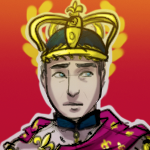|
Crowsbeak posted:A We will return the Patriarch to Alexandria. With a strong King the world will know Gondar has strength even in these days of tribulation. Plus it allows LOTR jokes to be made. Little late boss Rody One Half fucked around with this message at 01:10 on Sep 23, 2015 |
|
|
|

|
| # ? Apr 24, 2024 23:17 |
|
Rodyle posted:Little late bosd Nah, it was my bad. I didn't remove the voting link in the OP until this morning.
|
|
|
|
Update 13 - The Pirate Lords The Caravan waits in the distance. After some time, the younger man returns. He starts walking back towards the shore. Unsure of what to do next, the rest of the Caravan follows. The silent march to the beach is draining. Without Mme de Beaumont, they are lost, drifting through the land of the living. By nightfall, they make it to the shore. In silence, the Caravan members split up in search of firewood, and soon, a bonfire is lit. In a large circle they sit, staring into the fire, unsure of what to do next. Eventually, one of them stands up. He in an older man, of dark complexion, with a mischevious twinkle in his eye. He is dressed as a merchant, trying to sell you a carpet with a hole in it as "Damascan-styled".  : This simply will not do! We have been moaning and whining for far too long! I say it is time for a story! : This simply will not do! We have been moaning and whining for far too long! I say it is time for a story!He digs through his bag, smelling of saffron and cinnamon, until he finds what he's looking for: a dusty tome, wrapped in leather, and bound with gold.  : But this will not be a dreary tale of the decadence of Francia, or a ghastly description of the many sins of the Zunbils, no! : But this will not be a dreary tale of the decadence of Francia, or a ghastly description of the many sins of the Zunbils, no! : This will be a tale of adventure, a tale of treachery. A tale of pirates! : This will be a tale of adventure, a tale of treachery. A tale of pirates!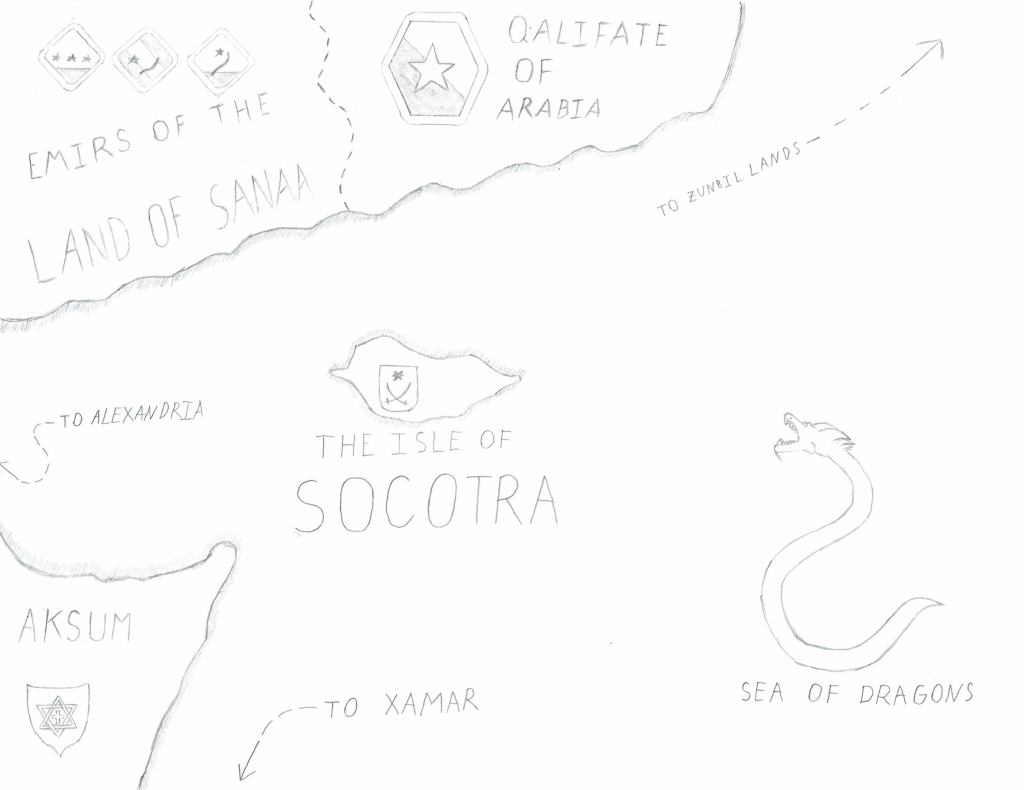  : Let me tell you of the isle of Socotra, so named for a bird in the local tongue. : Let me tell you of the isle of Socotra, so named for a bird in the local tongue. : My father was born on the isle itself, all those years ago. He sailed under the old Emir, as one of his many sailors. The Emir was a just and fair ruler, as his father before him, and his father before that. : My father was born on the isle itself, all those years ago. He sailed under the old Emir, as one of his many sailors. The Emir was a just and fair ruler, as his father before him, and his father before that. : The Emir was a rich man. How could he not be? Socotra was at a crossroads. Any man wishing to sail to Mekka, or up to Sinai, whould make a stop at the isle. Abyssinians trying to make it to the Zunbil lands, or Xamarans sailing to Baluchistan, all dropped anchor at the Tamrida port. The market in the city was a sight to behold: you could walk it to and fro, and not hear the same tongue spoken twice. : The Emir was a rich man. How could he not be? Socotra was at a crossroads. Any man wishing to sail to Mekka, or up to Sinai, whould make a stop at the isle. Abyssinians trying to make it to the Zunbil lands, or Xamarans sailing to Baluchistan, all dropped anchor at the Tamrida port. The market in the city was a sight to behold: you could walk it to and fro, and not hear the same tongue spoken twice.  : But the Emir had a problem: the trade on the island made his neighbours jealous. All wanted to control the crossroads of the sea. He quarreled with his many neighbours: the Dukes of Aksum, the Sanaa Emirs to the north; even the great Arab Qalifs set their eyes on the isle. And so, the Emir had hired the sea dogs. : But the Emir had a problem: the trade on the island made his neighbours jealous. All wanted to control the crossroads of the sea. He quarreled with his many neighbours: the Dukes of Aksum, the Sanaa Emirs to the north; even the great Arab Qalifs set their eyes on the isle. And so, the Emir had hired the sea dogs. : Treacherous to a man, but with many ships, and many more swords, the pirate lords took the Emir's coin and vanquished his foes. They taught sailing to the Emir's soldiers, and showed him what it's like to truly rule the seas. : Treacherous to a man, but with many ships, and many more swords, the pirate lords took the Emir's coin and vanquished his foes. They taught sailing to the Emir's soldiers, and showed him what it's like to truly rule the seas. : My father had sailed to the Indus then, to try his hand at trade with the Zunbils. He'd met my mother there, and stayed. : My father had sailed to the Indus then, to try his hand at trade with the Zunbils. He'd met my mother there, and stayed. : Yet, with the Emir's wars over, the pirate lords didn't leave. : Yet, with the Emir's wars over, the pirate lords didn't leave.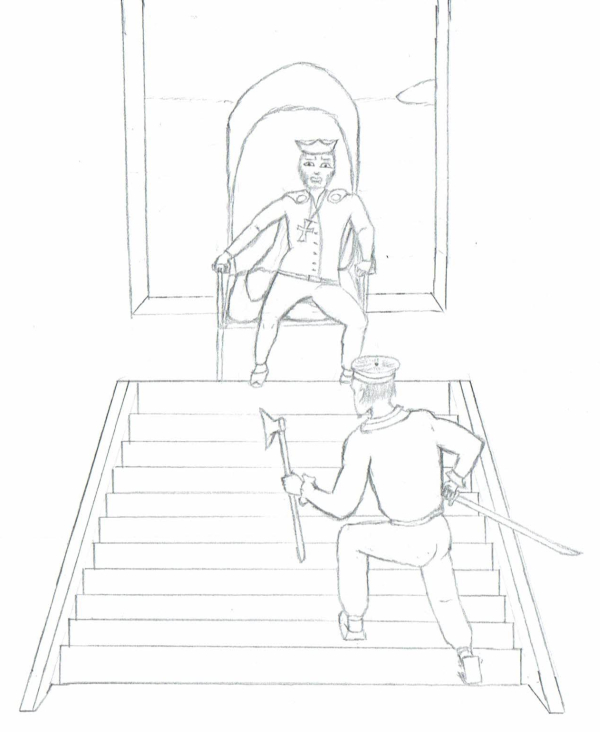  : Instead, the five great pirate lords left their ships, and demanded an audience with the rightful ruler of Socotra. : Instead, the five great pirate lords left their ships, and demanded an audience with the rightful ruler of Socotra. : The Emir, surprised at the their request, welcomed them as he would his own sons. The pirates took no notice of his hospitality, and drew their swords at his court. : The Emir, surprised at the their request, welcomed them as he would his own sons. The pirates took no notice of his hospitality, and drew their swords at his court. : His own guards fought the invaders, but the scum's strength knew no bounds. All were slain. At last, they approached the Emir. They named him a poor man, not worthy of ransom, and threw him off the castle walls. : His own guards fought the invaders, but the scum's strength knew no bounds. All were slain. At last, they approached the Emir. They named him a poor man, not worthy of ransom, and threw him off the castle walls.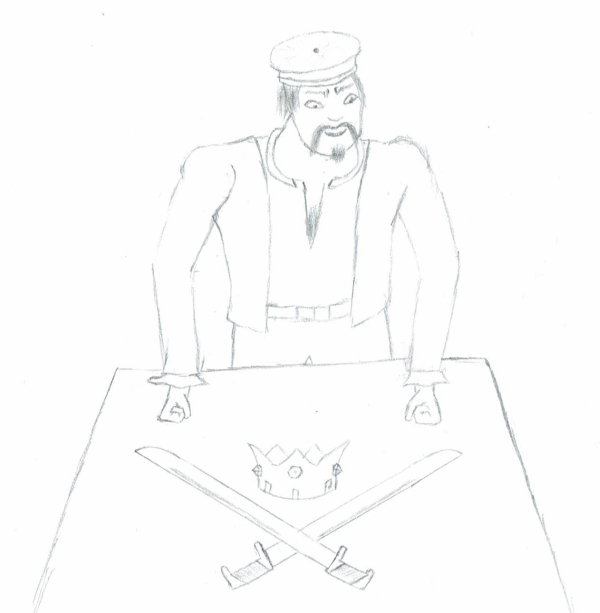  : The scum had planned to loot and leave, when one of the pirate lords called them all into the Emir's study. They saw maps of the island, of the nearby lands. Ledgers of tax revenues from the city, and the treasury contents. : The scum had planned to loot and leave, when one of the pirate lords called them all into the Emir's study. They saw maps of the island, of the nearby lands. Ledgers of tax revenues from the city, and the treasury contents. : And the pirate lords had decided to stay, to rule Socotra as their own. They saw no need in Emirs and Sultans, and proclaimed a republic. They would choose one amongst them to lead them all. : And the pirate lords had decided to stay, to rule Socotra as their own. They saw no need in Emirs and Sultans, and proclaimed a republic. They would choose one amongst them to lead them all.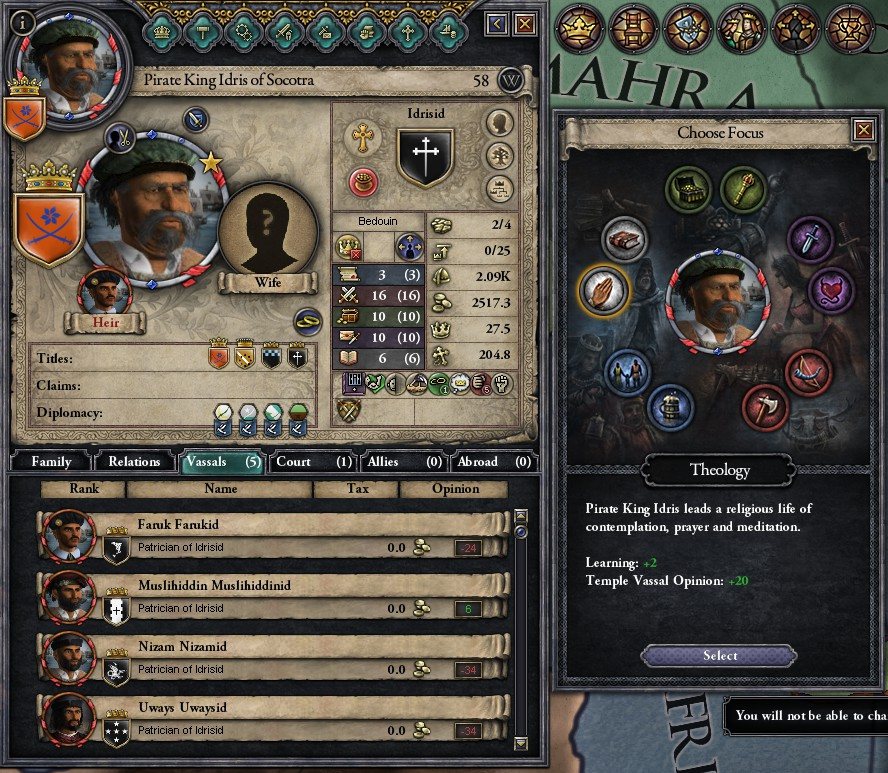  : The man that led the assault on the Emir's fortress, the one that threw him off the wall was Idris. A dangerous man, a terror of the seas, he barked as he spoke, leaving the listener's ears bleeding. The pirate lords chose him as their new leader, the Pirate King of Socotra. : The man that led the assault on the Emir's fortress, the one that threw him off the wall was Idris. A dangerous man, a terror of the seas, he barked as he spoke, leaving the listener's ears bleeding. The pirate lords chose him as their new leader, the Pirate King of Socotra.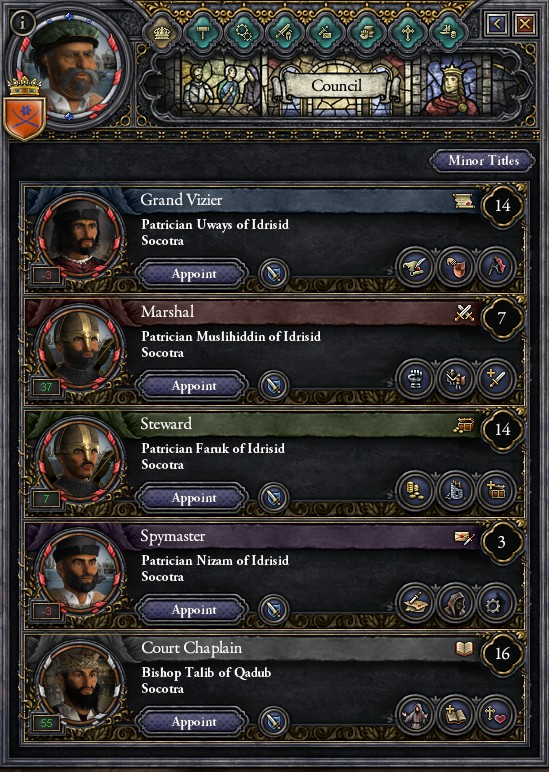  : A dreadful man, he was surrounded by his four closest advisors, the other pirate lords: Uways, who had sold his own brother for a ship; Muslihiddin, who boasted over a hundred men slain by his own hand; Faruk, who had stolen from the Caliph and the Zunbil Shahs; and Nizam, whose poisons killed more Abyssinians than the sands of the Sahara. Only the men of their five families could hold the pirate throne. : A dreadful man, he was surrounded by his four closest advisors, the other pirate lords: Uways, who had sold his own brother for a ship; Muslihiddin, who boasted over a hundred men slain by his own hand; Faruk, who had stolen from the Caliph and the Zunbil Shahs; and Nizam, whose poisons killed more Abyssinians than the sands of the Sahara. Only the men of their five families could hold the pirate throne.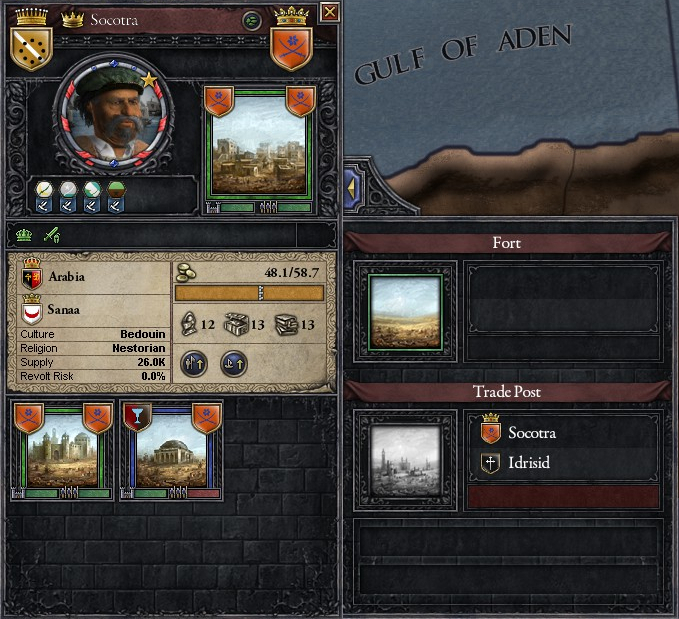  : Like the rest of the scum, Idris was a Nestorian, so called because they built nests from whence their ships flew. He had established such a nest in Socotra itself, as well as two more in the Caliph's lands. From these nests, ships flew day and night, carrying the treasures of far-away lands to the isle. : Like the rest of the scum, Idris was a Nestorian, so called because they built nests from whence their ships flew. He had established such a nest in Socotra itself, as well as two more in the Caliph's lands. From these nests, ships flew day and night, carrying the treasures of far-away lands to the isle.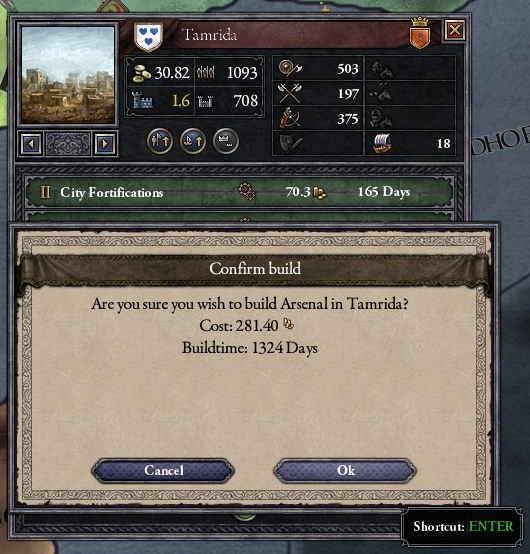  : Displeased with how easily the Emir's lands were occupied earlier in the war, Idris ordered a large arsenal of weapons to be built, to house weapons for the city's levies. He did not wish to repeat the mistakes of the rightful ruler of the isle. : Displeased with how easily the Emir's lands were occupied earlier in the war, Idris ordered a large arsenal of weapons to be built, to house weapons for the city's levies. He did not wish to repeat the mistakes of the rightful ruler of the isle.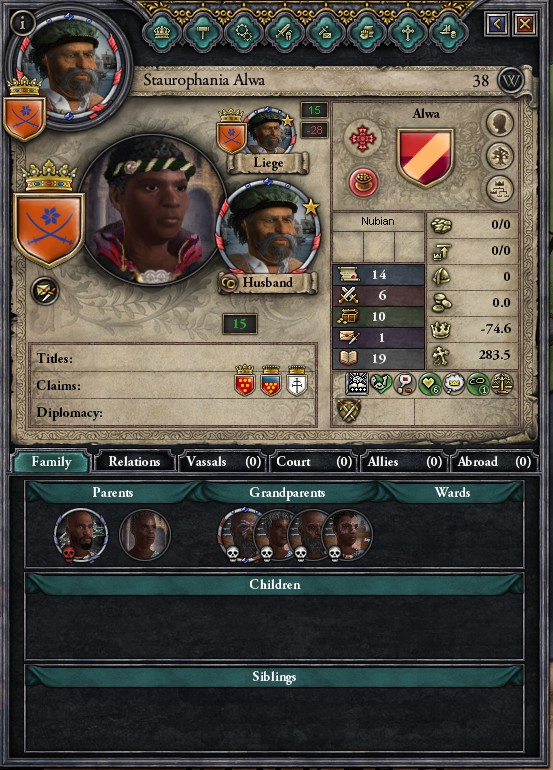  : Some say that his wife stepped from the surf onto land for the first time on their wedding day. A sea spirit they called her, one that drags men to their doom under the water. : Some say that his wife stepped from the surf onto land for the first time on their wedding day. A sea spirit they called her, one that drags men to their doom under the water.A large man interrupts the story. He is taller than the speaker by two heads, and wears his beard and hair in elaborate braids.  : Lorelei. : Lorelei.  : Pardon me, kind sir? : Pardon me, kind sir? : They're called Lorelei. : They're called Lorelei. : Ah yes, thank you so much for refreshing my memory. And who might you be, sir? : Ah yes, thank you so much for refreshing my memory. And who might you be, sir? : Ulfr. From Perm. : Ulfr. From Perm. : Many thanks, kind Ulfr. You may call me Amir. Have you seen these Lorelei in your travels? : Many thanks, kind Ulfr. You may call me Amir. Have you seen these Lorelei in your travels? : Yes. Travelled plenty. : Yes. Travelled plenty. : Marvellous! Another sea-farer! Shall I continue with my tale, with your permission? : Marvellous! Another sea-farer! Shall I continue with my tale, with your permission? : Yes. : Yes.  : Thank you. Having married the dreadful Lorelei, Idris had summoned men from the island to build his family a great mansion. He had dozens of the men sacrifized to the nester gods, their blood poured into the foundation. He had enjoyed hearing their spirits scream in the night. Said it helped him sleep. : Thank you. Having married the dreadful Lorelei, Idris had summoned men from the island to build his family a great mansion. He had dozens of the men sacrifized to the nester gods, their blood poured into the foundation. He had enjoyed hearing their spirits scream in the night. Said it helped him sleep.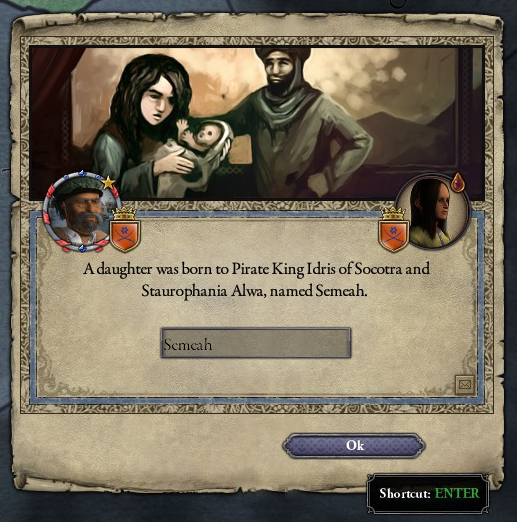  : His first child was a girl. Some say she had her mother's scaled skin at birth. : His first child was a girl. Some say she had her mother's scaled skin at birth.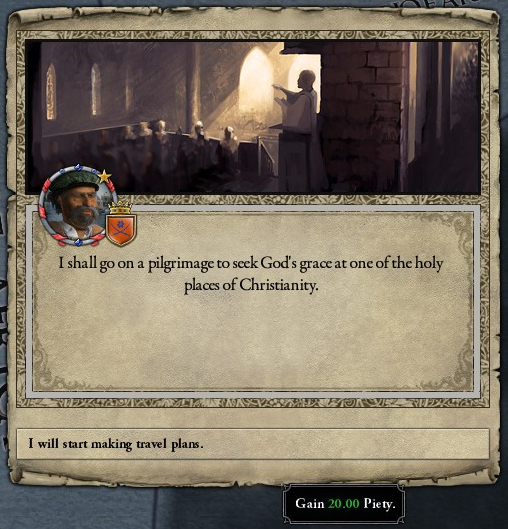  : Fearing that the girl was a threat from the nester gods, he had a ship readied, and went to take the city of Antioch by siege to appease them. : Fearing that the girl was a threat from the nester gods, he had a ship readied, and went to take the city of Antioch by siege to appease them. : Antioch? : Antioch? : Yes, a city holy to the nesters, far to the north. : Yes, a city holy to the nesters, far to the north.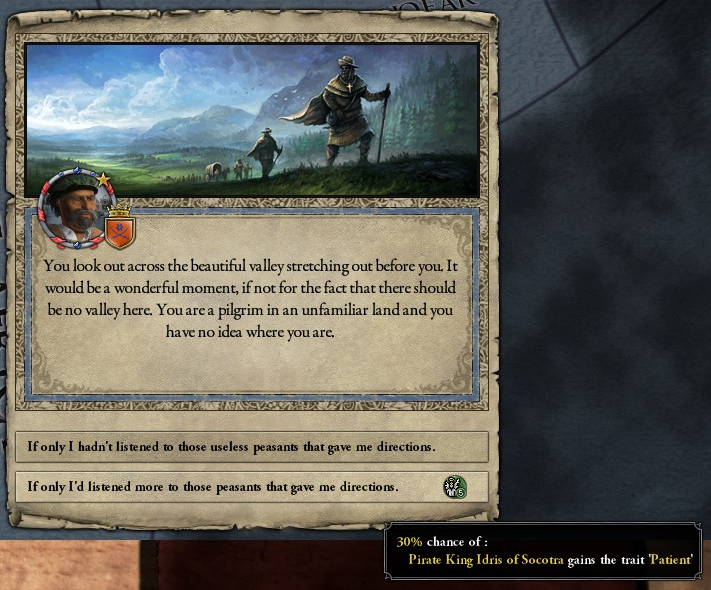  : On his path, he had slain many peasants, who had done nothing to offend him. His gods demanded sacrifice. : On his path, he had slain many peasants, who had done nothing to offend him. His gods demanded sacrifice.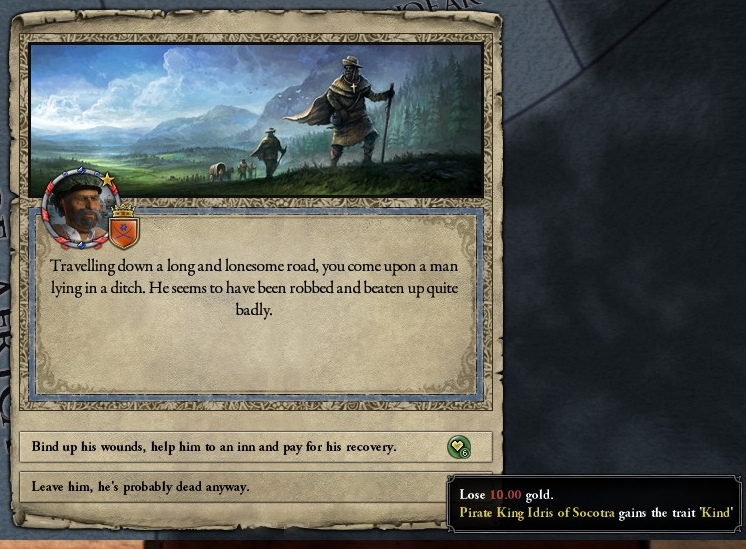  : So great was the evil in his heart, that weaker men would die upon simply seeing his visage! : So great was the evil in his heart, that weaker men would die upon simply seeing his visage!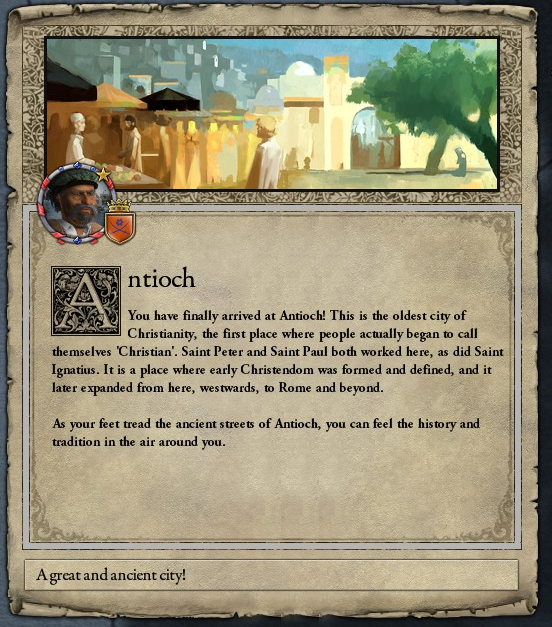  : He had reached the city at dawn, and by dusk the ground was painted red with the blood he drew. : He had reached the city at dawn, and by dusk the ground was painted red with the blood he drew.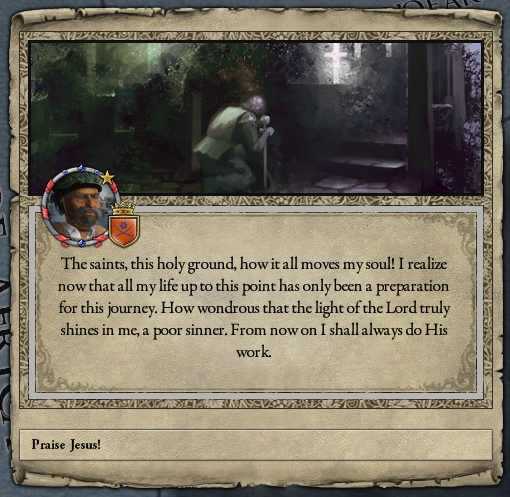  : Man, woman and child were slain by his sword, and by his brigands'. : Man, woman and child were slain by his sword, and by his brigands'.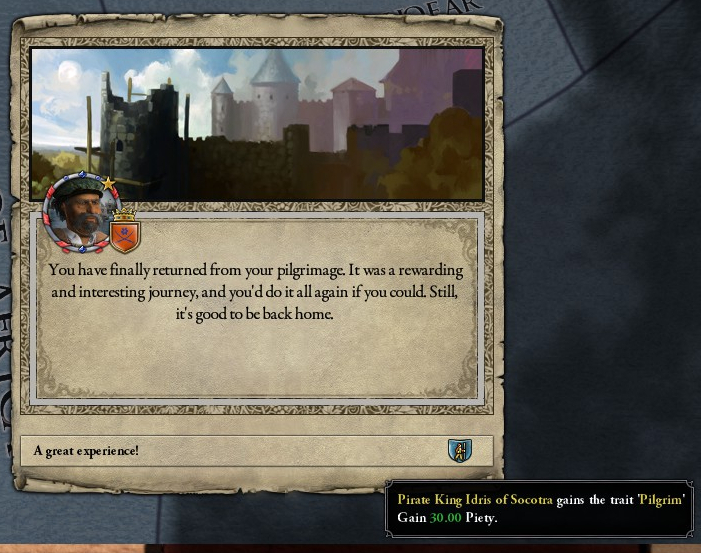  : He had returned later that year. He had not washed himself of the blood on his entire journey, for that was part of the nester's rituals. : He had returned later that year. He had not washed himself of the blood on his entire journey, for that was part of the nester's rituals.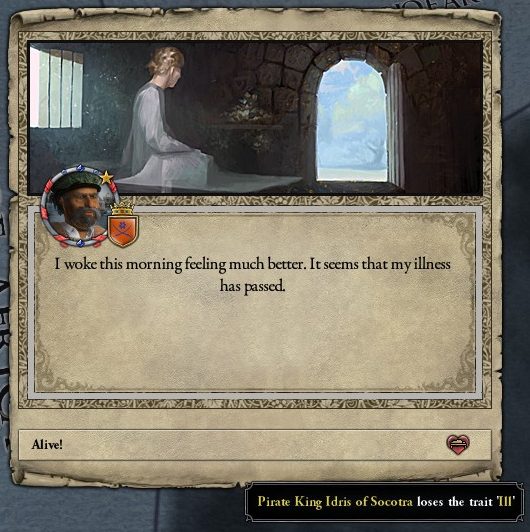  : And the nester gods were pleased! The illness that plagued him on his trip had settled. : And the nester gods were pleased! The illness that plagued him on his trip had settled.  : And the curse was lifted, for the Lorelei gave him a son. Strong as an ox, a true son of The Darkness. : And the curse was lifted, for the Lorelei gave him a son. Strong as an ox, a true son of The Darkness.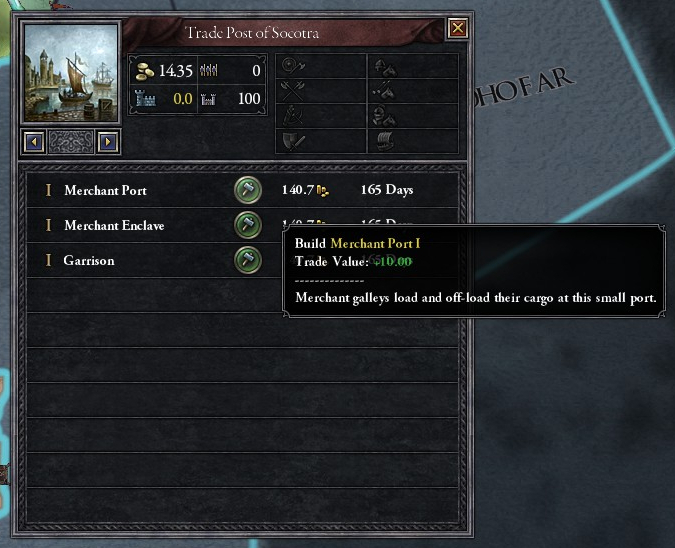  : In celebration, he expanded his nests, both in Socotra, and the Caliph's territories. More ships would bring spices and silks and gold from abroad. : In celebration, he expanded his nests, both in Socotra, and the Caliph's territories. More ships would bring spices and silks and gold from abroad.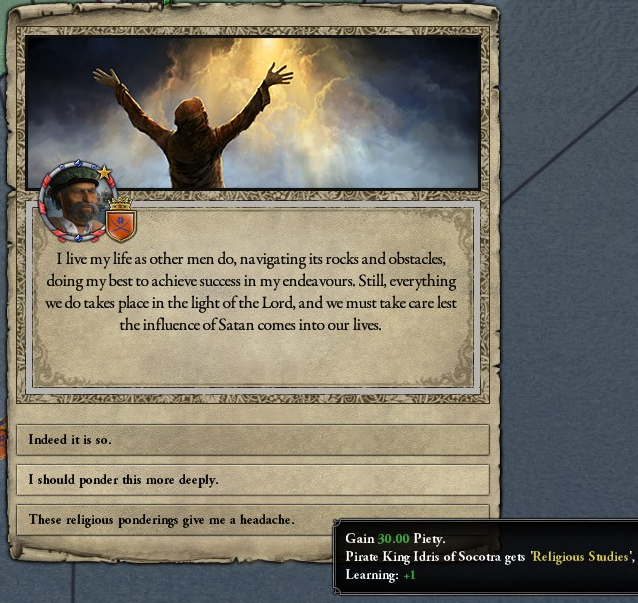  : He had decided to spend the rest of his life in the service of the nester gods, giving them homage in return for the birth of his son. : He had decided to spend the rest of his life in the service of the nester gods, giving them homage in return for the birth of his son.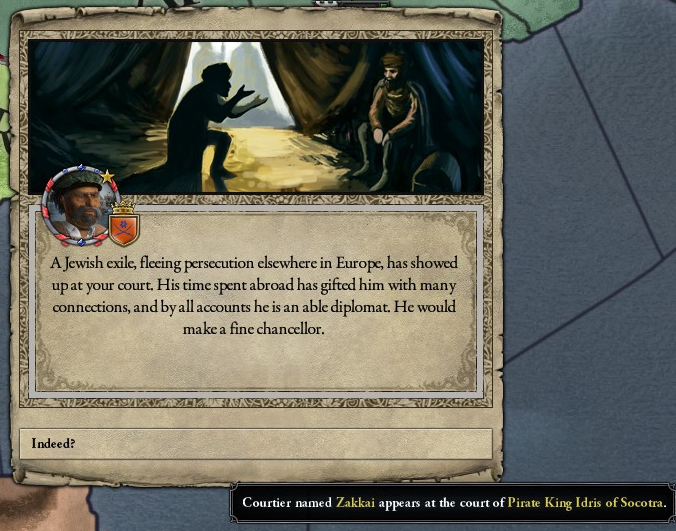  : Because of the Pirate King's fearful reputation, he had attracted brigands from far and wide to his court. : Because of the Pirate King's fearful reputation, he had attracted brigands from far and wide to his court.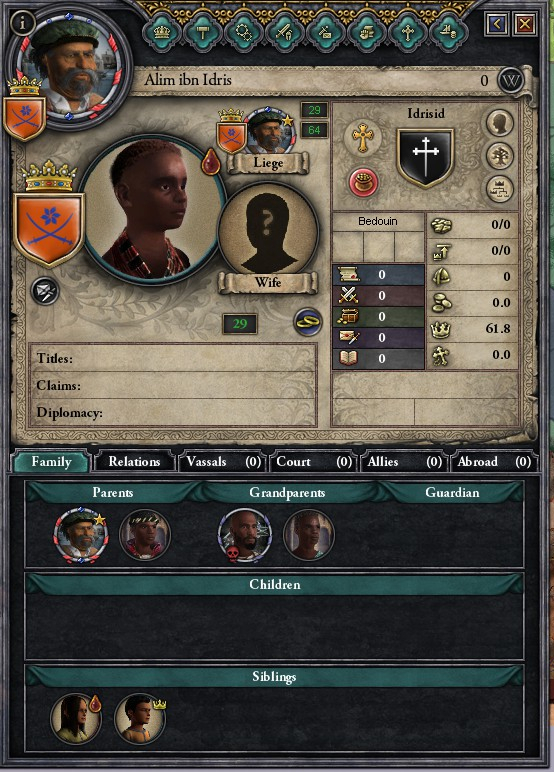  : His blessings continued. More sons for the army of The Darkness. : His blessings continued. More sons for the army of The Darkness.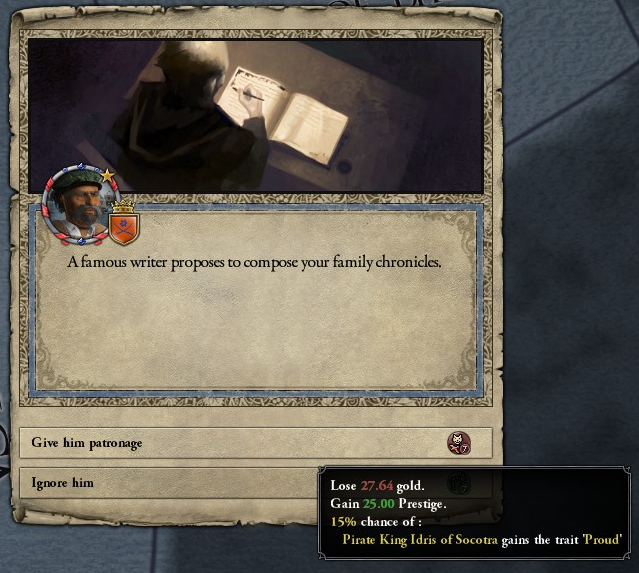  : So boastful was Idris of his own name, and so vain, that he had captured a great Arab writer, and forced him to write a great tome of his exploits. Under the pain of death, the scribe toiled in the Tamrida dungeons, pushing out page after page, until he was spent. The Pirate King then had him thrown off the castle walls, so that none else would take part in the writer's craft. : So boastful was Idris of his own name, and so vain, that he had captured a great Arab writer, and forced him to write a great tome of his exploits. Under the pain of death, the scribe toiled in the Tamrida dungeons, pushing out page after page, until he was spent. The Pirate King then had him thrown off the castle walls, so that none else would take part in the writer's craft.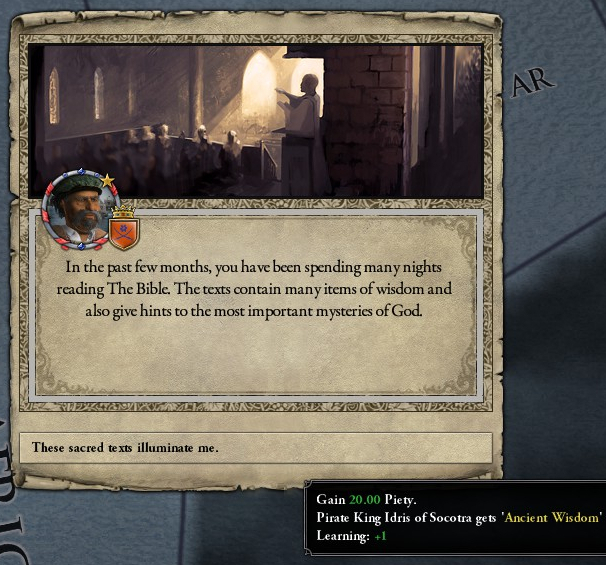  : He had proclaimed that this sacrifice pleased the nestor gods, and they would bestow their blessing on the isle. : He had proclaimed that this sacrifice pleased the nestor gods, and they would bestow their blessing on the isle.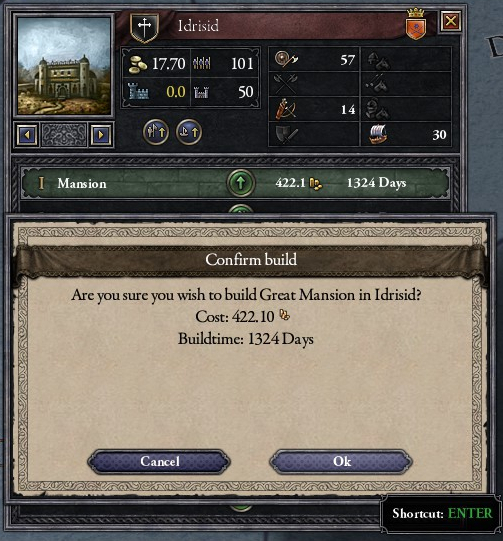  : To celebrate, he had the Idrisid manor enlarged. Three towers, rivaling the castle in size, one for each of his sons, and the greatest, of course, for him. On approach to the isle, the three towers stood on the tallest hill, piercing the heavens. : To celebrate, he had the Idrisid manor enlarged. Three towers, rivaling the castle in size, one for each of his sons, and the greatest, of course, for him. On approach to the isle, the three towers stood on the tallest hill, piercing the heavens.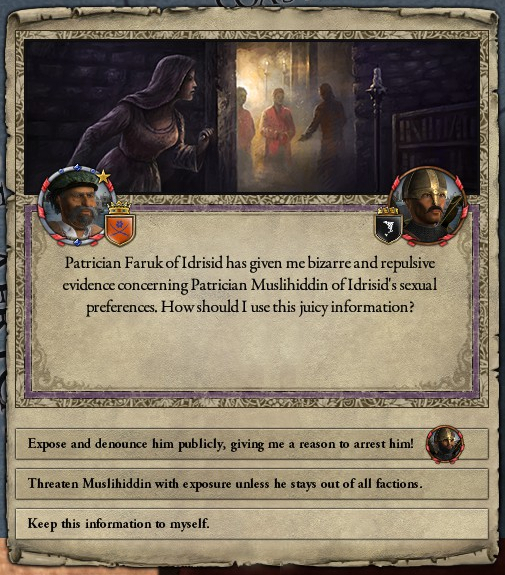  : But not all was right among the pirate lords. Muslihiddin, the slayer, and Faruk, the thief, had quarreled over a pirate feast. Faruk, slighted by Muslihiddin for refusing him entry, had whispered words of Muslihiddin's taste for camels to the Pirate King. Idris had laughed at Faruk's vivid descriptions of the camel's role in his harem, naming it the greatest tale he had ever heard. : But not all was right among the pirate lords. Muslihiddin, the slayer, and Faruk, the thief, had quarreled over a pirate feast. Faruk, slighted by Muslihiddin for refusing him entry, had whispered words of Muslihiddin's taste for camels to the Pirate King. Idris had laughed at Faruk's vivid descriptions of the camel's role in his harem, naming it the greatest tale he had ever heard.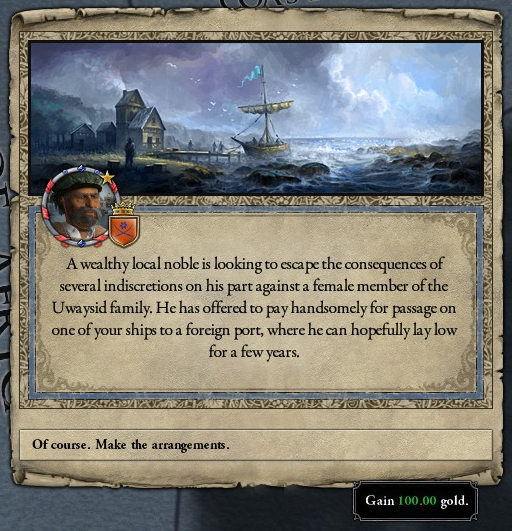  : Meanwhile, Uways had scoured Socotra for the man that had soured his sister. The man came to the Pirate King in the night, with plenty of coin for his escape. Idris obliged him, of course. The money was good. : Meanwhile, Uways had scoured Socotra for the man that had soured his sister. The man came to the Pirate King in the night, with plenty of coin for his escape. Idris obliged him, of course. The money was good.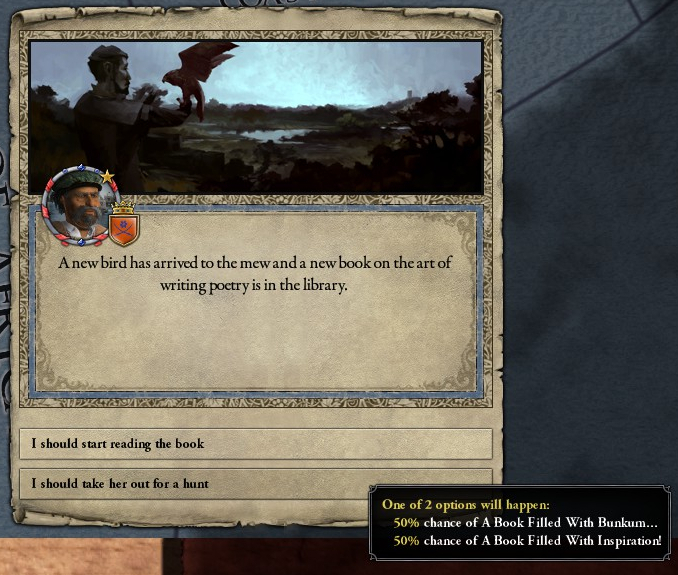  : It was then that the Pirate King had taken up poetry. He wrote verse upon verse about the greatness of his family, and the pirate lords. : It was then that the Pirate King had taken up poetry. He wrote verse upon verse about the greatness of his family, and the pirate lords.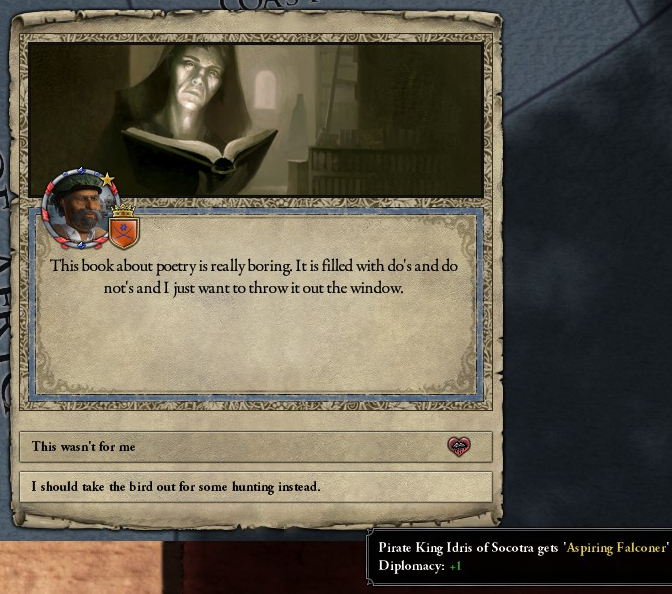  : I had come across a scroll of his work in my travels. It cost me three crates of saffron, but it was worth it. I have never seen worse poetry in my life. It is glorious. : I had come across a scroll of his work in my travels. It cost me three crates of saffron, but it was worth it. I have never seen worse poetry in my life. It is glorious.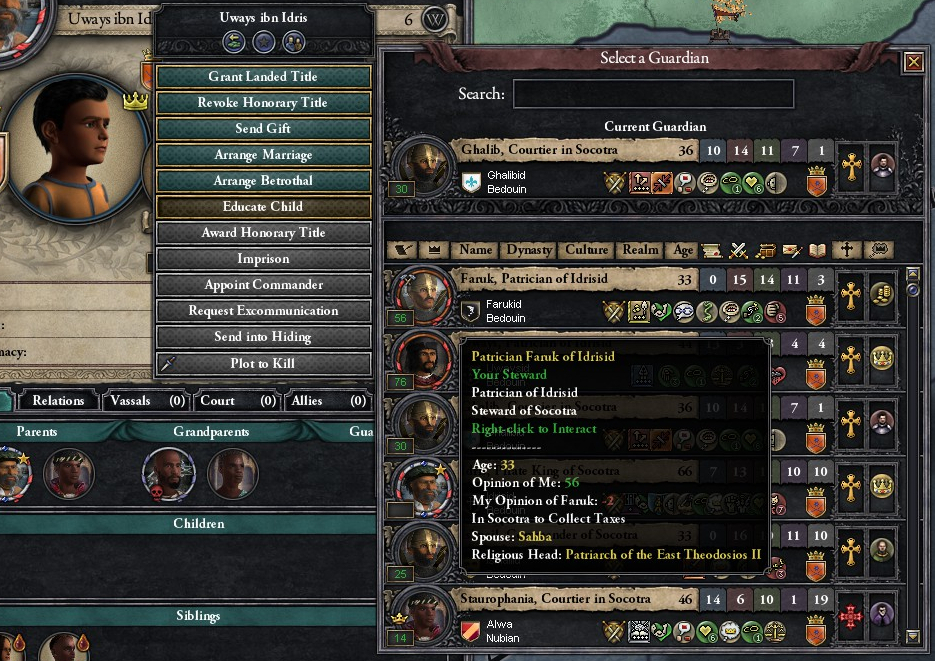  : The young Uways ibn Idris was sent on Faruk's ship to travel the seas and learn the pirate trade. The boy learned quickly. In time, he would dwarf his father in rulership, and in cruelty. : The young Uways ibn Idris was sent on Faruk's ship to travel the seas and learn the pirate trade. The boy learned quickly. In time, he would dwarf his father in rulership, and in cruelty.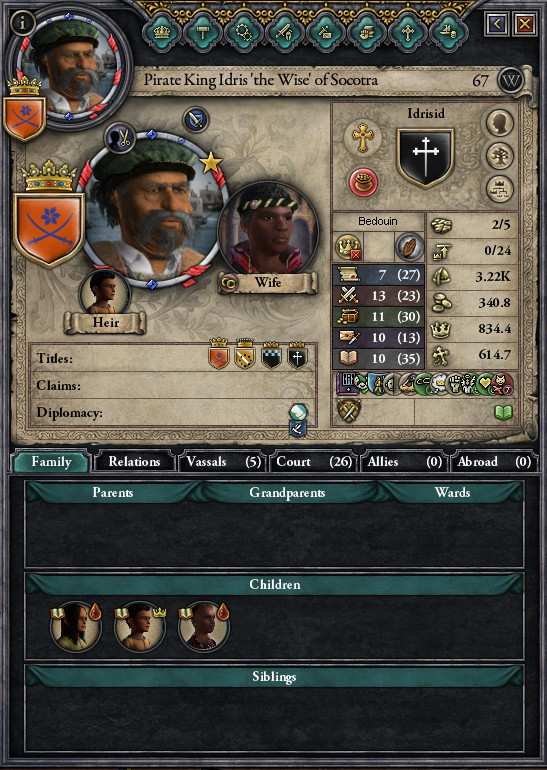  : For his cruelty, many had called Idris "the Cruel". Many, but not all. : For his cruelty, many had called Idris "the Cruel". Many, but not all.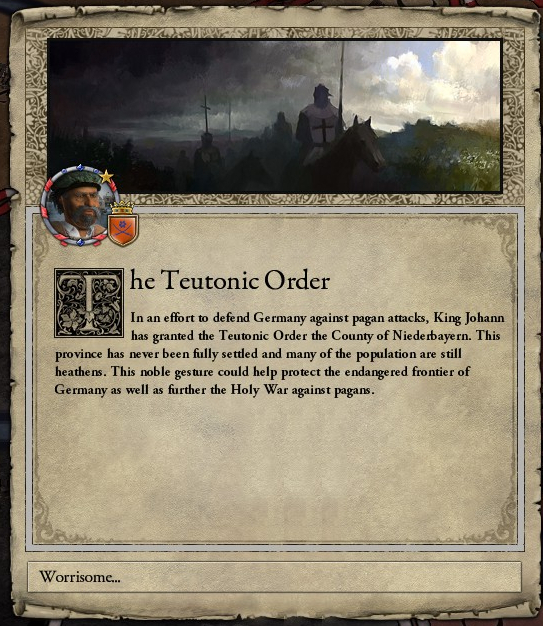  : I was eight when I took the first trade voyage with my father. The seas were not safe because of the dreaded pirates, and so we took the Zunbil roads to the western-most parts of the Empire of the Sun. : I was eight when I took the first trade voyage with my father. The seas were not safe because of the dreaded pirates, and so we took the Zunbil roads to the western-most parts of the Empire of the Sun. : We had travelled for months, through rivers, mountains, deserts and plains. We had sailed on the Indus, and crossed the Kush. Finally, we had come to Damascus, another great city of the crossroads. We had met western Christians, these Katharoi, who spoke of victory against the Pagans in Bavayriah. They said that the King of the Djermans, a powerful western tribe, had granted the border lands to the Tewtans, a great order of armoured camel knights. They would defend Christendom from the Pagan raids. : We had travelled for months, through rivers, mountains, deserts and plains. We had sailed on the Indus, and crossed the Kush. Finally, we had come to Damascus, another great city of the crossroads. We had met western Christians, these Katharoi, who spoke of victory against the Pagans in Bavayriah. They said that the King of the Djermans, a powerful western tribe, had granted the border lands to the Tewtans, a great order of armoured camel knights. They would defend Christendom from the Pagan raids.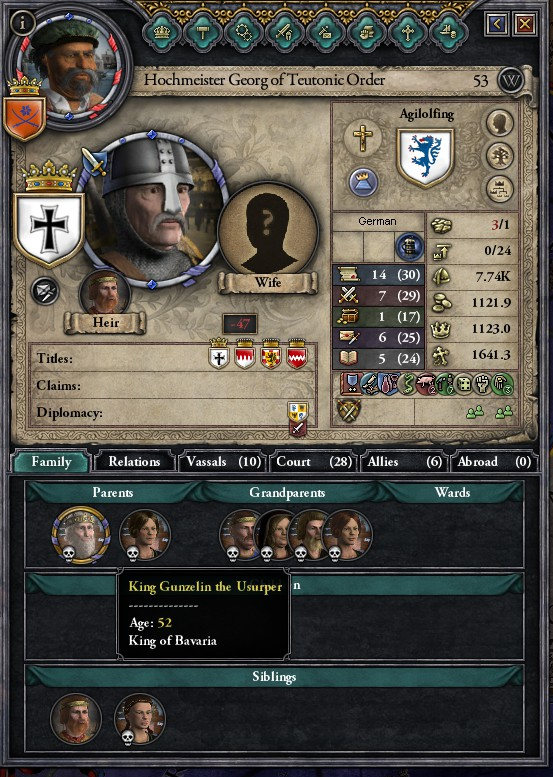  : The Tewtan king himself was a son of the Bavayrian king, but had embraced the Katharoi faith, and made war on his father with the Djermans. Strange tales abound. : The Tewtan king himself was a son of the Bavayrian king, but had embraced the Katharoi faith, and made war on his father with the Djermans. Strange tales abound.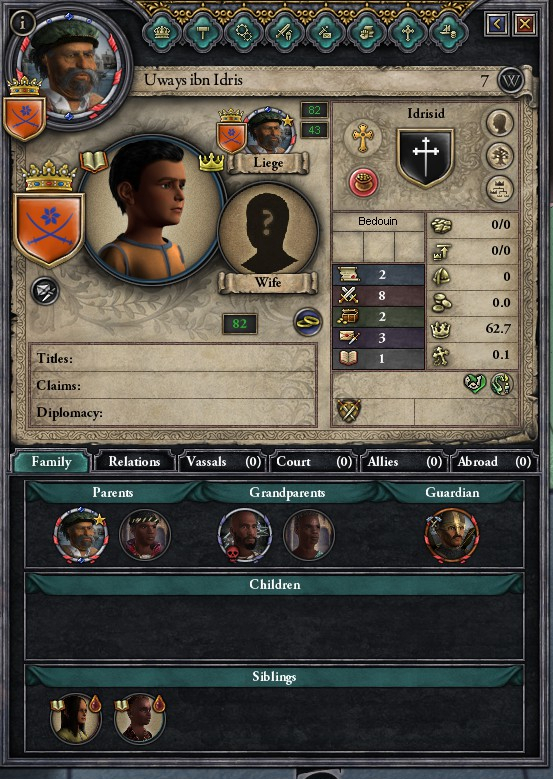  : We had stayed in Damascus for a few years, trading saffron and cinnamon from the Hindus near the eastern provinces for some time, as the Socotrans held their grasp on the seas. : We had stayed in Damascus for a few years, trading saffron and cinnamon from the Hindus near the eastern provinces for some time, as the Socotrans held their grasp on the seas.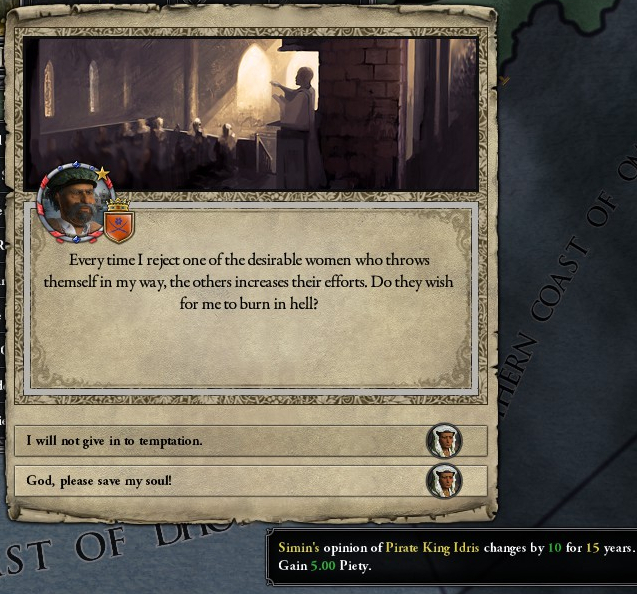  : We had seen travelers from the land of Sanaa, who brought us news from the isle. They told us of Idris' love of women, and his Lorelei's scorn. : We had seen travelers from the land of Sanaa, who brought us news from the isle. They told us of Idris' love of women, and his Lorelei's scorn.  : They had told us that the Idris palace put the Qalif's to shame. Which did not mean much to me: after all, the Qailif moved his capital every ten years as he lost more and more territories to the Zunbil onslaught. : They had told us that the Idris palace put the Qalif's to shame. Which did not mean much to me: after all, the Qailif moved his capital every ten years as he lost more and more territories to the Zunbil onslaught.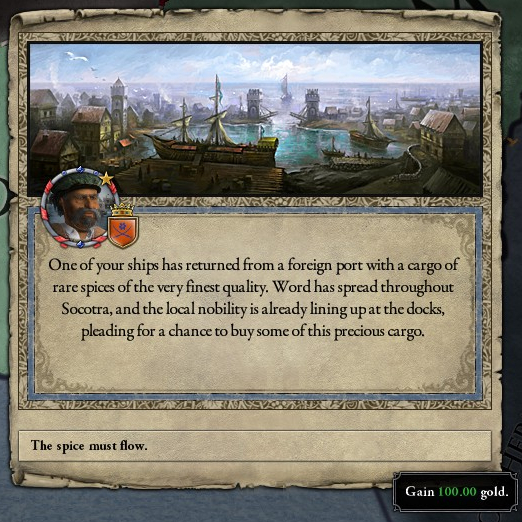  : They told us that the pirate ships bring news and trade as far as the Indus now, trading in cinnamon. The Socotrans added it to camel milk and called it a delicacy. : They told us that the pirate ships bring news and trade as far as the Indus now, trading in cinnamon. The Socotrans added it to camel milk and called it a delicacy.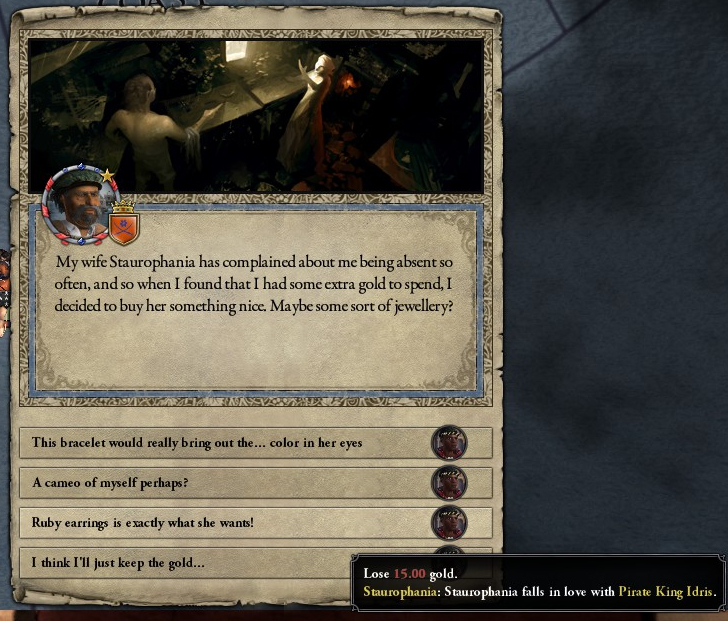  : Idris had gotten so rich that he bought his sea-wife all the jewels in Sanaa. And she forgave him his other women for it. : Idris had gotten so rich that he bought his sea-wife all the jewels in Sanaa. And she forgave him his other women for it.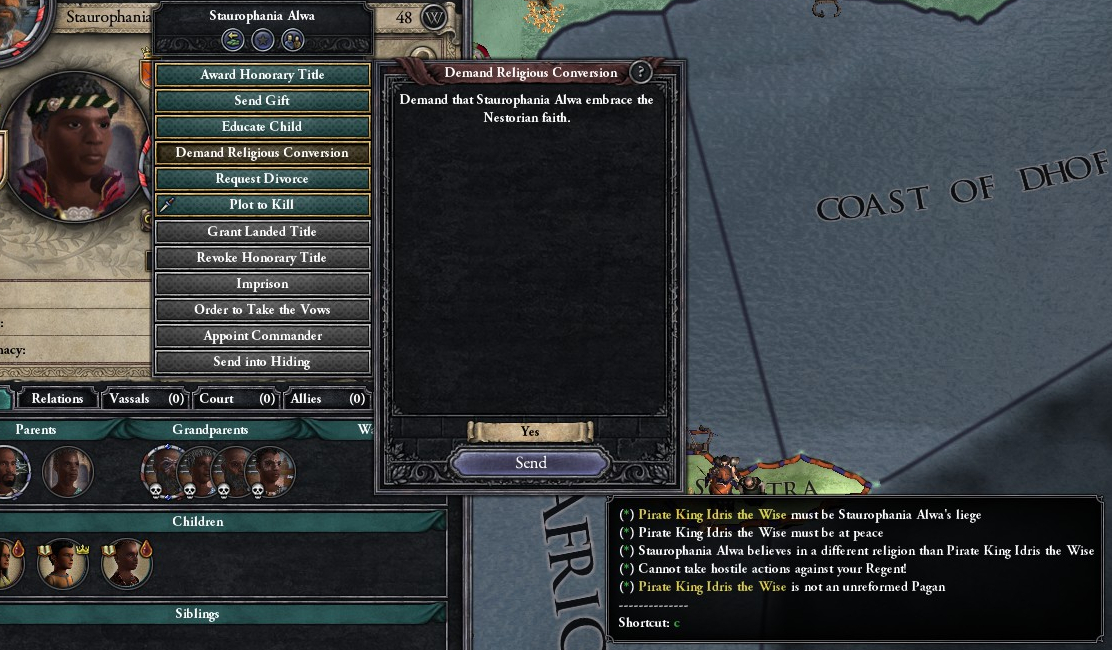  : He promised to love her for all time, if she no longer dragged men to their doom, and embraced the nester gods. She would be baptized in the sea itself. : He promised to love her for all time, if she no longer dragged men to their doom, and embraced the nester gods. She would be baptized in the sea itself.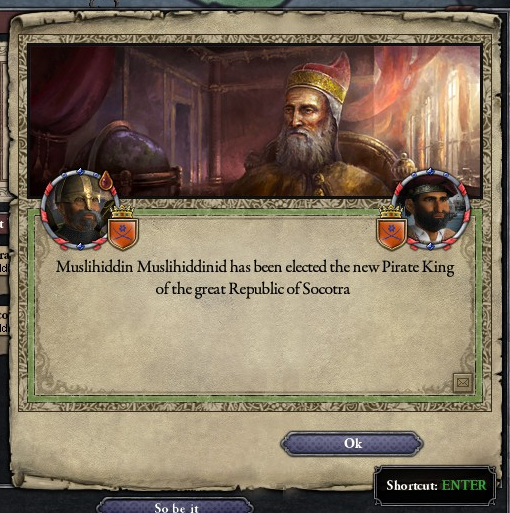  : She agreed. And yet, as he lowered her into the sea, she heard the call of her home. The witch had returned to her true form, and, holding her lover close to her, dove into the depths. She swam to the great sea, to show her husband to the dragons and sharks, and to the court of the lorelei. : She agreed. And yet, as he lowered her into the sea, she heard the call of her home. The witch had returned to her true form, and, holding her lover close to her, dove into the depths. She swam to the great sea, to show her husband to the dragons and sharks, and to the court of the lorelei. : But no man could keep his breath for so long, not even the king of pirates. He perished, and serves The Darkness even in death. : But no man could keep his breath for so long, not even the king of pirates. He perished, and serves The Darkness even in death. : The Pirate Council had reconvened. It was time to elect a new Pirate King. Each man brought his greatest treasure, his greatest take, before the others. Muslihiddin had brought the head of the Samirid Qalif, with his crown still attached to it. : The Pirate Council had reconvened. It was time to elect a new Pirate King. Each man brought his greatest treasure, his greatest take, before the others. Muslihiddin had brought the head of the Samirid Qalif, with his crown still attached to it. : The Qalif, it seems, had decided to take a ship to Baluchistan to talk about joining forces against the Empire of the Sun. Since the pirates claimed the sea as their dominion, the Qalif was found to be trespassing, and killed for his trouble. : The Qalif, it seems, had decided to take a ship to Baluchistan to talk about joining forces against the Empire of the Sun. Since the pirates claimed the sea as their dominion, the Qalif was found to be trespassing, and killed for his trouble. : None could match Muslihiddin's treasure, and they named him the new Pirate King. : None could match Muslihiddin's treasure, and they named him the new Pirate King.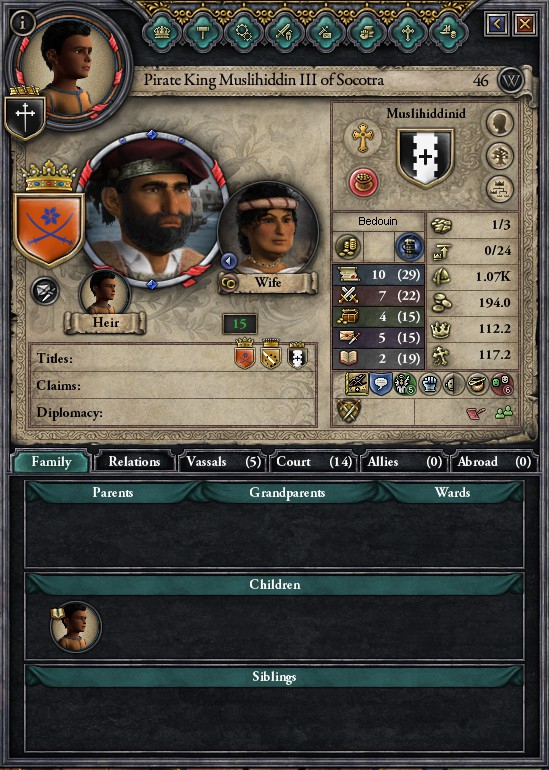  : Muslihiddin, commonly known as "the Camel-Fucker" took the pirate throne, preparing to expand his trading empire. : Muslihiddin, commonly known as "the Camel-Fucker" took the pirate throne, preparing to expand his trading empire.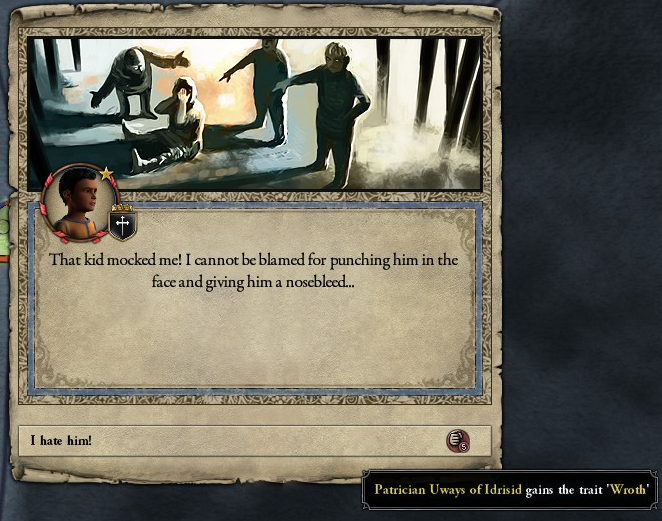  : Meanwhile, Idris' son, Uways, had grown murderous by the age of 9, pushing another boy off a cliff for daring to insult him. : Meanwhile, Idris' son, Uways, had grown murderous by the age of 9, pushing another boy off a cliff for daring to insult him.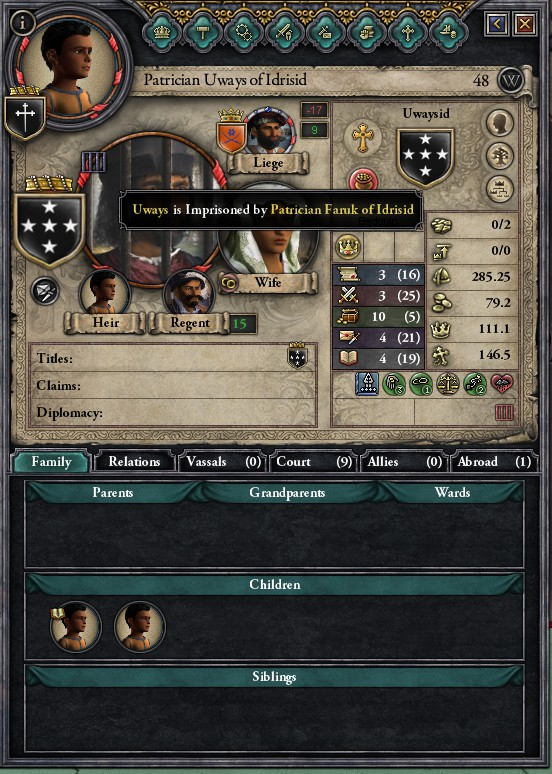  : We had finished our business in Damascus, and started off home. A Sanaan man travelled with us for a week or two, telling us stories of the pirate wars. It seems Uways the slaver had gotten into a quarrel with Faruk the thief, and was held in a prison ship of his, traversing the seas. : We had finished our business in Damascus, and started off home. A Sanaan man travelled with us for a week or two, telling us stories of the pirate wars. It seems Uways the slaver had gotten into a quarrel with Faruk the thief, and was held in a prison ship of his, traversing the seas.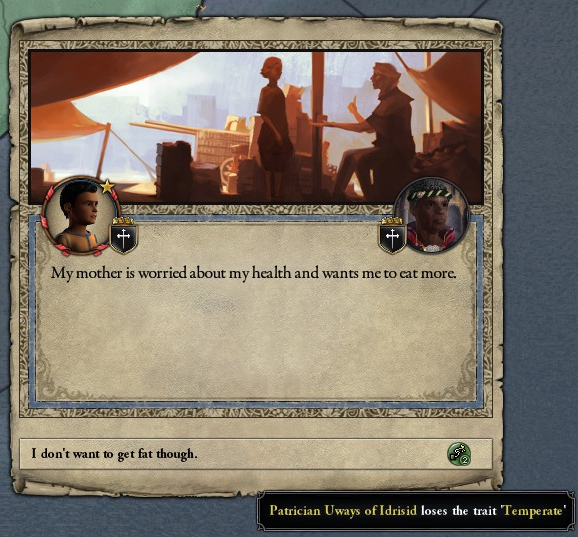  : I have also heard that the murderous Uways ibn Idris had grown fat and grotesque, sometimes swallowing chickens whole for his breakfast. : I have also heard that the murderous Uways ibn Idris had grown fat and grotesque, sometimes swallowing chickens whole for his breakfast.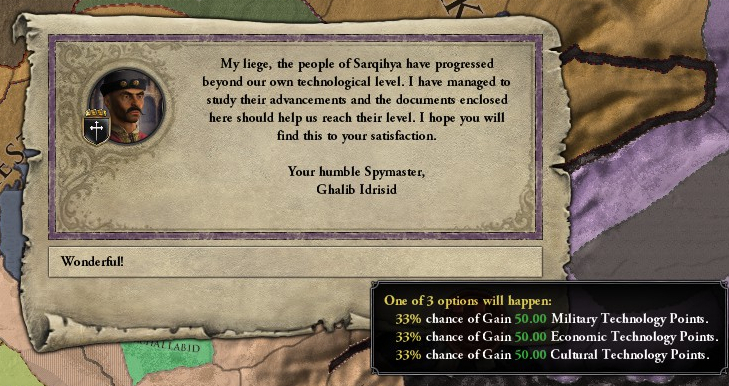  : The many spies of the pirates have spread throughout the Muslim holy land, as well as Eedjipt, and had sent back secrets and knowledge of men. : The many spies of the pirates have spread throughout the Muslim holy land, as well as Eedjipt, and had sent back secrets and knowledge of men.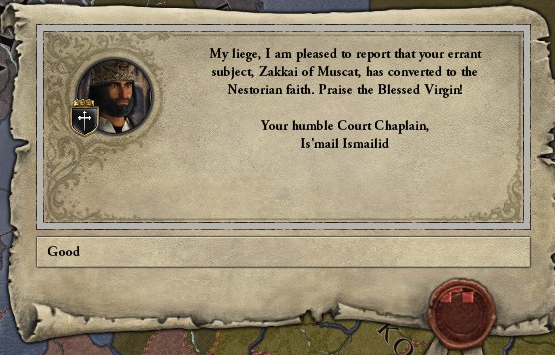  : Those that were welcomed in the pirate court had learned to love the twisted faith of the nesters, no matter what they believed back home. : Those that were welcomed in the pirate court had learned to love the twisted faith of the nesters, no matter what they believed back home.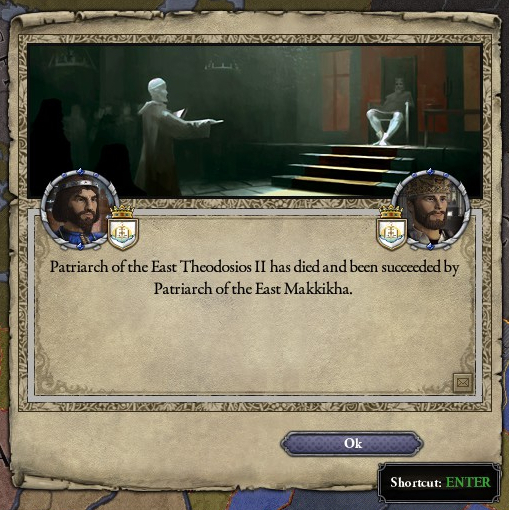  : The Sanaan also told me that he had stayed in Antioch for a spell. He had met a mad man, wandering the streets, proclaiming himself the Patriarch of the Nesters. He was harmless, and his speeches made the crowd laugh, so the people of the city indulged him. They fed him, clothed him, and even found another one delusional enough to be his successor. : The Sanaan also told me that he had stayed in Antioch for a spell. He had met a mad man, wandering the streets, proclaiming himself the Patriarch of the Nesters. He was harmless, and his speeches made the crowd laugh, so the people of the city indulged him. They fed him, clothed him, and even found another one delusional enough to be his successor.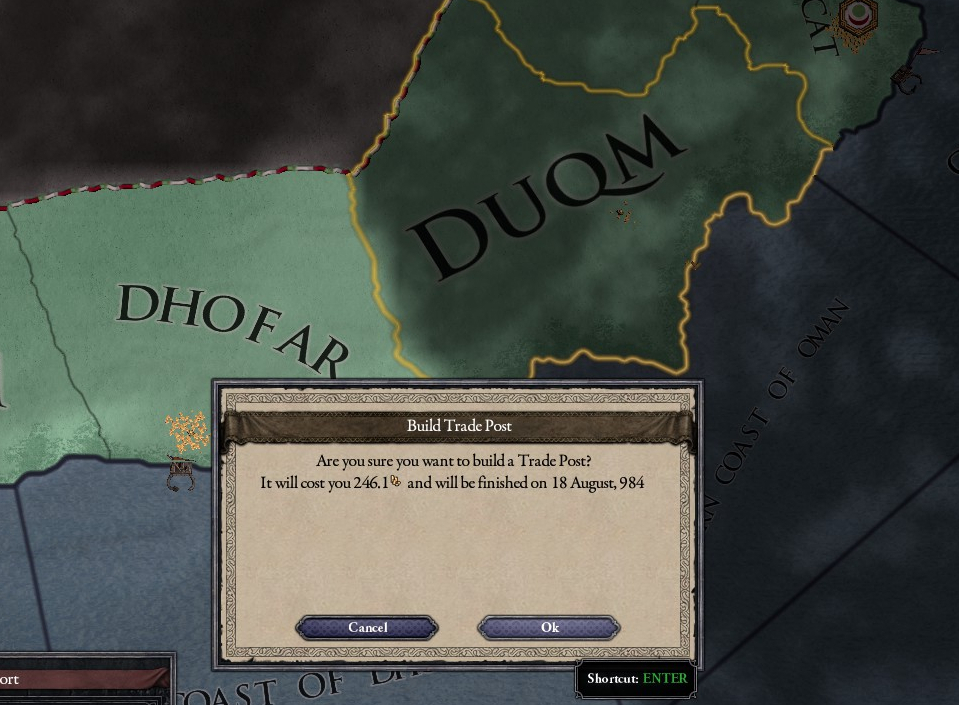  : The Sanaan also told us that the sons of Idris moved their nests further east in the Qalif's lands. With their posts, and their vile faith, they would reach Baluchistan next. : The Sanaan also told us that the sons of Idris moved their nests further east in the Qalif's lands. With their posts, and their vile faith, they would reach Baluchistan next.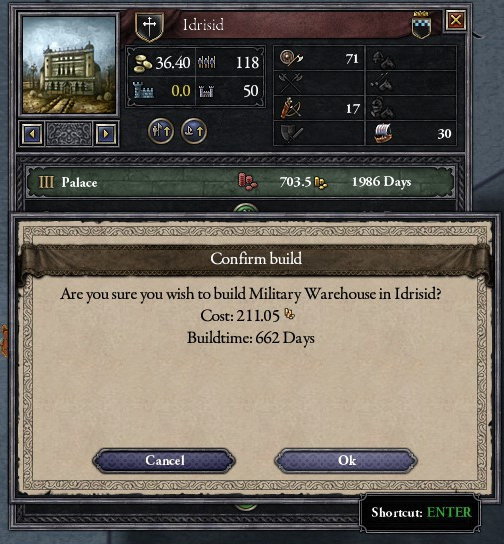  : He told us that Uways bin Idris and Alim bin Idris, the Dread Brothers, were spending the family money on war, hiring a large personal guard. : He told us that Uways bin Idris and Alim bin Idris, the Dread Brothers, were spending the family money on war, hiring a large personal guard.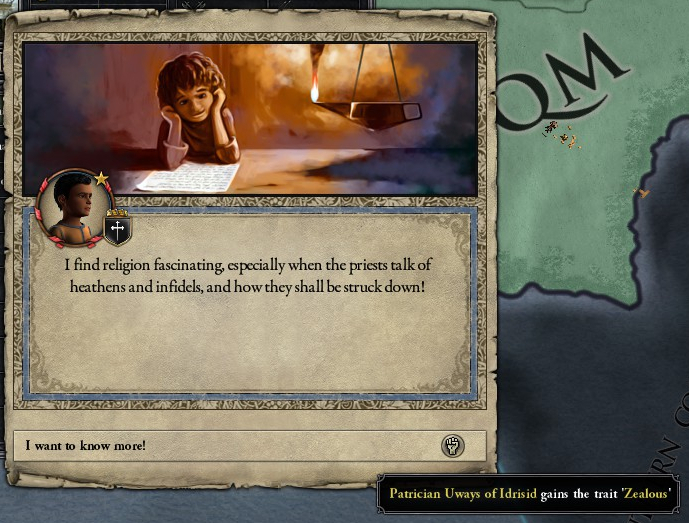  : Uways was the worse of the two. He took to the faith of Nesters well, revelling in stories of blodshed. In time, he would meet the Sanaan. The Sanaan would not survive the meeting. : Uways was the worse of the two. He took to the faith of Nesters well, revelling in stories of blodshed. In time, he would meet the Sanaan. The Sanaan would not survive the meeting.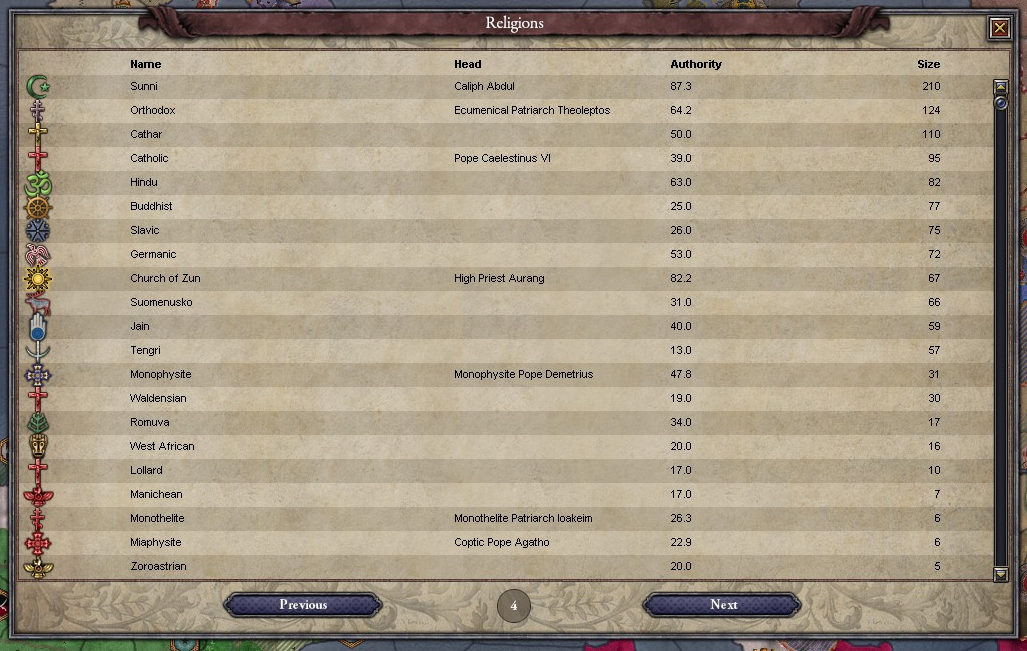  : We had parted ways around Kandahar. He was visiting the Sun Temple, while my father and I had no time for such delusions. We were heading home, to sell the Roman dyes he bargained for in Damascus. With the growth of the Church of Zun, more pilgrims would come visit the Sun Temple in Multan. We would peddle our wares there. : We had parted ways around Kandahar. He was visiting the Sun Temple, while my father and I had no time for such delusions. We were heading home, to sell the Roman dyes he bargained for in Damascus. With the growth of the Church of Zun, more pilgrims would come visit the Sun Temple in Multan. We would peddle our wares there.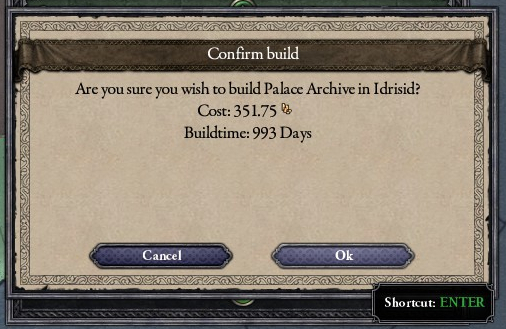  : I imagine that by now, Uways bin Idris continued building his army. Soon, the world would see him, atop his camel, storming the beaches of Sanaa. : I imagine that by now, Uways bin Idris continued building his army. Soon, the world would see him, atop his camel, storming the beaches of Sanaa.  : The Dread Lord Uways was coming. : The Dread Lord Uways was coming.Amir stands up, and puts his sketches away. There would be no more adventure stories for today. Grumbling, but with the spirits lifted, his companions went to their tents, waiting for the morning. They had a long road ahead of them.
|
|
|
|
I did not expect literal pirates, but feel this only underlines our need for plundering the rich lands of the Maldives and Sri Lanka. Ideally, we also spread not only Nestorianism, but Republicanism. No feudal vassals if we can help it! Mayors are a lot more afaid of pirates than lords you know
|
|
|
|
This is more amazing than I thought.
|
|
|
|
Rodyle posted:I did not expect literal pirates, but feel this only underlines our need for plundering the rich lands of the Maldives and Sri Lanka. We're spreading republicanism, but Nestorianism, not so much. We're literally the last Nestorians on Earth. Well, us, and a crazy guy in Antioch.
|
|
|
|
Kayten posted:We're spreading republicanism, but Nestorianism, not so much. We're literally the last Nestorians on Earth. Well, us, and a crazy guy in Antioch. You could always give land to the other families to seed out the faith. Though considering our Holy Site situation that could be a lost cause unless we give up our Indian Ocean flavor.
|
|
|
|
Nests for the Nest God! Camels for the camel throne! 
|
|
|
|
This is glorious though I admit I was a bit disappointed to find you didn't draw all the "screenshots" after the first few.  I guess it wouldn't have worked with this narrative style though, anyway. I guess it wouldn't have worked with this narrative style though, anyway.The Nest will rise again.
|
|
|
|
advokat posted:This is glorious though I admit I was a bit disappointed to find you didn't draw all the "screenshots" after the first few. Oh God no. I draw really slowly (and poorly). That drat map took me like, four hours, most of which were spent making the Muslim shields have vaguely right dimensions.
|
|
|
|
I like the unreliable narrator thing this guy has going on.
|
|
|
|
History Update 13 - Eastern Christians Today, we're going to be talking about Nestorians, and Eastern Christianity in general. As per usual, I'm gonna try to keep this neutral, and apologize in advance to anyone I might have offended. So let's start at the beginning:  Jesus of Nazareth, seen here giving the Apostles instructions on spreading his teachings around the world In 6 CE, the territories of Judea, Idumea and Samaria seized being Roman client kingdoms, and became imperial provinces. In 26 CE, Pontius Pilate took office as the Prefect of the province of Judea. Overall, he wasn't a big fan of the local people or their religion. A pretty lovely governor, truth be told. Sometime between 30 CE and 36 CE, he ordered the execution of a local preacher named Jesus by crucifixion: "About this time there lived Jesus, a wise man, if indeed one ought to call him a man. For he was one who performed surprising deeds and was a teacher of such people as accept the truth gladly. He won over many Jews and many of the Greeks. He was the Christ. And when, upon the accusation of the principal men among us, Pilate had condemned him to a cross, those who had first come to love him did not cease. He appeared to them spending a third day restored to life, for the prophets of God had foretold these things and a thousand other marvels about him. And the tribe of the Christians, so called after him, has still to this day not disappeared". -Flavius Josephus, "Antiquities of the Jews" In 37 CE, Pilate was ordered back to Rome after a brutal suppression of a Samaritan revolt. After Jesus' supposed ressurection, his followers went on to spread his message throughout the world, as far as Iberia (St. James) and Southern India (St. Thomas). The apostles were harshly persecuted, mostly as a reaction against the threat to the public order a religion that proclaimed everyone equal might bring. One of these early persecutors was Saul of Tarsus,a Roman citizen and a Jew. He claimed to have seen Jesus appear to him on the road to Jerusalem, and had converted to the Christian cause. He took the name Paul, and began preaching his message, accelerating the spread of early Christianity among the Romans. Christian communities started congregating in Antioch and Jerusalem, and naming local church leaders as bishops Early on, these men were Jewish converts. In 50 CE, the communities held the Council of Jerusalem, a first Christian council, where they hammered out the details of preaching to the Gentiles (non-Jews). Unfortunately, in 66 CE, the Jews revolted against Rome during the reign of Emperor Caligula. The Romans took Jerusalem, and burnt it down like only Romans could. With the destruction of the Second Temple, and the subsequent banishment of Jews from Jerusalem, further bishops of Jerusalem were Gentiles. 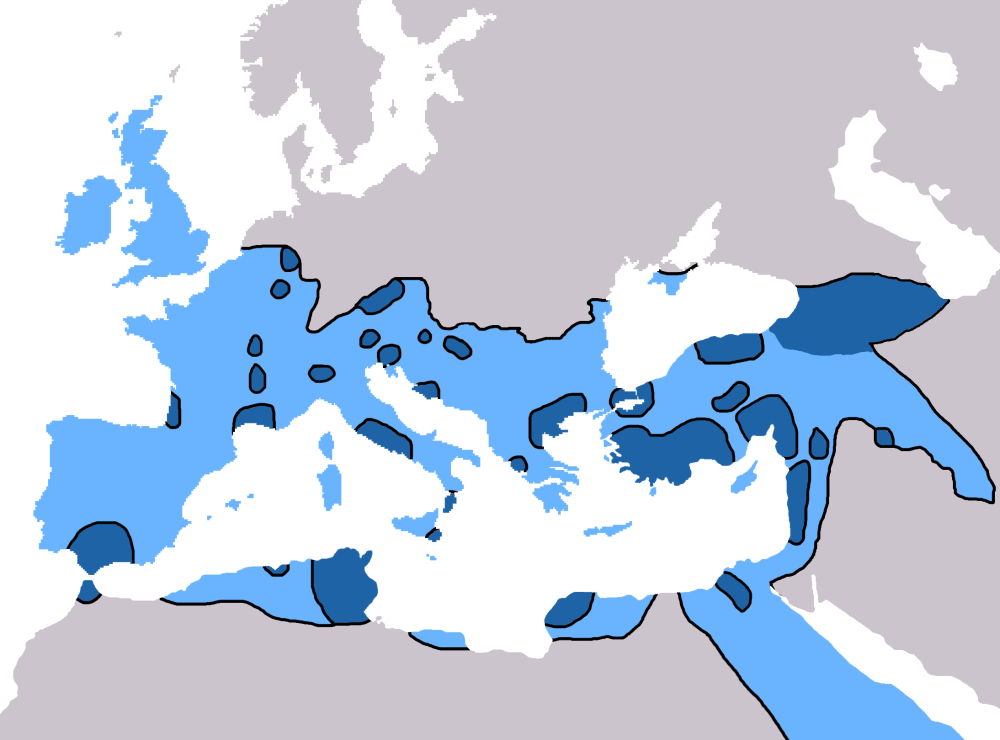 Early spread of Christianity by 325 CE (dark blue) and 600 CE (light blue) throughout the Roman Empire The last apostle, John the Apostle died around 98 CE in Ephesus, modern western Turkey. At this point, records get sketchy until the Council of Nicea, so we'll just cover the basics. Peter and Paul founded the Church in Rome, and named Linus, a Tuscan, Peter's succesor as the Bishop of Rome. The other Patriarchs, bishops of Antioch, Alexandria and Jerusalem had agreed that the bishop of Rome suceedes the apostles themselves. The Christian suppression took off in full swing here: "Consequently, to get rid of the report, Nero fastened the guilt and inflicted the most exquisite tortures on a class hated for their abominations, called Christians by the populace. Christus, from whom the name had its origin, suffered the extreme penalty during the reign of Tiberius at the hands of one of our procurators, Pontius Pilatus, and a most mischievous superstition, thus checked for the moment, again broke out not only in Jud?a, the first source of the evil, but even in Rome, where all things hideous and shameful from every part of the world find their centre and become popular. Accordingly, an arrest was first made of all who pleaded guilty; then, upon their information, an immense multitude was convicted, not so much of the crime of firing the city, as of hatred against mankind". -Publius Cornelius Tacitus, "Annals" The persecution did eventually calm down, solidifed by the Edict of Toleration (CE 311) by Emperor Galerius, which allowed Christians to do their own thing. The Christian movement itself started getting pretty fragmented in terms of rites, the nature of God, all that good stuff. It did, however, very noticeably drift away from its Jewish roots, focusing on the Gentiles. There was also a vague agreement on the writings that were considered canon, but not on their interpretation. This is where the first heresies came around: Arianism (Jesus is lesser that the Father), Docetism (Jesus was never a human), Montanism (a new prophet showed up, focused on tripping balls to experience the Holy Spirit) and the various dualisms (the physical is evil, while the spiritual is good, see: Bogomils, Cathars).  Emperor Constantine the Great (also known as St. Constantine, Equal-to-the-Apostles), first pro-Christian Roman Emperor Enter Constantine. Constantine was a military tribune under Diocletian and later Galerius. His father, Constantius, was the Western Roman Emperor, and, after his death in 306, his troops proclaimed him Emperor. While participating in the favourite Roman national past-time of civil war, he saw the image of chi-ro in his dream. He had his soldiers paint the image on their shields before the battle of the Milvian Bridge. He won a decisive victory in the battle, and attributed this to the God of the Christians. Later on, he would issue the Edict of Milan, which completely legalized Christianity throughout the Empire, returning confiscated property to the churches. Constantine had founded a city on the Bosporos, later named in his name, and levied a heavy tax on non-Christians to pay for it. In 325 CE, Constantine had called the First Council of Nicea. The overall goal of the council was to was to create a more or less unified church view on several things, including observing Easter, the nature of Christ, and establishing a solid church heirarchy. The council was a mixed success, and was quickly followed by another council in Constantinople in 381. Arianism was condemned as heretical. Constantine converted to Christianity on his deathbed in 337, becoming the first Christian Roman Emperor. The church thrived with Imperial sponsorship throughout the empire. Bishops baptized tons of new converts. In 380, Emperor Theodosius issued the Edict of Thessalonica, demanding that all Roman citizens profess the faith of the Bishops of Rome and Alexandria: Nicean. This didn't particularly sit well with the large Arian movements in the Eastern parts of the Empire, which ended up being heavily suppressed. 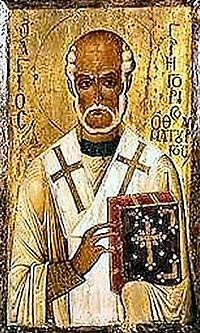 Nestorius, Patriarch of Constantinople, heretic In 428, Nestorius, a Syrian priest that got his training in Antioch, became the Patriarch of Constantinople. Trying to find middle ground between two theological factions, Nestorius insisted that Christ had two separate natures inside him. Roughly: "Jesus Christ, who is not identical with the Son but personally united with the Son, who lives in him, is one hypostasis and one nature: human" (Martin Lembke). Nestorius quickly came under fire from the Patriarch of Alexandria, who claimed that Nestorius was essentually saying that he was undermining Christ's divine nature. Eventually, in 431, another Ecumenical Council was called, this time in Ephesus, which labelled Nestorius' beliefs heretical. Nestorius fled to Antioch, surrendering his title. The Patriarch of Antioch continued to support him until 433. In 435, Theodosius II exiled Nestorius into an Egyptian monastery, a frequent target for bandit raids firmly under the Patriarch of Alexandria. He died there some time after 450. Meanwhile in Persia, ruled by Zoroastrians, the state was heavily suspicious of the Christian populace. Considered a religion of the Romans, the Christian church had to work extra hard to maintain neutrality. In 424, to ward off suspicion, the Persian Church declared itself separate from other Churches. After Nestorius was labeled a heretic, the Persian Church quickle adopted his teachings to distance itself from Constantinople. With the further crackdown on Nestorius' doctrine in the Empire, many Nestorians fled into Persia, where it limped on. The Patriarch of Seleucia had established several Metropolitan Sees (archbishops of important cities) in Ctesiphon, Gundeshapur and Nisibis. After a period of suppression during the renewed Roman-Persian conflicts in the early 500s, the church thrived. Dioceses were established in the Arabian Pennisula and Western India. Missionaries were sent to Egypt, where they came in conflict with the miaphysites (who held that Christ had but one nature); to Central Asia, where they had great success converting the nomadic tribes, and would eventually convert several members of Genghis Khan's royal family; and even China. The church survives to this day in the form of the Assyrian Church of the East, though some parts of Nestorian doctrine are no longer taught. Their headquarters are in located in Chicago, and they claim 400-500 000 members. TL;DR: Jesus-Rome-Constantinople-Antioch-Persia-Chicago.
|
|
|
|
Film Update 13 - Flynnin' It So, I kind of liked the themed thing we had going for the Normandy film updates, so we're going to do something similar this time as well. Hope y'all like pirates. 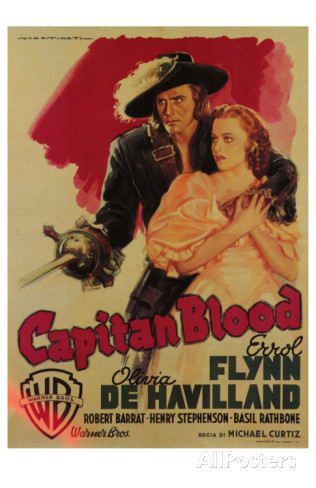 Today, we'll start off with Michael Curtiz's Captain Blood (1935). A young Irish doctor ends up on the wrong side of the Monmouth Rebellion in England, and, in lieu of an immediate hanging, gets sent to Jamaica to be sold as a slave. There, he charms a local ingenue, plans a daring escape, and steal a ship, becoming the terror of the Caribbean. Boarding parties, cannon fire and, of course, swordfights! 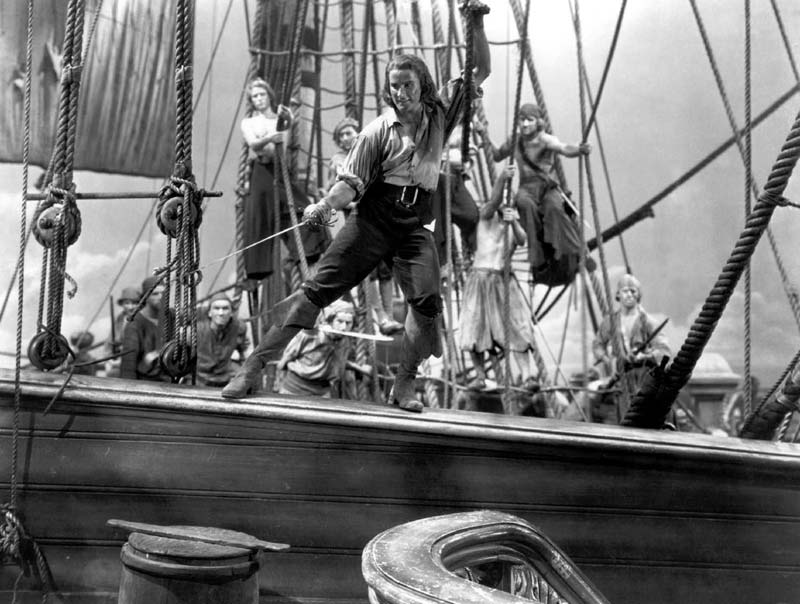 This is the film that catapulted Errol Flynn to stardom. Up until then, he's had a few bit parts here and there, but, after the first choice of Robert Donat (fresh off The Count of Monte Cristo) turned the role down due to his asthma, Flynn was signed on. People loved him, and it's very easy to see why: he gave an incredibly dashing performance. He's suave, he's charming, he's the essence of a swashbuckling hero.The female lead, Olivia de Havilland, was also a relative unknown at the time. Both would later star together in The Adventures of Robin Hood. If you like some good old-fashioned adventure filmed during the Great Depression, and want a good place to start with Errol Flynn movies, I definitely recommend it.
|
|
|
|
Sorry for the lack of updates, guys, in-between work and set, I've been pretty busy. Will update once things settle into a regular schedule again.
|
|
|
|
Arise, LP! Arise and CONQUER!
|
|
|
|
Update 14 - Going Legit The morning comes. The members of the Caravan pack away their tents, unsure of where to head next. Amir and Ulfr have disappeared. The Caravaners gather around last night's campfire, and hold a moot. Suddenly in the distance, a galley appears, heading towards the shore. After a few minutes, it drops anchor, and two men get into a boat to come ashore. It's Amir and Ulfr.  : Brothers and Sisters! We have returned with a glorious ship! On this fine vessel, we shall sail wherever we wish! : Brothers and Sisters! We have returned with a glorious ship! On this fine vessel, we shall sail wherever we wish!The Caravaners cautiously approach the boat. It is a very similar boat to the one that Mme. de Beaumont rented.  : How did you come across this galley? : How did you come across this galley? : Oh, it is a grand tale of adventure, my good man! Under the cover of night, the brave Viking and I skulked - : Oh, it is a grand tale of adventure, my good man! Under the cover of night, the brave Viking and I skulked - : We stole it. : We stole it. : Well, yes, if you want to tell the story, go right ahead, then. : Well, yes, if you want to tell the story, go right ahead, then. : We stole the boat. Marooned the captain. Now we sail. : We stole the boat. Marooned the captain. Now we sail. : You lack a sense for theatrics, my good friend. Either way, all of you, come aboard, and let us sail! : You lack a sense for theatrics, my good friend. Either way, all of you, come aboard, and let us sail!The Caravaners shuffle into the boat, and Ulfr and Amir row back to the galley. It is a strange sight to see so many fit into such a small boat. As you focus on one face, a dozen behind him blur into one. As you switch to another, the first one disappears into the crowd. The Caravan of the Dead is vast, and yet fits into small spaces. Ever upbeat, Amir continues spinning his tale as they row. 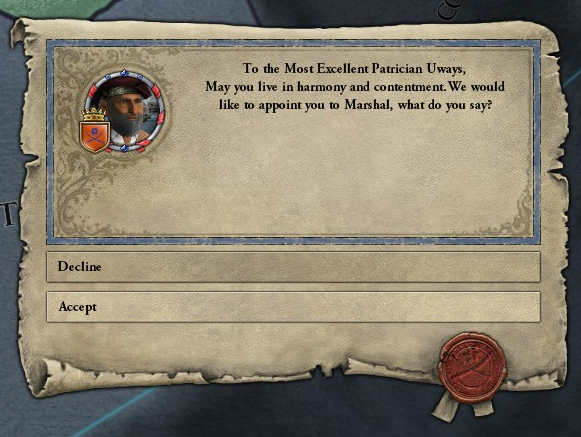  : As I have mentioned before, the dreaded pirate Uways bin Idris was a strong, angry man, even as a child. When he had fully grown, even the other pirate lords proclaimed him the strongest. Muslihiddin, the Camel-Fucker, even placed him in charge of his armies. : As I have mentioned before, the dreaded pirate Uways bin Idris was a strong, angry man, even as a child. When he had fully grown, even the other pirate lords proclaimed him the strongest. Muslihiddin, the Camel-Fucker, even placed him in charge of his armies.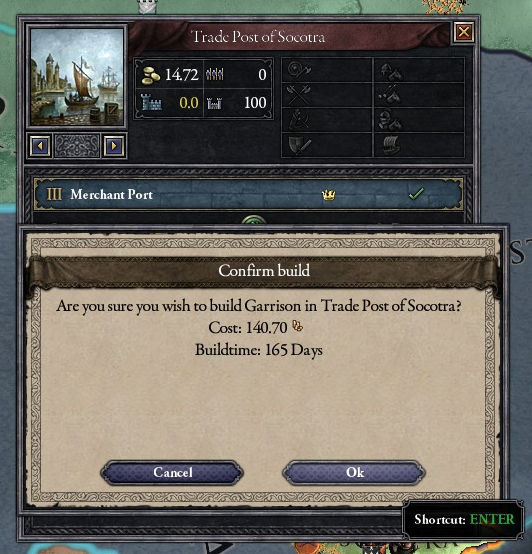  : The Dread Brothers had other plans. All of the Idris nests throughout Oman had sprouted camps and training fields. The Idrisids were preparing for war. : The Dread Brothers had other plans. All of the Idris nests throughout Oman had sprouted camps and training fields. The Idrisids were preparing for war.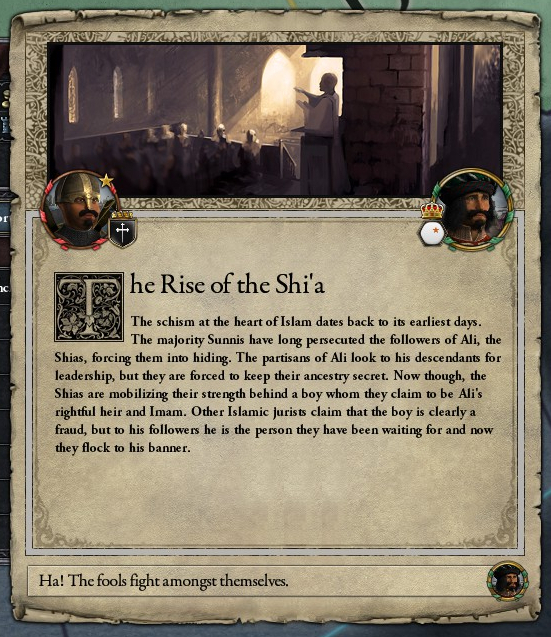  : This is when the Muslims had finally fractured for good. A boy in Tunis was raised up as a descendent of an old imam of theirs, Ali. Armies were raised in his name and soon, the Shiites took Africa. : This is when the Muslims had finally fractured for good. A boy in Tunis was raised up as a descendent of an old imam of theirs, Ali. Armies were raised in his name and soon, the Shiites took Africa.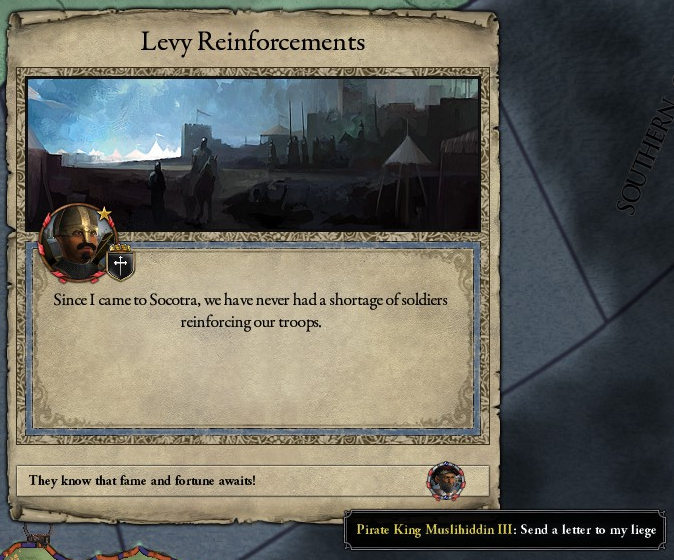  : The Dread Brothers maintained their ruse of loyalty. Uways trained the troops on Socotra, but not for his pirate king, no. For himself. : The Dread Brothers maintained their ruse of loyalty. Uways trained the troops on Socotra, but not for his pirate king, no. For himself.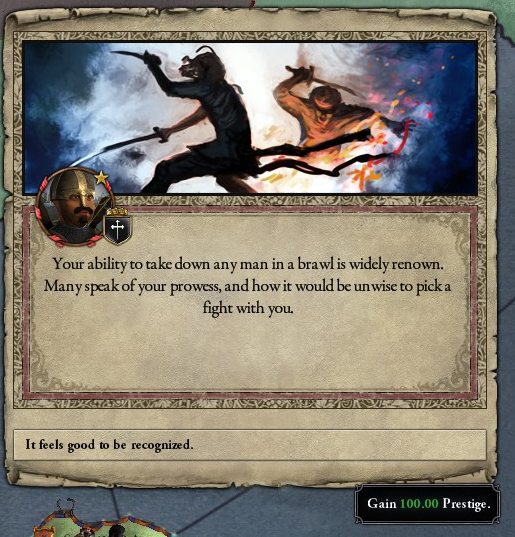  : For he had become a dangerous man indeed. Tales spread about his exploits throughout the Socotran nests, and from them - to civilization. : For he had become a dangerous man indeed. Tales spread about his exploits throughout the Socotran nests, and from them - to civilization. : I had heard a tale that he trained his men to ride camels into the surf, to teach the beasts to swim. He had lined up his camels, and whipped them until they walked into the waves. When one ran back, terrified of the salt waters, Uways picked it up and tore it in half with his bare hands. : I had heard a tale that he trained his men to ride camels into the surf, to teach the beasts to swim. He had lined up his camels, and whipped them until they walked into the waves. When one ran back, terrified of the salt waters, Uways picked it up and tore it in half with his bare hands. : Camels are stupid creatures, but even they knew better than to question Uways' orders. They ran into the waves, and soon, many would float. : Camels are stupid creatures, but even they knew better than to question Uways' orders. They ran into the waves, and soon, many would float.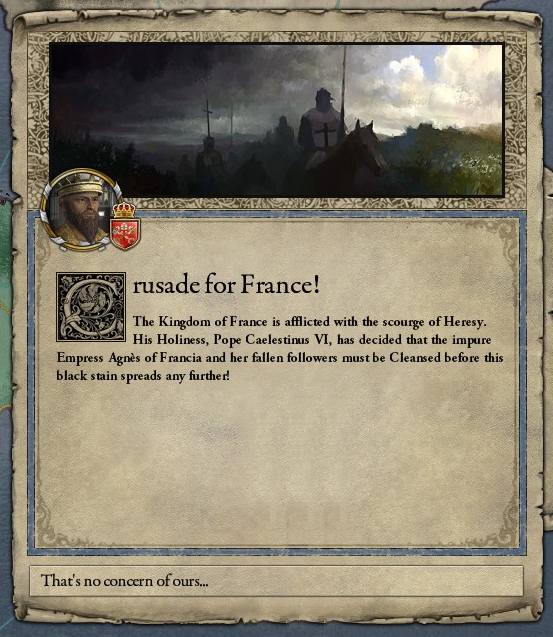  : In the Far West, the empire of Frunseeya was at war with the Catholic king. : In the Far West, the empire of Frunseeya was at war with the Catholic king. 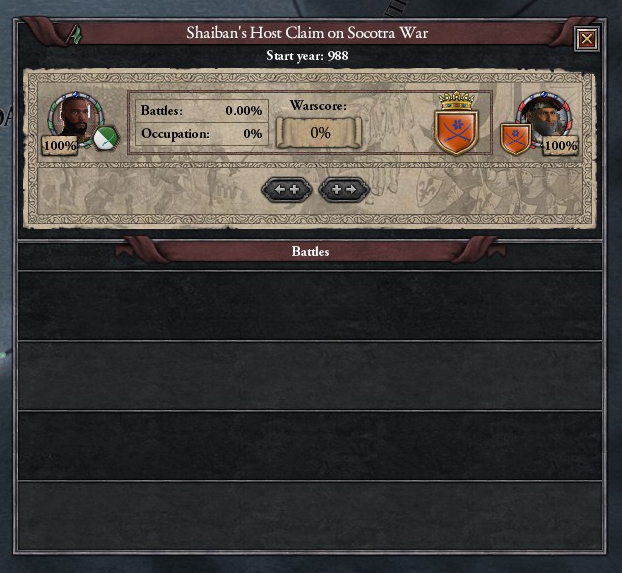  : While the Camel-Fucker defended Socotra itself from war. A distant nephew to the old Emir had gathered men, promised them gold, and sailed to retake the Bird Isle. : While the Camel-Fucker defended Socotra itself from war. A distant nephew to the old Emir had gathered men, promised them gold, and sailed to retake the Bird Isle. : It was not much of a war. The emir's nephew had no way to storm Socotran shores, and not enough ships to fully blockade the port. Pirate raids continued uninterrupted. : It was not much of a war. The emir's nephew had no way to storm Socotran shores, and not enough ships to fully blockade the port. Pirate raids continued uninterrupted. 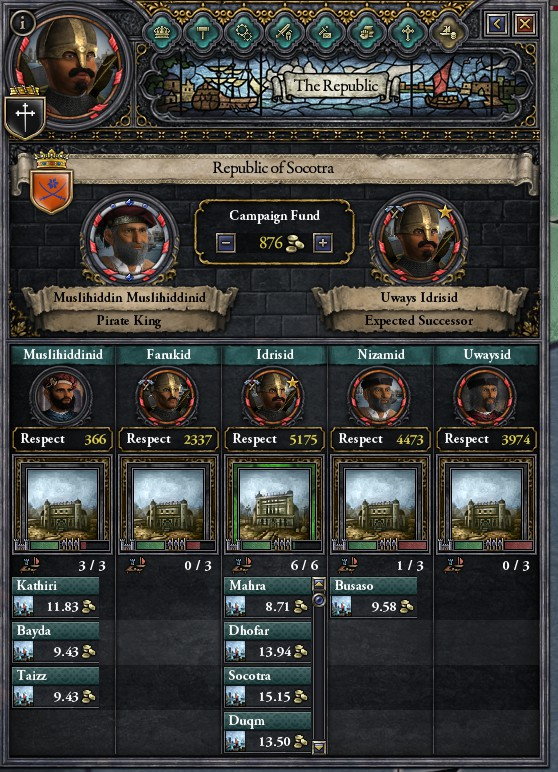  : Uways in particular benefitted greatly from this occasion. While the pirate ships slipped around Socotra freely, others were not so well-trained on the seas. Uways opened up nests further and further east. First, in Baluchistan, and then on Zunbil shores. : Uways in particular benefitted greatly from this occasion. While the pirate ships slipped around Socotra freely, others were not so well-trained on the seas. Uways opened up nests further and further east. First, in Baluchistan, and then on Zunbil shores. : These brought him great wealth. Saffron and cinnamon from the Solar Empire flew to Socotra, and from there - to Alexandria, in Eedjipt. : These brought him great wealth. Saffron and cinnamon from the Solar Empire flew to Socotra, and from there - to Alexandria, in Eedjipt. : To celebrate his wealth, he had life-sized gold statues of each pirate lord made, as gifts. He had hoped it would sway them on the Camel-Fucker's death. : To celebrate his wealth, he had life-sized gold statues of each pirate lord made, as gifts. He had hoped it would sway them on the Camel-Fucker's death.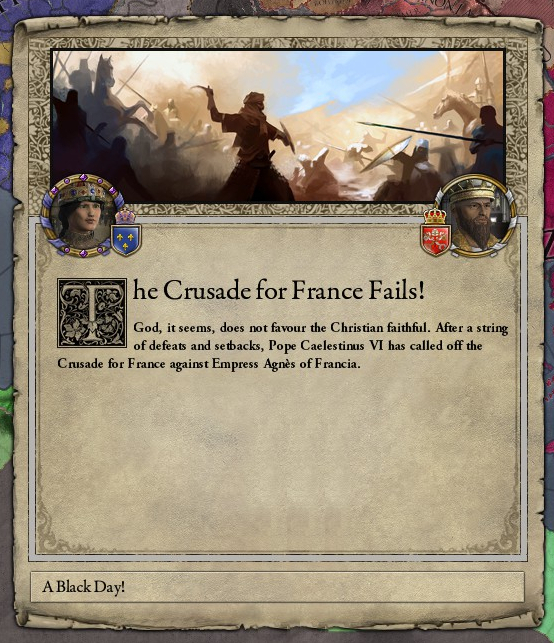  : The Frunseeyans, it seems, had burnt down Rome for a third time, forcing the Catholic king to call off his war. : The Frunseeyans, it seems, had burnt down Rome for a third time, forcing the Catholic king to call off his war.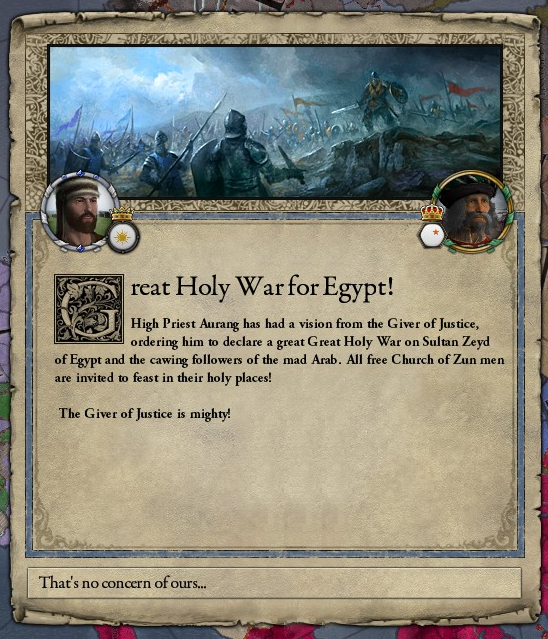  : I was a man fully-grown by then. My father came home one night, telling me the rumours he's heard around the warehouses. The High Priest had his eye set on Heliopolis, a Sun Temple in Eedjipt. A Great Holy War was coming. : I was a man fully-grown by then. My father came home one night, telling me the rumours he's heard around the warehouses. The High Priest had his eye set on Heliopolis, a Sun Temple in Eedjipt. A Great Holy War was coming. : I had no interest in fighting the Zunbils' wars. They could send their own children to die in the desert. Instead, I chartered a galley, and set sail west, to trade with the Muslims on coast of Oman. The pirates would not be the only ones selling saffron. : I had no interest in fighting the Zunbils' wars. They could send their own children to die in the desert. Instead, I chartered a galley, and set sail west, to trade with the Muslims on coast of Oman. The pirates would not be the only ones selling saffron.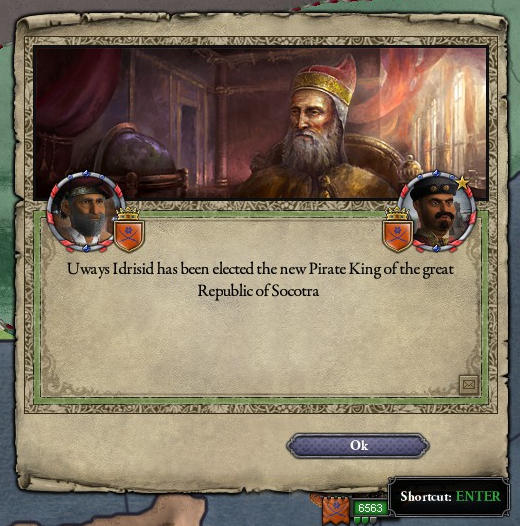  : As I sailed into a nest in Bayda, from one of the lesser pirate families, I had heard news. It would appear that the Camel-Fucker had sailed straight into the blockade, armed with nothing but a sword. The invaders' navy boarded the ship, and cut him down. : As I sailed into a nest in Bayda, from one of the lesser pirate families, I had heard news. It would appear that the Camel-Fucker had sailed straight into the blockade, armed with nothing but a sword. The invaders' navy boarded the ship, and cut him down. : An emergency session of the pirate lords was called. Uways proclaimed this an unfortunate accident, calling the man a brave pirate, worthy of his name. He demanded they elect a new Pirate King, one who was bold, and unafraid to strike back against the invaders. Impressed with his wealth, the other houses voted him in, naming him Uways I, the Pirate King of Socotra. : An emergency session of the pirate lords was called. Uways proclaimed this an unfortunate accident, calling the man a brave pirate, worthy of his name. He demanded they elect a new Pirate King, one who was bold, and unafraid to strike back against the invaders. Impressed with his wealth, the other houses voted him in, naming him Uways I, the Pirate King of Socotra.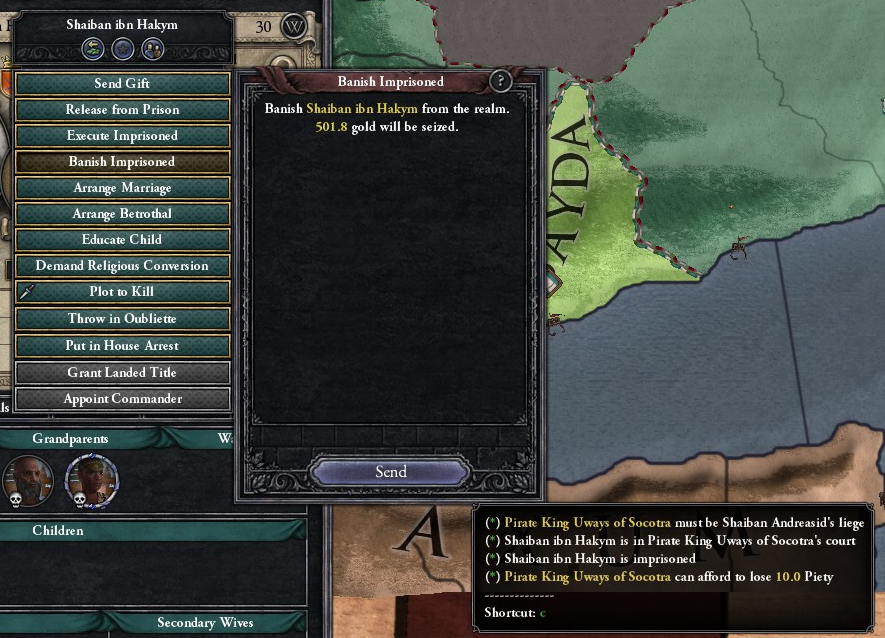  : It did not take him long to prove his mettle. Under the cover of night, he took a few of his camel-trained soldiers, and sailed to the blockade. I have seen these camels fight, my brothers, and they are terrifying. I do not known how they kept them silent for so long. : It did not take him long to prove his mettle. Under the cover of night, he took a few of his camel-trained soldiers, and sailed to the blockade. I have seen these camels fight, my brothers, and they are terrifying. I do not known how they kept them silent for so long. : But it worked. With the camels running across the deck of the invaders' flagship, the crew was distracted enough for Uways and his men to sneak into the captain's cabin, and steal the man away. : But it worked. With the camels running across the deck of the invaders' flagship, the crew was distracted enough for Uways and his men to sneak into the captain's cabin, and steal the man away. : He was brought before the pirate lords, to be tried for his crimes. Uways named him guilty of smuggling and seized his ships and his treasures. He had his hands chopped off, in the Nester tradition, and sent him on a boat floating to Sanaa. He proclaimed the Camel-Fucker avenged. : He was brought before the pirate lords, to be tried for his crimes. Uways named him guilty of smuggling and seized his ships and his treasures. He had his hands chopped off, in the Nester tradition, and sent him on a boat floating to Sanaa. He proclaimed the Camel-Fucker avenged.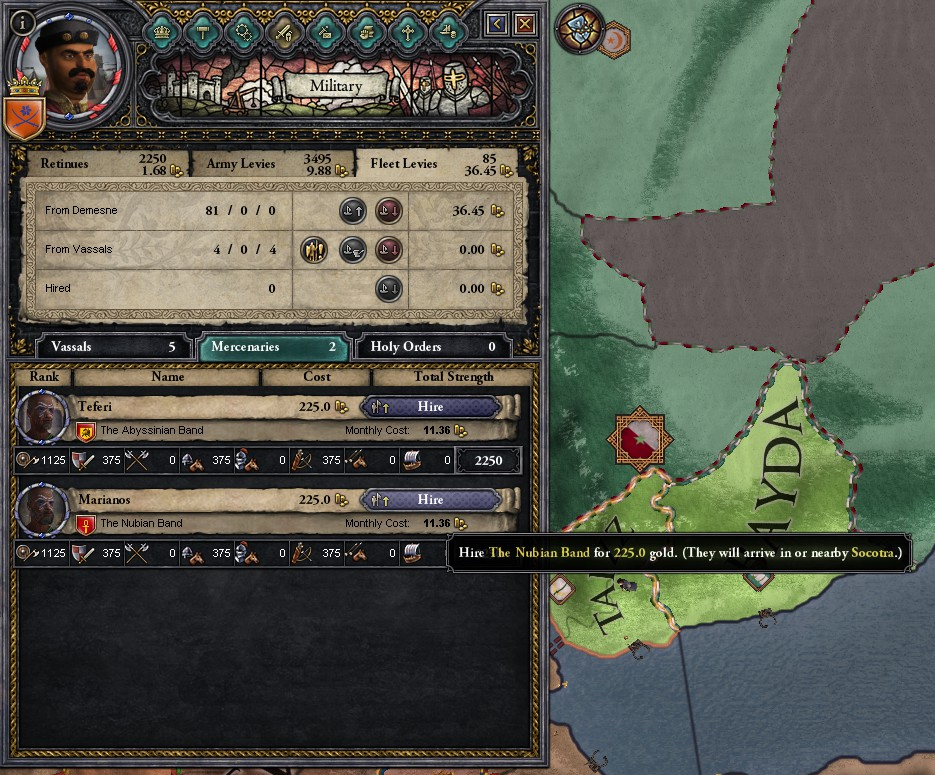  : With these great treasures, Uways had turned his gaze west, to Aksum. The Christian duchy was at peace for the first time in forty years, and plenty of men were willing to fight for coin. : With these great treasures, Uways had turned his gaze west, to Aksum. The Christian duchy was at peace for the first time in forty years, and plenty of men were willing to fight for coin. : And Uways had coin. : And Uways had coin.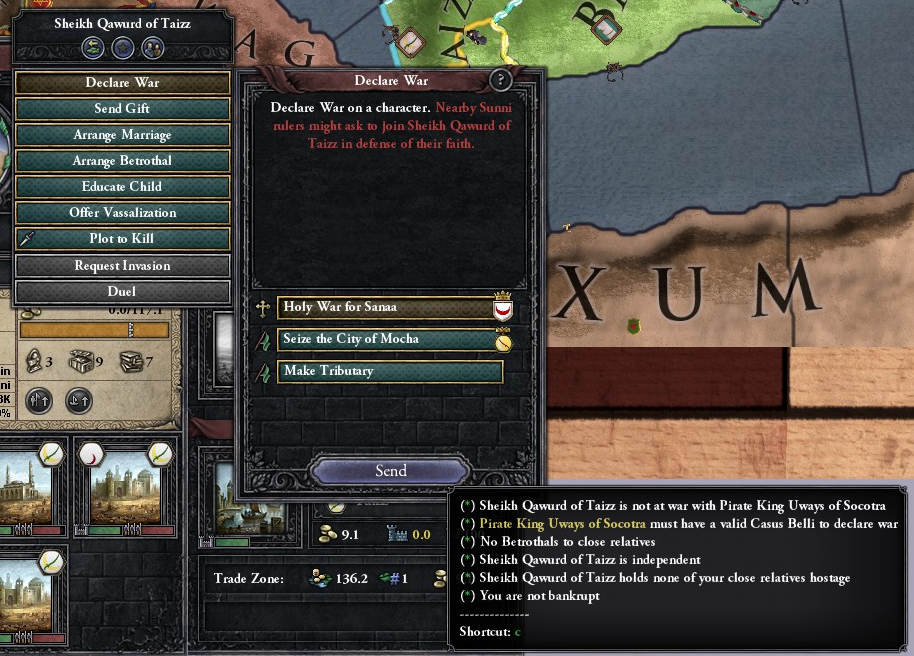  : Uways did not think that an invader's hands would be enough to sate the bloodlust of the Nester gods, and so, he offered them Sanaa in sacrifice. : Uways did not think that an invader's hands would be enough to sate the bloodlust of the Nester gods, and so, he offered them Sanaa in sacrifice. : At the same time as his invasion began, he had sent his brother, Alim, east, into the Qalif's lands. He was to find all he could about their armies. : At the same time as his invasion began, he had sent his brother, Alim, east, into the Qalif's lands. He was to find all he could about their armies.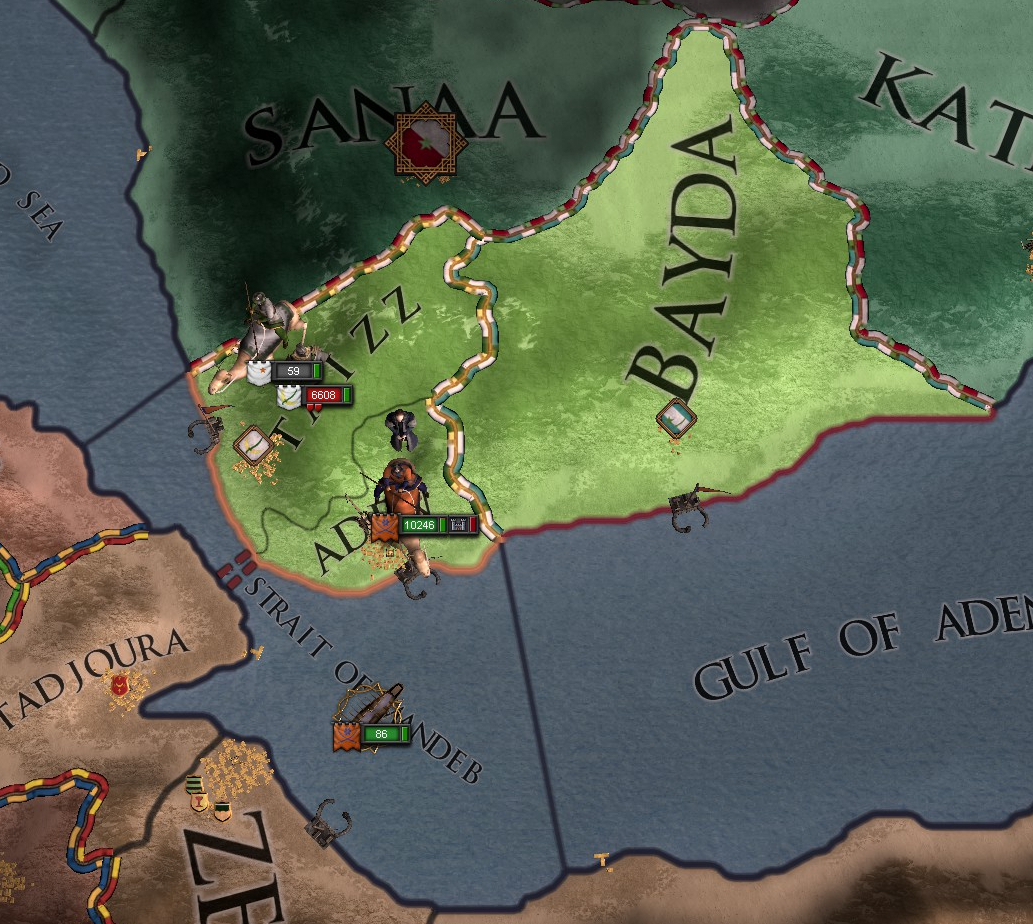  : With all the nests sending men, and with his army of trained camels, the emir of Taizz had no chance. : With all the nests sending men, and with his army of trained camels, the emir of Taizz had no chance.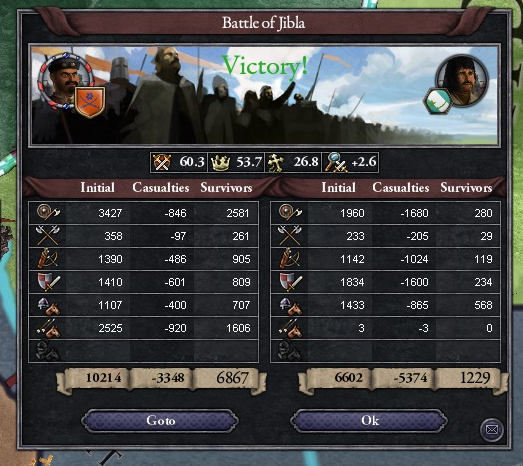  : Riding the first camel to charge, Uways had smashed into the Muslims. None walked away from the battle. : Riding the first camel to charge, Uways had smashed into the Muslims. None walked away from the battle.  : Storming into the emir's palace, Uways had dragged the man into the city square. He had him, and every nobleman in the land brought into a line in front of him on their knees. He walked among them, chanting Nester prayers, and with each pause he would bend down and cut a nobleman's throat. There were many nobles, and the springs of bloods joined into a river that washed into the Red Sea.0 : Storming into the emir's palace, Uways had dragged the man into the city square. He had him, and every nobleman in the land brought into a line in front of him on their knees. He walked among them, chanting Nester prayers, and with each pause he would bend down and cut a nobleman's throat. There were many nobles, and the springs of bloods joined into a river that washed into the Red Sea.0 : He then had Socotran men sit as mayors of Mocha and Taizz. Never again would Muslims rule Sanaa. : He then had Socotran men sit as mayors of Mocha and Taizz. Never again would Muslims rule Sanaa.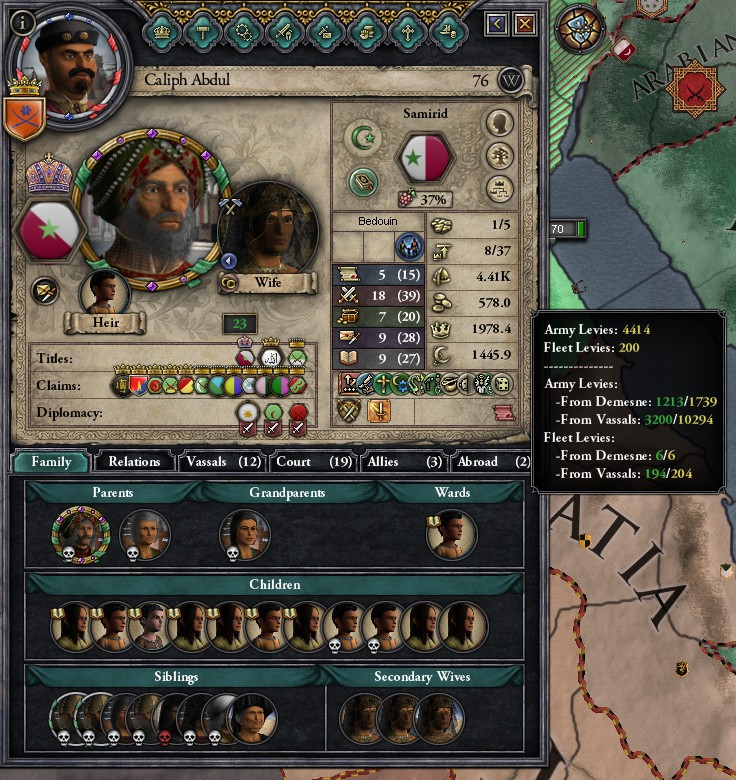  : As Uways was spreading terror throughout Sanaa, a letter came from his brother. It told him that the Qalif fought against the armies of the Sun, and his forces were few and weak. The time to spread east was now. : As Uways was spreading terror throughout Sanaa, a letter came from his brother. It told him that the Qalif fought against the armies of the Sun, and his forces were few and weak. The time to spread east was now.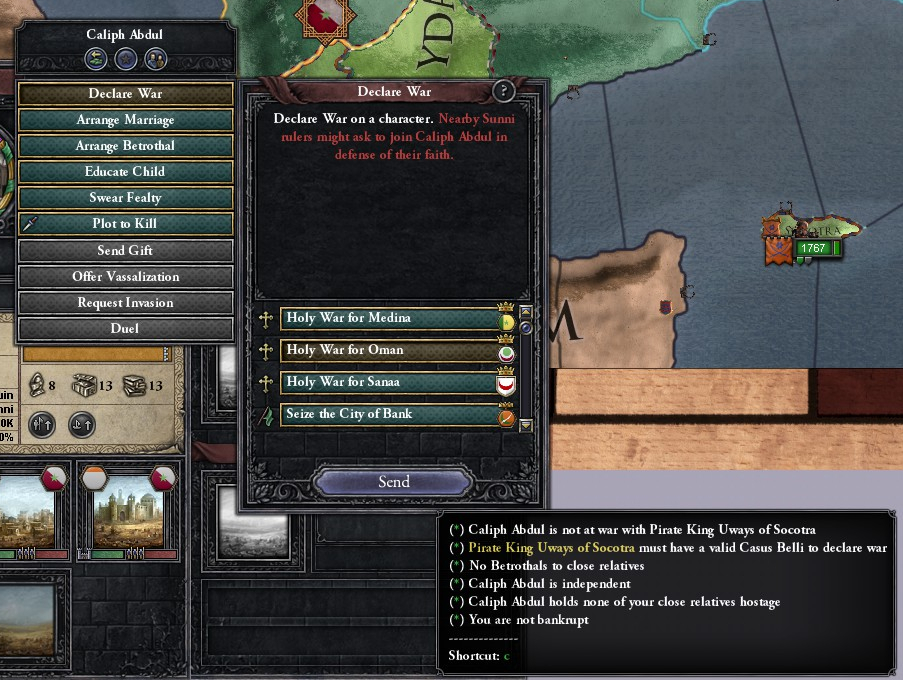  : I had been trading cinnamon in Bayda at the time. The pirate nests were very welcoming of strangers, if those strangers had goods to trade. I could see the Idrisid fleet move past us, as it carried ten thousand men and two thousand camels towards the Qalif. A magnificent sight! : I had been trading cinnamon in Bayda at the time. The pirate nests were very welcoming of strangers, if those strangers had goods to trade. I could see the Idrisid fleet move past us, as it carried ten thousand men and two thousand camels towards the Qalif. A magnificent sight!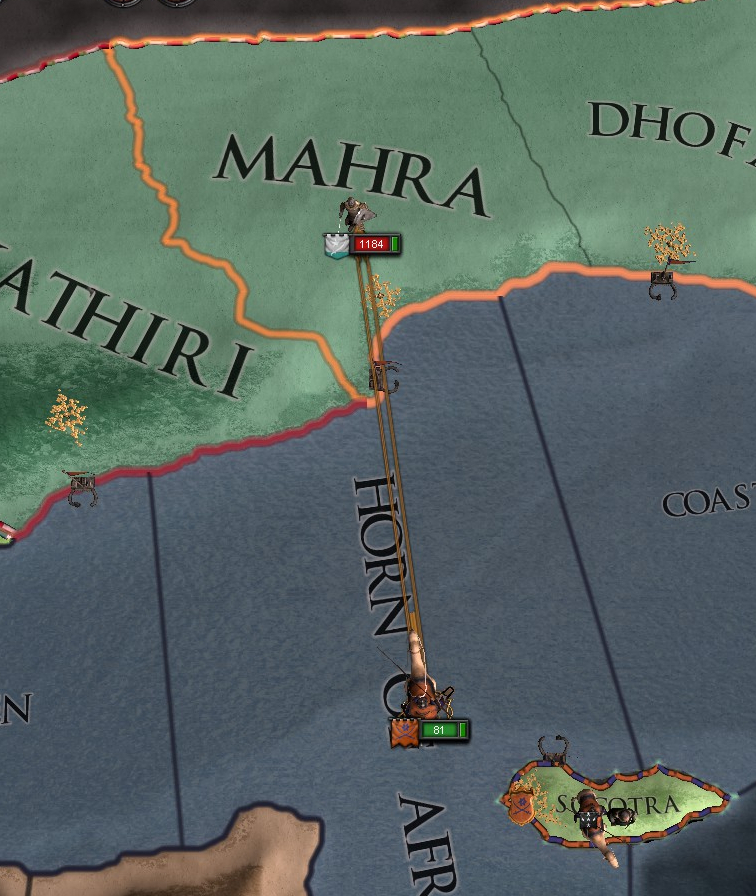  : The man had achieved the impossible. He had finally taught his camels to swim. Imagine, in the dead of night, you see the fires of the approaching ships, and hear nothing but the waves crash. You stand in line with your brothers, eager to defend your home against the wretched. When suddenly, a shrill braying cuts through the night, and two thousand camels storm the beach. Savages ride atop these amphibious beasts, a torch in one hand, and a blade in the other. : The man had achieved the impossible. He had finally taught his camels to swim. Imagine, in the dead of night, you see the fires of the approaching ships, and hear nothing but the waves crash. You stand in line with your brothers, eager to defend your home against the wretched. When suddenly, a shrill braying cuts through the night, and two thousand camels storm the beach. Savages ride atop these amphibious beasts, a torch in one hand, and a blade in the other.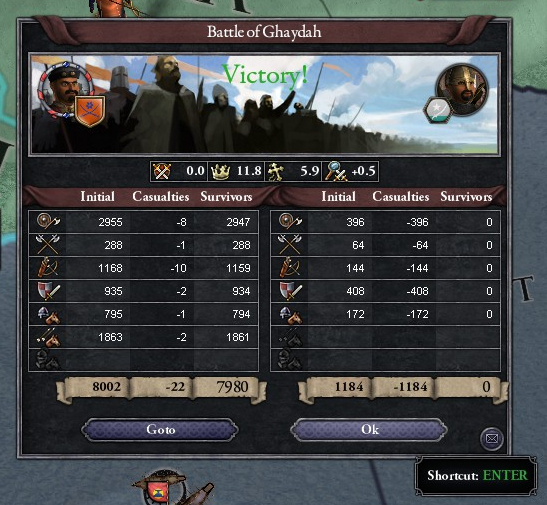  : Many fled in terror. But no man can outrun a mad camel. : Many fled in terror. But no man can outrun a mad camel.Ulfr stops rowing.  : This is not true. : This is not true. : I swear on the Justice-Giver's name! Camel marines, Ulfr! The man had camel marines! : I swear on the Justice-Giver's name! Camel marines, Ulfr! The man had camel marines! : Never saw camel. Saw moose. Never saw moose swim. Not with a rider. Reason camels can't either. : Never saw camel. Saw moose. Never saw moose swim. Not with a rider. Reason camels can't either. : Of all my tales, this is the truest one of all! Camels can swim! : Of all my tales, this is the truest one of all! Camels can swim! : I don't believe you. : I don't believe you.Regardless, Ulfr picks up his oar, and returns to rowing.  : Have faith in my stories, Ulfr. : Have faith in my stories, Ulfr.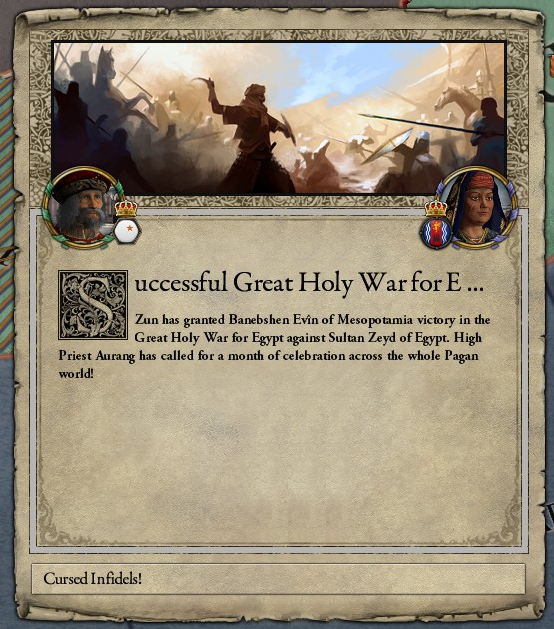  : As the camels stormed the beaches of Oman, the Muslims in Bayda talked about the loss of Eedjipt. It seems the warriors of the Sun had prevailed. : As the camels stormed the beaches of Oman, the Muslims in Bayda talked about the loss of Eedjipt. It seems the warriors of the Sun had prevailed.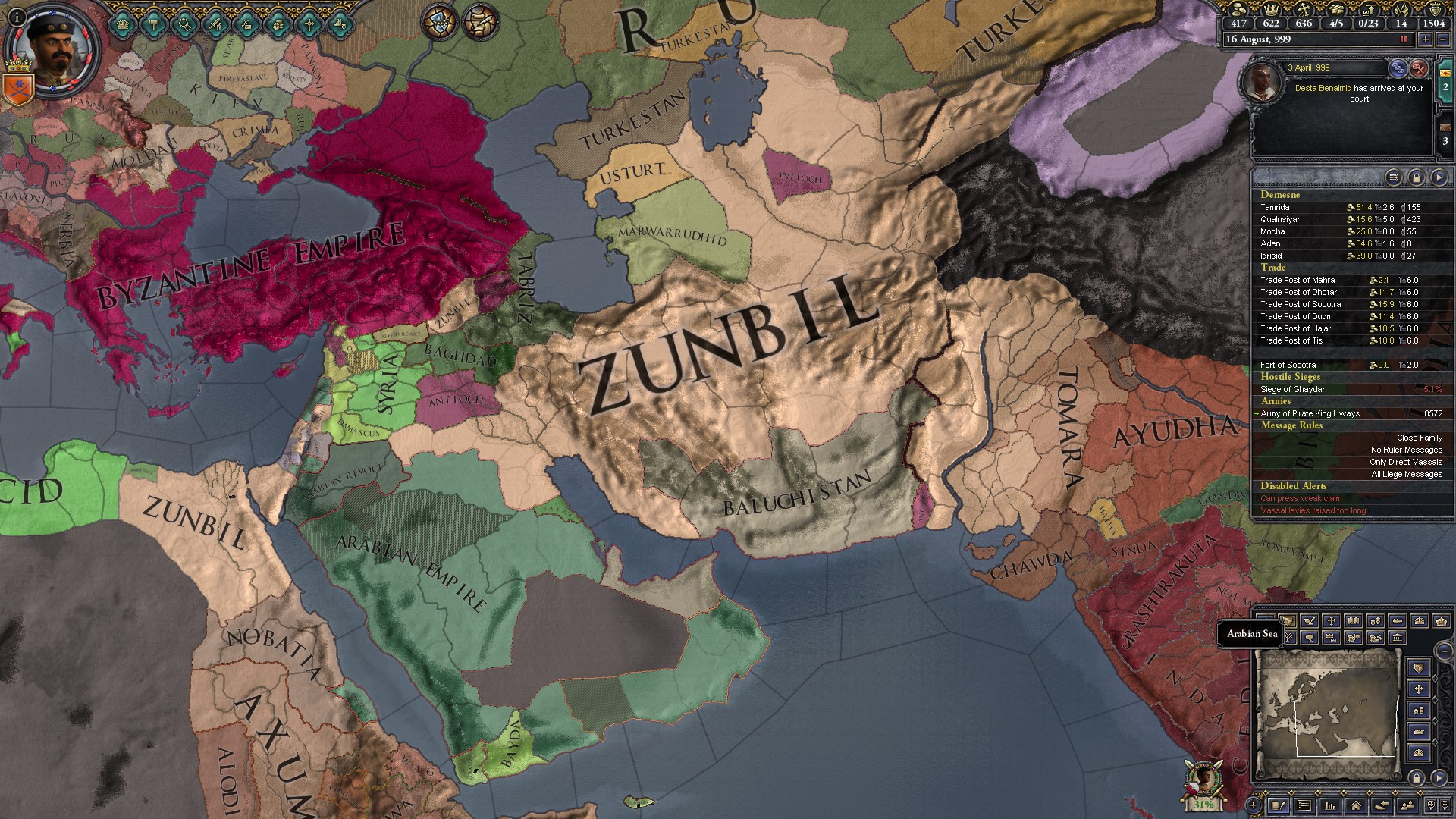  : The empire grew, far beyond the dreams of Zere, or even Pujman. : The empire grew, far beyond the dreams of Zere, or even Pujman.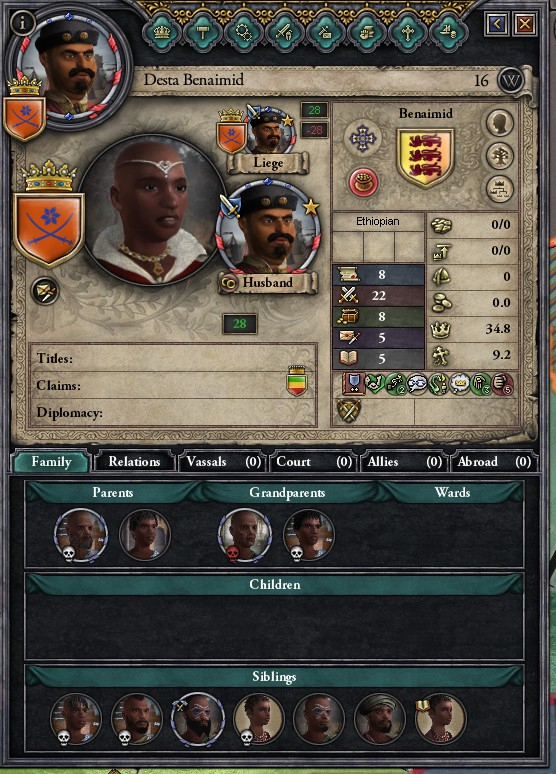  : The Pirate King himself got married, to an Aksum woman. Gold from all over the sea was given to the bride, a girl 13 years his junior. : The Pirate King himself got married, to an Aksum woman. Gold from all over the sea was given to the bride, a girl 13 years his junior.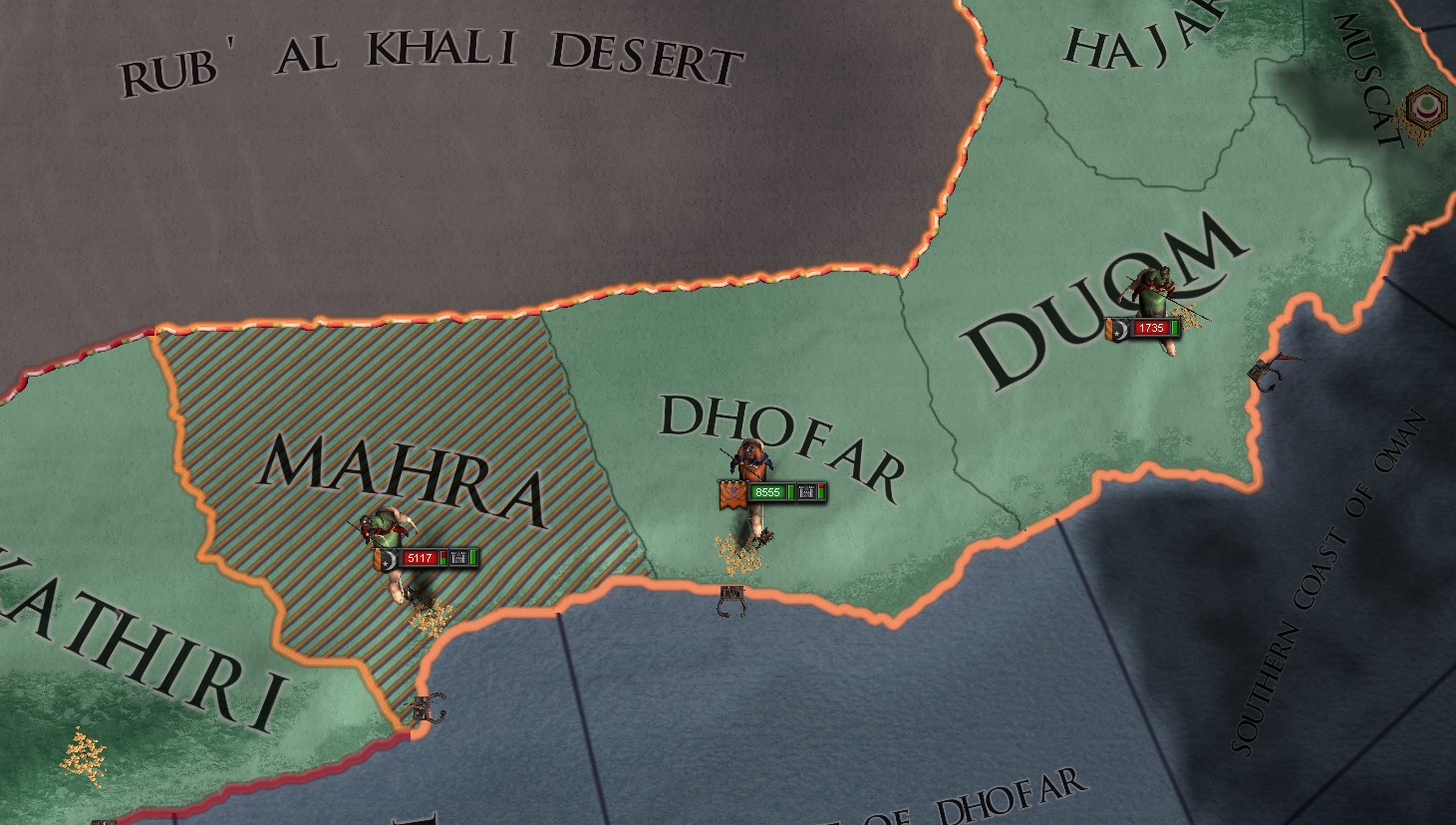  : From the wedding, straight to the battlefield. Uways rejoined his troops in Oman. His war was being won by the desert itself: the Qalif's armies had to go around it, and could not come together in time. : From the wedding, straight to the battlefield. Uways rejoined his troops in Oman. His war was being won by the desert itself: the Qalif's armies had to go around it, and could not come together in time.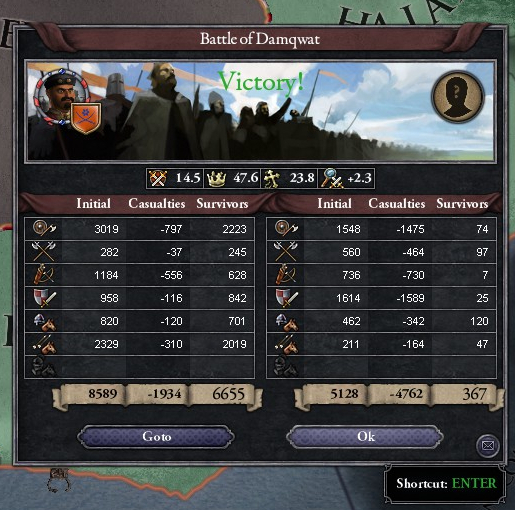  : Separate and alone, they all fell to the camels. : Separate and alone, they all fell to the camels.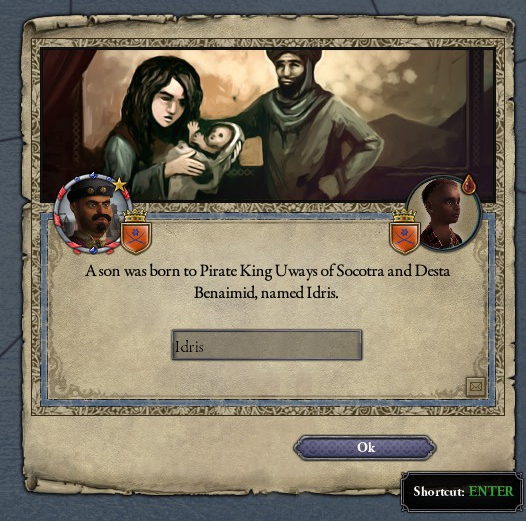  : In the Pirate King's absence, the girl bore him a son. He named him after his father. This did not bode well for the world. : In the Pirate King's absence, the girl bore him a son. He named him after his father. This did not bode well for the world.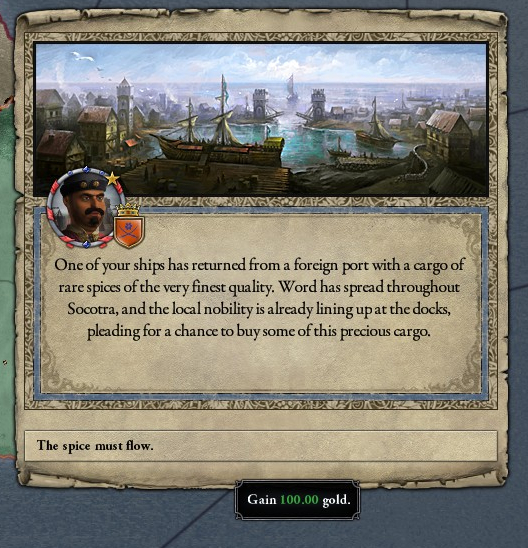  : Even in war, the man spread his nests further and further east. The Zunbil nests had given him fruit: Socotra now legally traded cinnamon. : Even in war, the man spread his nests further and further east. The Zunbil nests had given him fruit: Socotra now legally traded cinnamon.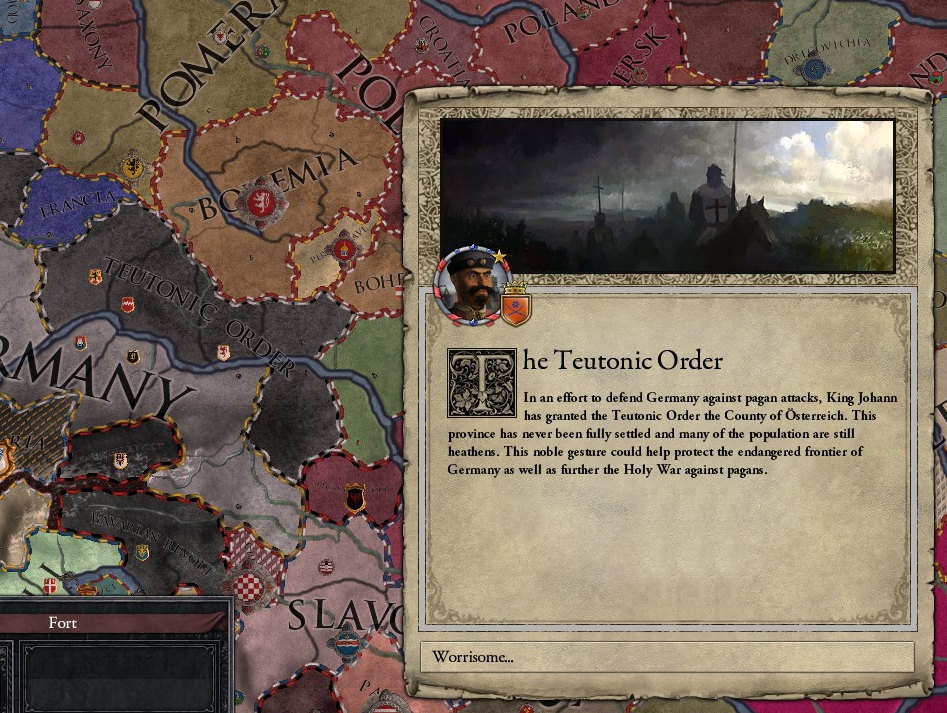  : As the war raged on, I had picked up word from the Far West: the Tewtans had settled along the Reynn. A true Kingdom of Camel Knights. : As the war raged on, I had picked up word from the Far West: the Tewtans had settled along the Reynn. A true Kingdom of Camel Knights.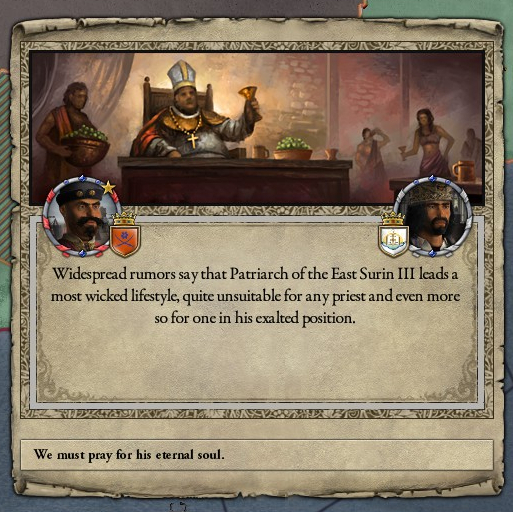  : And, of course, the Nester "Patriarch", a crazy man living in Antioch, had chosen the worst man he could as his successor. A vile creature, with nothing but base instinct. A true Nester, in other words. : And, of course, the Nester "Patriarch", a crazy man living in Antioch, had chosen the worst man he could as his successor. A vile creature, with nothing but base instinct. A true Nester, in other words.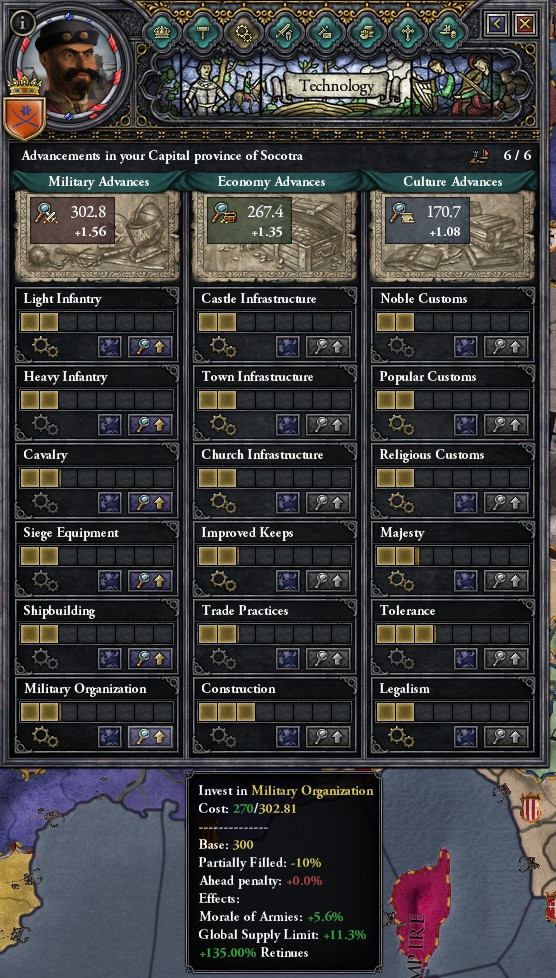  : With his victories in Oman showing the power of his camels, he had ordered more to be trained on the Isle at once. : With his victories in Oman showing the power of his camels, he had ordered more to be trained on the Isle at once. : I had made a healthy profit off my cinnamon stores, and decided to sail further west, to Zunbil-held Eedjipt. There was now a market for holy saffron at the new sun temples. : I had made a healthy profit off my cinnamon stores, and decided to sail further west, to Zunbil-held Eedjipt. There was now a market for holy saffron at the new sun temples.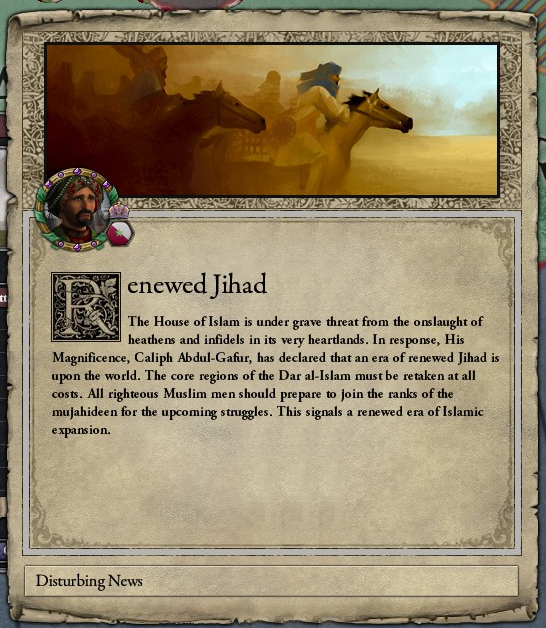  : It seems my timing was... poor. : It seems my timing was... poor.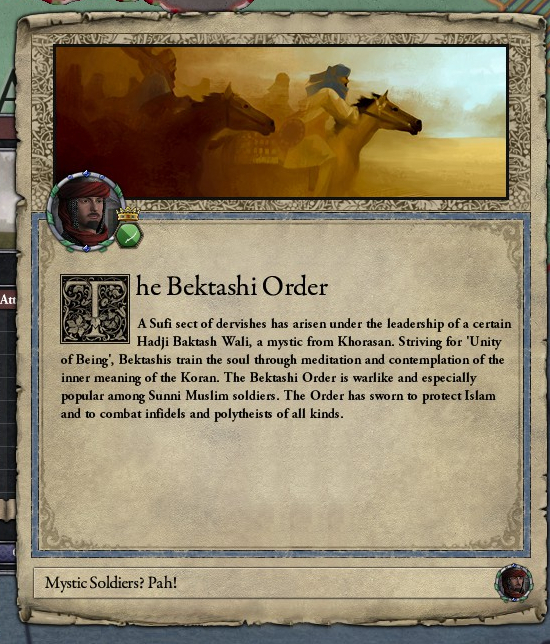  : The Shia Qalif (not to be confused with the Sunni Qalif, who was warring against the Socotrans) was no longer a boy. He had grown in renown, well-liked for his good governance, and piety. Many men swore their swords to him. : The Shia Qalif (not to be confused with the Sunni Qalif, who was warring against the Socotrans) was no longer a boy. He had grown in renown, well-liked for his good governance, and piety. Many men swore their swords to him. : And these men considered Eedjipt important to their faith. : And these men considered Eedjipt important to their faith.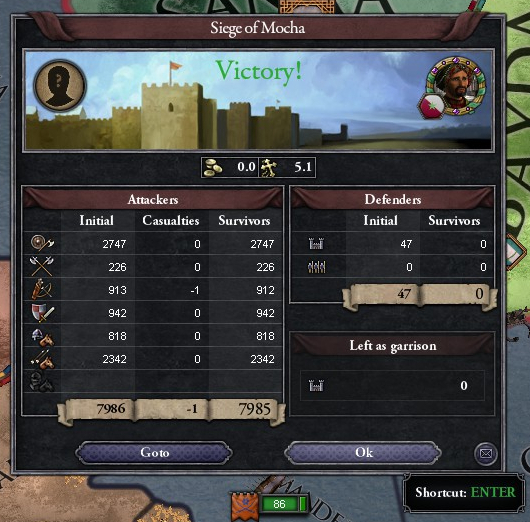  : Having heard the news while in Sinai, I had swiftly turned the boat around. I would try to avoid war for as long as I could. I do not stomach it well. : Having heard the news while in Sinai, I had swiftly turned the boat around. I would try to avoid war for as long as I could. I do not stomach it well.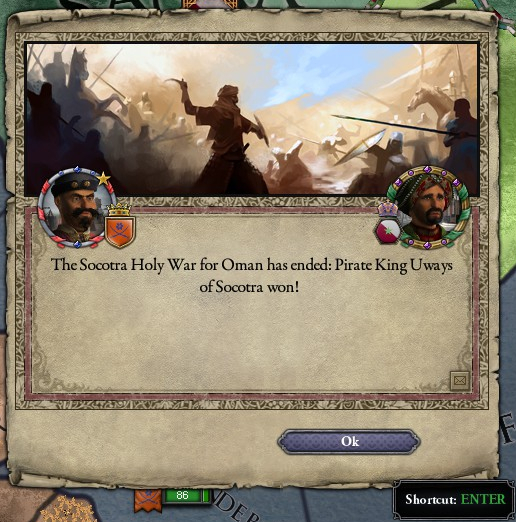  : I would sneak past the Socotran ships, still busy with the war against the Qalif. : I would sneak past the Socotran ships, still busy with the war against the Qalif.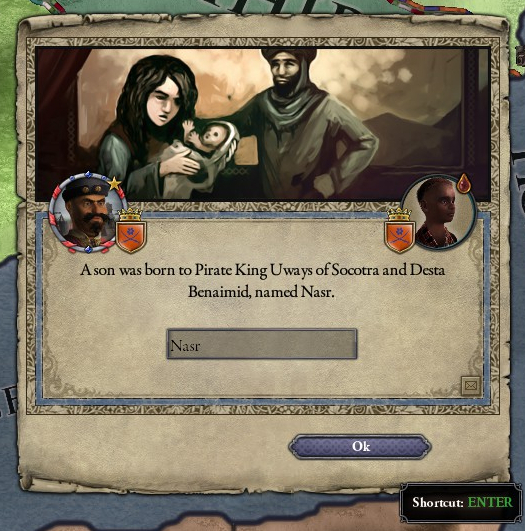  : After all, Uways was busy with war, and family. : After all, Uways was busy with war, and family.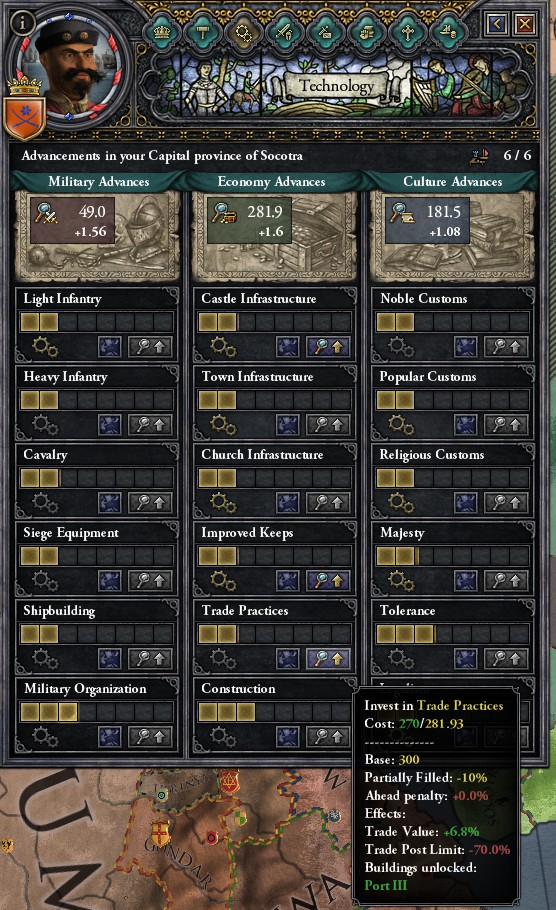  : He had no time to focus on honest trade. : He had no time to focus on honest trade.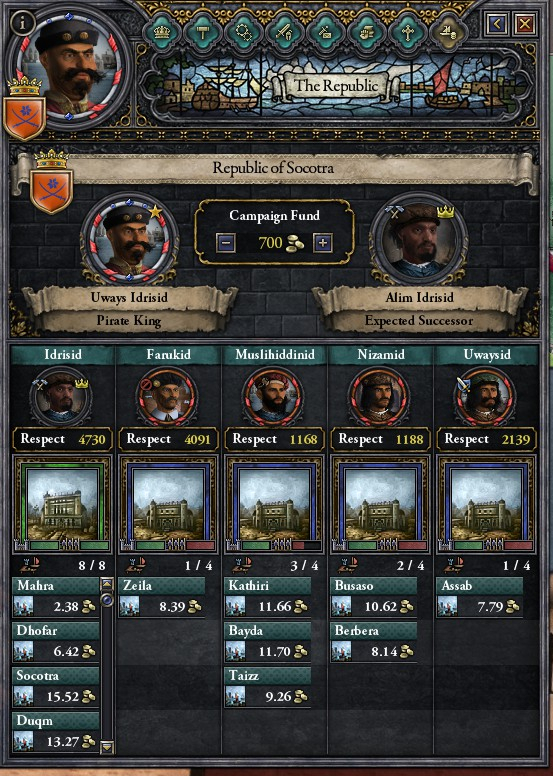  : I was wrong. My ship was intercepted by Alim's galley. He was returning to speak to his brother. It would seem I was a smuggler in their eyes, trading rare spices outside their nests. : I was wrong. My ship was intercepted by Alim's galley. He was returning to speak to his brother. It would seem I was a smuggler in their eyes, trading rare spices outside their nests. : Alim took me prisoder, and dragged me to the pirate court. He had given my stocks of saffron to the other pirate lords, as well as the Qalif's personal holy books, trimmed with gold and jewels, as gifts. It would seem he wished to be next in line after his brother. : Alim took me prisoder, and dragged me to the pirate court. He had given my stocks of saffron to the other pirate lords, as well as the Qalif's personal holy books, trimmed with gold and jewels, as gifts. It would seem he wished to be next in line after his brother. : And yet, despite all the stories I have heard of the pirates, I was treated well. Once Uways had heard that I was a citizen of the Solar Empire, and that my father had sailed from Socotra, I was welcomed at court. It seems I was a curiosity. : And yet, despite all the stories I have heard of the pirates, I was treated well. Once Uways had heard that I was a citizen of the Solar Empire, and that my father had sailed from Socotra, I was welcomed at court. It seems I was a curiosity.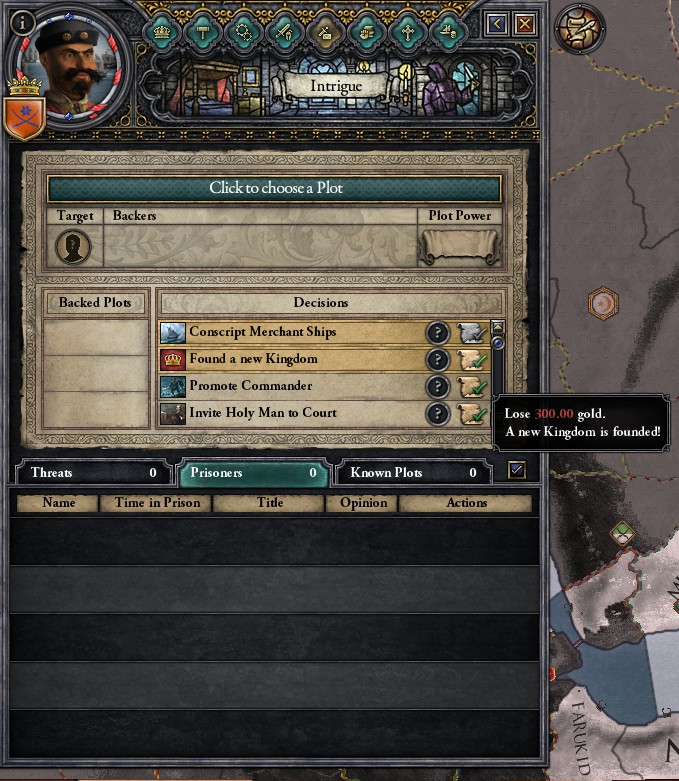  : I was present at the strangest ceremony. You see, the original five pirate lords were all dead. These were poor men, who had to claw and fight for their share in the world. They were true pirates, fearless, for they had nothing to lose. : I was present at the strangest ceremony. You see, the original five pirate lords were all dead. These were poor men, who had to claw and fight for their share in the world. They were true pirates, fearless, for they had nothing to lose. : Their sons, however, grew up as princes. They had a home port. They never hungered, or had to sleep under the stars. They commanded armies, and steered trade. Most barely pirated. : Their sons, however, grew up as princes. They had a home port. They never hungered, or had to sleep under the stars. They commanded armies, and steered trade. Most barely pirated. : And so, in 1005, the Pirate King Uways had declared the Most Serene Republic of Socotra. Their nests would bring honest commerce to far-reaching shores, and they would only take ships that threaten the spice trade. : And so, in 1005, the Pirate King Uways had declared the Most Serene Republic of Socotra. Their nests would bring honest commerce to far-reaching shores, and they would only take ships that threaten the spice trade.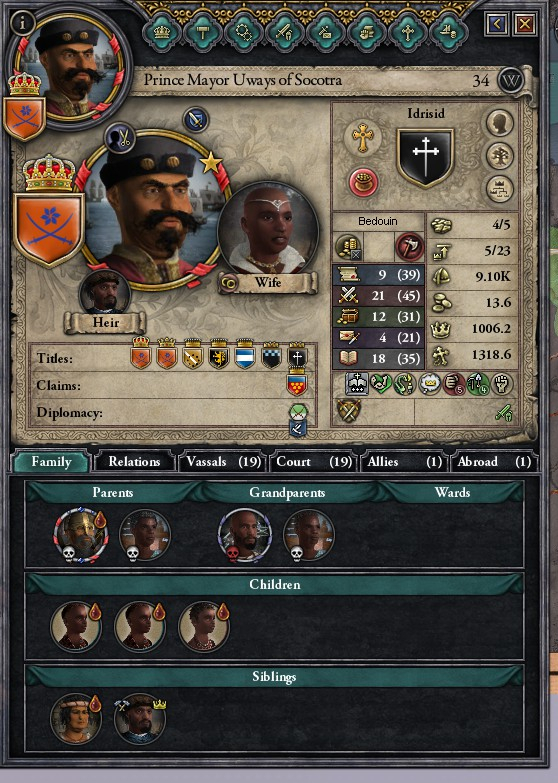  : I had seen the first Prince Mayor of Socotra take his throne. : I had seen the first Prince Mayor of Socotra take his throne.  : His first act as Prince Mayor was to entertain the republic. He had called for a grand tournament, open to all free sailors both on the Isle and the Arab territories. : His first act as Prince Mayor was to entertain the republic. He had called for a grand tournament, open to all free sailors both on the Isle and the Arab territories.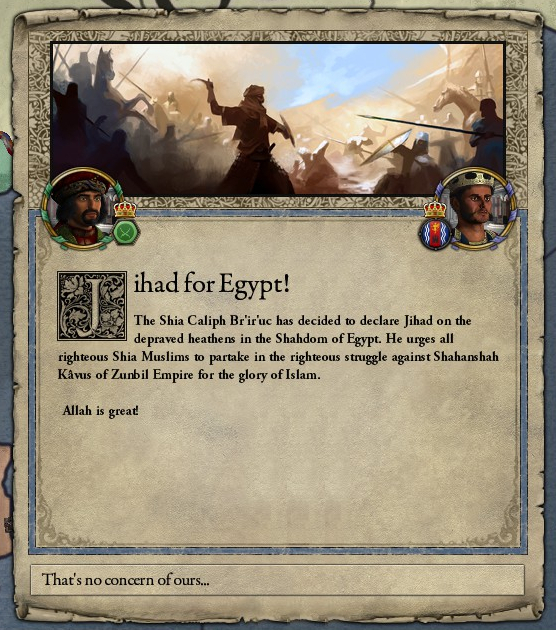  : As I dined with former pirates, the Empire was under attack. The Shia Qalif, with a strange and foreign name, had declared a great Jihad for Eedjipt. : As I dined with former pirates, the Empire was under attack. The Shia Qalif, with a strange and foreign name, had declared a great Jihad for Eedjipt.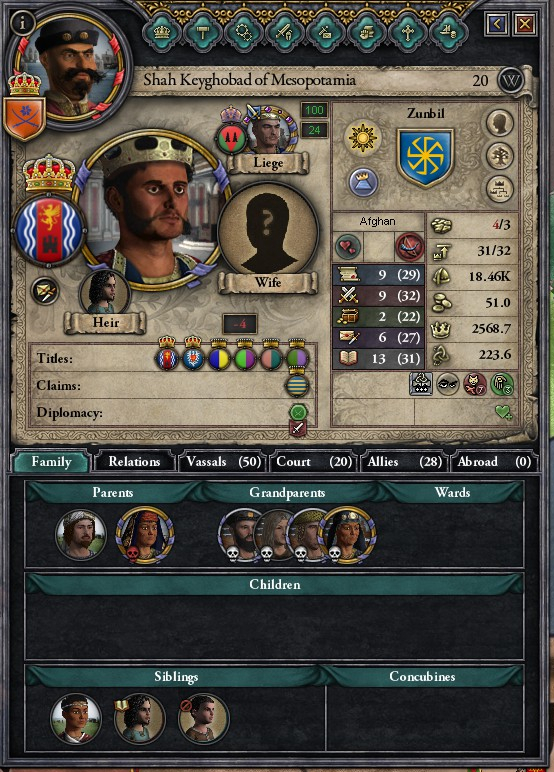  : The land itself went to the Shah of Mesopotamia. A Zunbil, of course. You couldn't be so much as a city clerk without being a Zunbil in the Empire. : The land itself went to the Shah of Mesopotamia. A Zunbil, of course. You couldn't be so much as a city clerk without being a Zunbil in the Empire.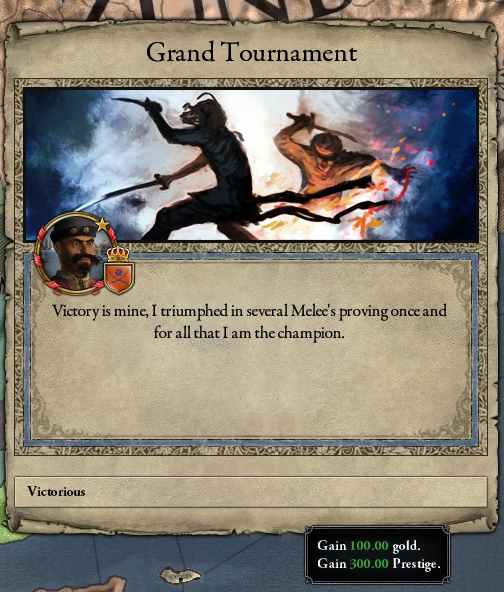  : And yet, as the Jihad continued, I was watching Uways fight in his own tournament. On camel-back, on a beached ship, and in the melee ring, none were his equal. The Prince Mayor was still a Pirate King at heart. : And yet, as the Jihad continued, I was watching Uways fight in his own tournament. On camel-back, on a beached ship, and in the melee ring, none were his equal. The Prince Mayor was still a Pirate King at heart.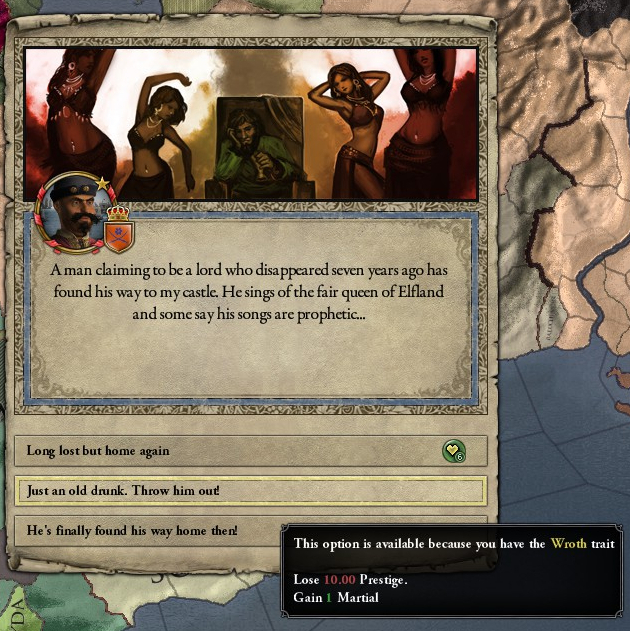  : During his tournament, a minor noble, who used to serve under the emir had appeared. He thought Uways would grant him hospitality. He was sorely mistaken. : During his tournament, a minor noble, who used to serve under the emir had appeared. He thought Uways would grant him hospitality. He was sorely mistaken.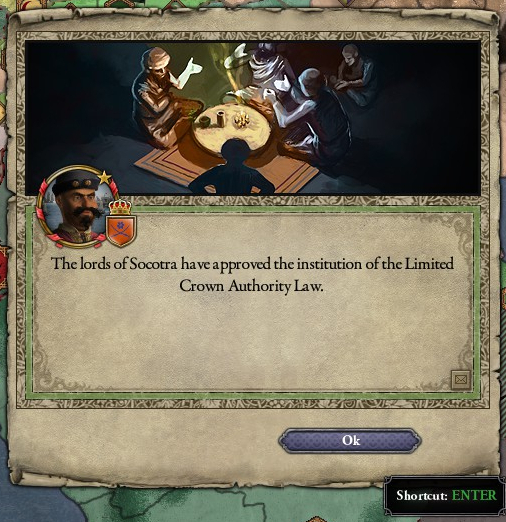  : With the tournament over, and his subjects in awe of him, the Prince Mayor set off to work. He had given out Oman to a man unrelated to any of the pirate lords, and named him Lord Mayor. In return, he would steer most of his trade towards the Isle. : With the tournament over, and his subjects in awe of him, the Prince Mayor set off to work. He had given out Oman to a man unrelated to any of the pirate lords, and named him Lord Mayor. In return, he would steer most of his trade towards the Isle. : The Sanaan lands remained with the Idrisid family, untouched by the republican succession. : The Sanaan lands remained with the Idrisid family, untouched by the republican succession.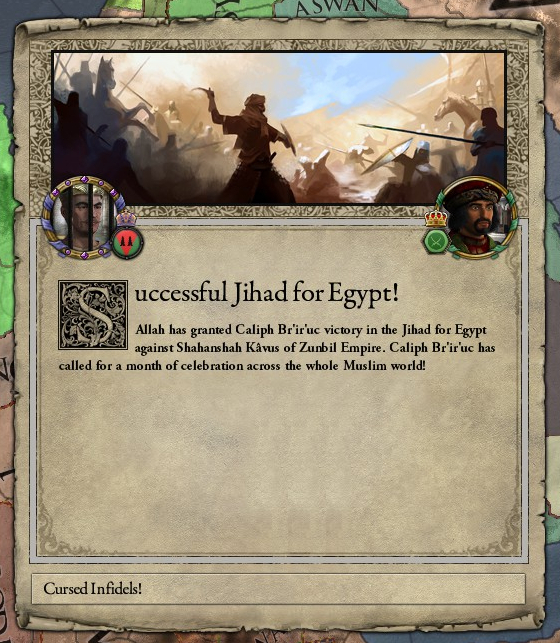  : The Jihad was swift and brutal. The Zunbil Shahanshah was caught on the battlefield, and forced him to surrender Eedjipt. The Shia realms expanded. : The Jihad was swift and brutal. The Zunbil Shahanshah was caught on the battlefield, and forced him to surrender Eedjipt. The Shia realms expanded.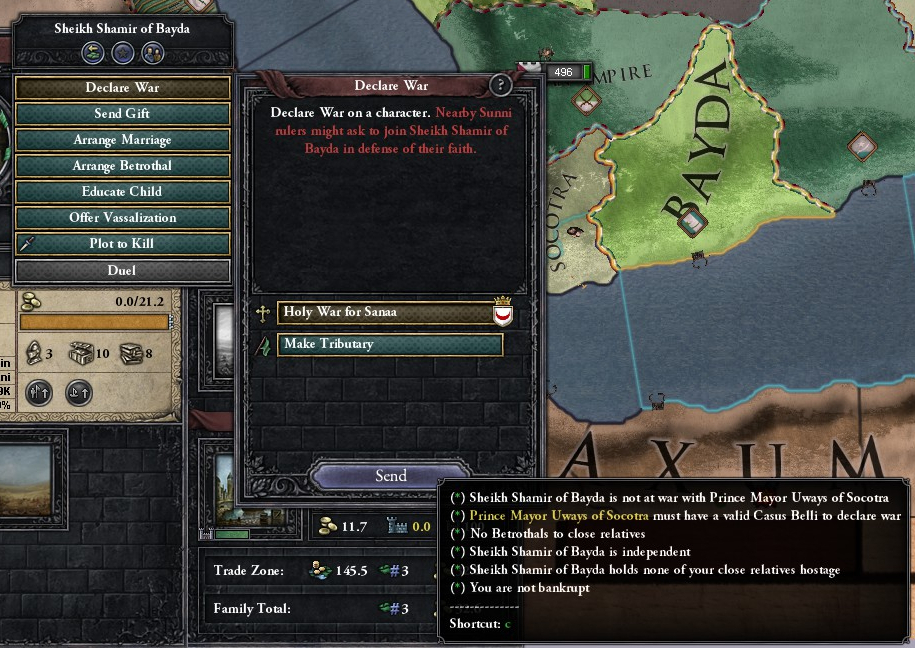  : Uways had looked at his maps, and had decided that all of Sanaa should belong to the Idrisids, not just the south-west. And so he went to war on Bayda. : Uways had looked at his maps, and had decided that all of Sanaa should belong to the Idrisids, not just the south-west. And so he went to war on Bayda.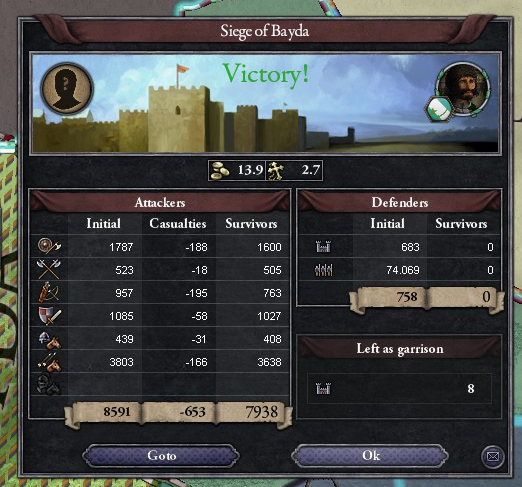  : Not him personally, of course. This was far too small a skirmish to warrant his attention. : Not him personally, of course. This was far too small a skirmish to warrant his attention.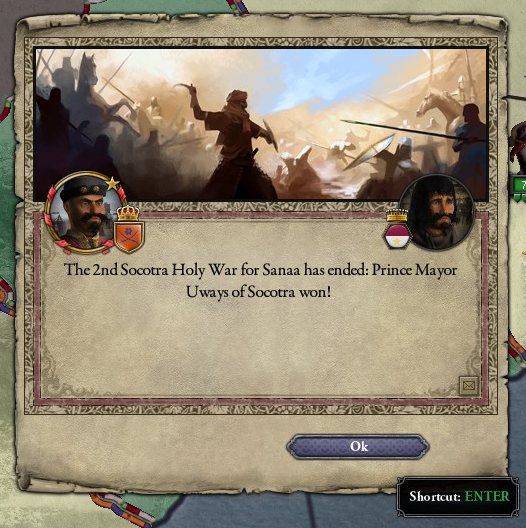  : Bayda fell within the year. I studied navigation under the Muslihiddinids. : Bayda fell within the year. I studied navigation under the Muslihiddinids.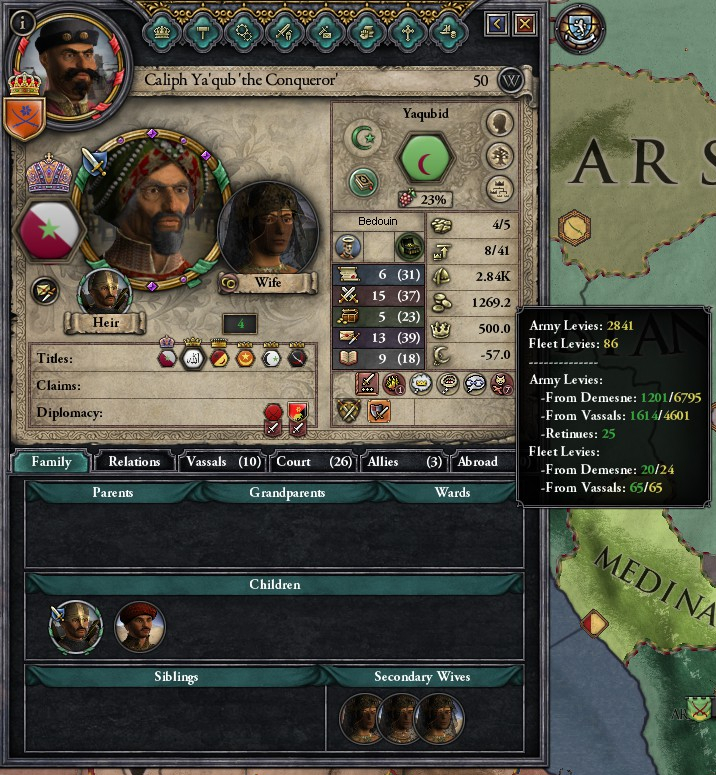  : As news of Bayda's surrender reached us, so did news of the Qalif. It seems as if a revolt against the previous Qalif's tyranny had succeded, and a new man guided the souls of the Sunnis. : As news of Bayda's surrender reached us, so did news of the Qalif. It seems as if a revolt against the previous Qalif's tyranny had succeded, and a new man guided the souls of the Sunnis.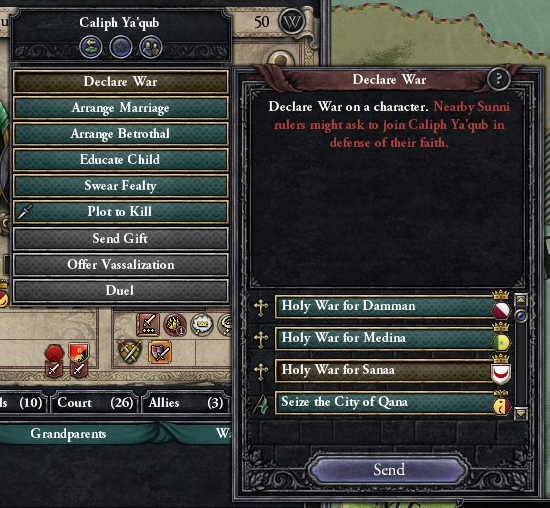  : Uways quickly declared that he had no treaties signed with the new Qalif, and sent his camels to the boats. I was to accompany him. : Uways quickly declared that he had no treaties signed with the new Qalif, and sent his camels to the boats. I was to accompany him.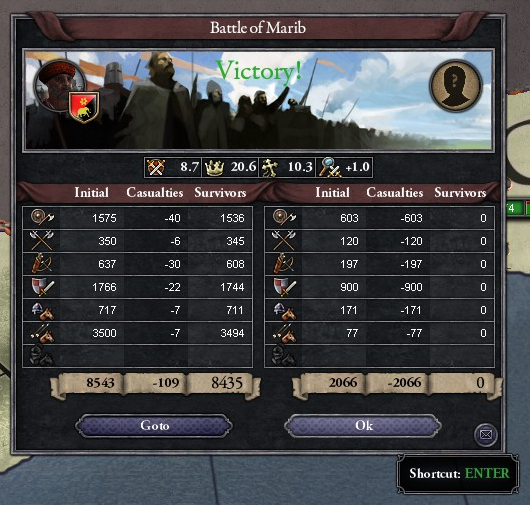  : I had seen a camel marine landing first hand. A terrifying sight. The enemies kept on screaming, even after they had been cut down. : I had seen a camel marine landing first hand. A terrifying sight. The enemies kept on screaming, even after they had been cut down. : That's the camels. : That's the camels.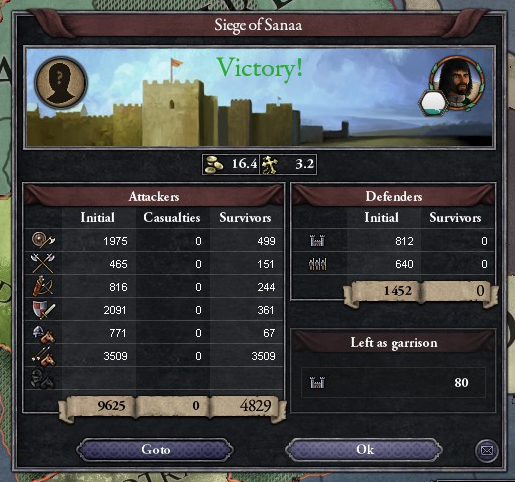  : Sanaa itself fell quickly to us. : Sanaa itself fell quickly to us.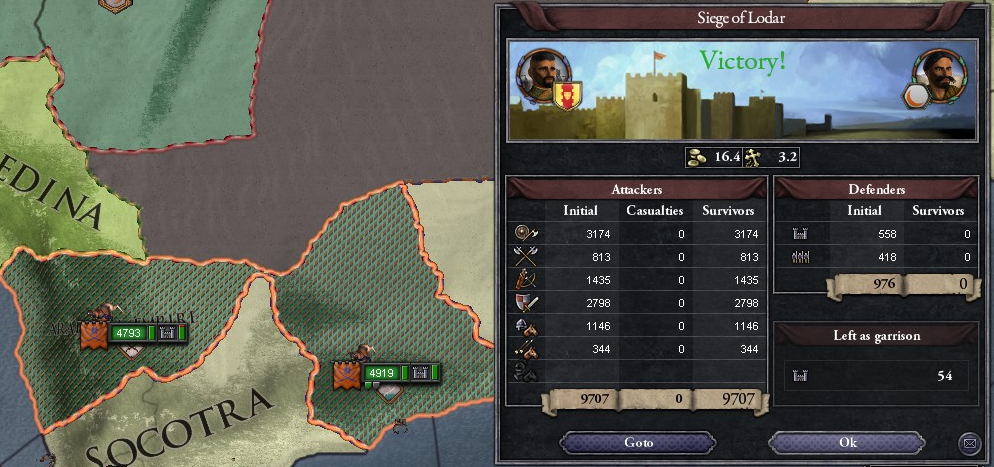  : But the new Qalifs refused to surrender. The war dragged on. : But the new Qalifs refused to surrender. The war dragged on.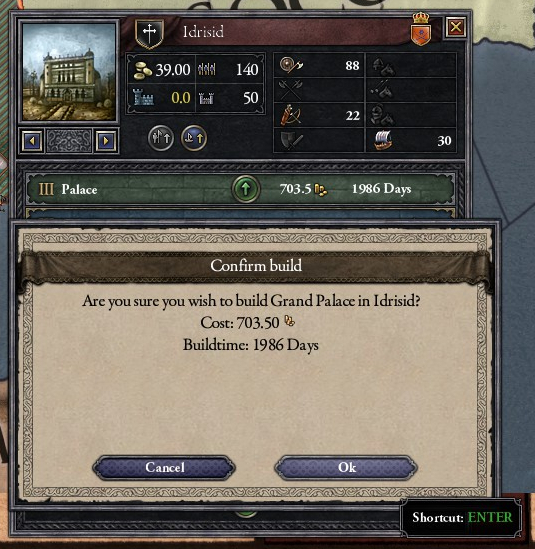  : In honour of the greatness of the House of Idris, Uways had expanded the family palace. When complete, it would be the grandest palace for thousands of miles. Even the Greek palaces in Konstantiniyye would pale before it. : In honour of the greatness of the House of Idris, Uways had expanded the family palace. When complete, it would be the grandest palace for thousands of miles. Even the Greek palaces in Konstantiniyye would pale before it.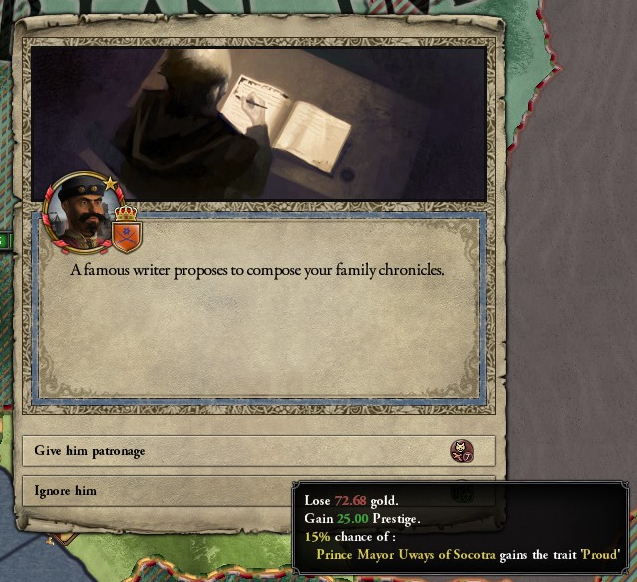  : He had also hired a great poet to sing verse about the Idrisids. Unlike his father, though, he did not have him thrown out of a window. : He had also hired a great poet to sing verse about the Idrisids. Unlike his father, though, he did not have him thrown out of a window.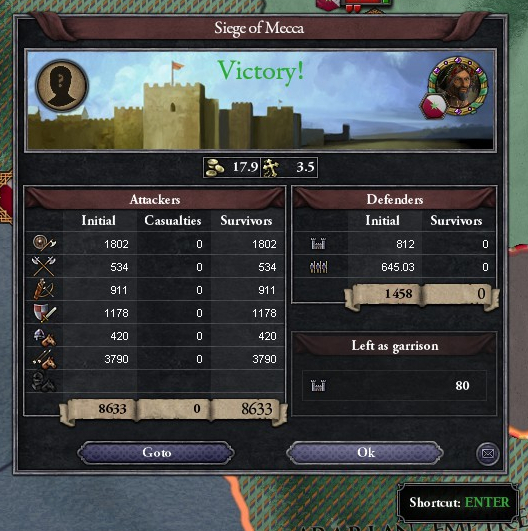  : With domestic affairs settled, he had taken his armies north, and took the Muslim holy city of Mekkah. : With domestic affairs settled, he had taken his armies north, and took the Muslim holy city of Mekkah.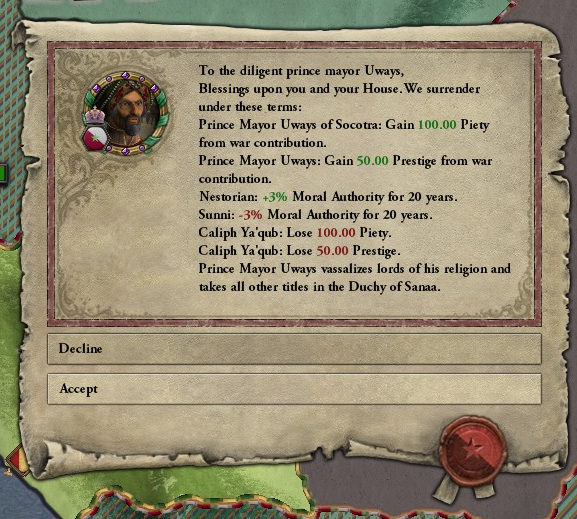  : The Qalif surrendered when he heard his holiest of holies had been taken by the Nesters. : The Qalif surrendered when he heard his holiest of holies had been taken by the Nesters.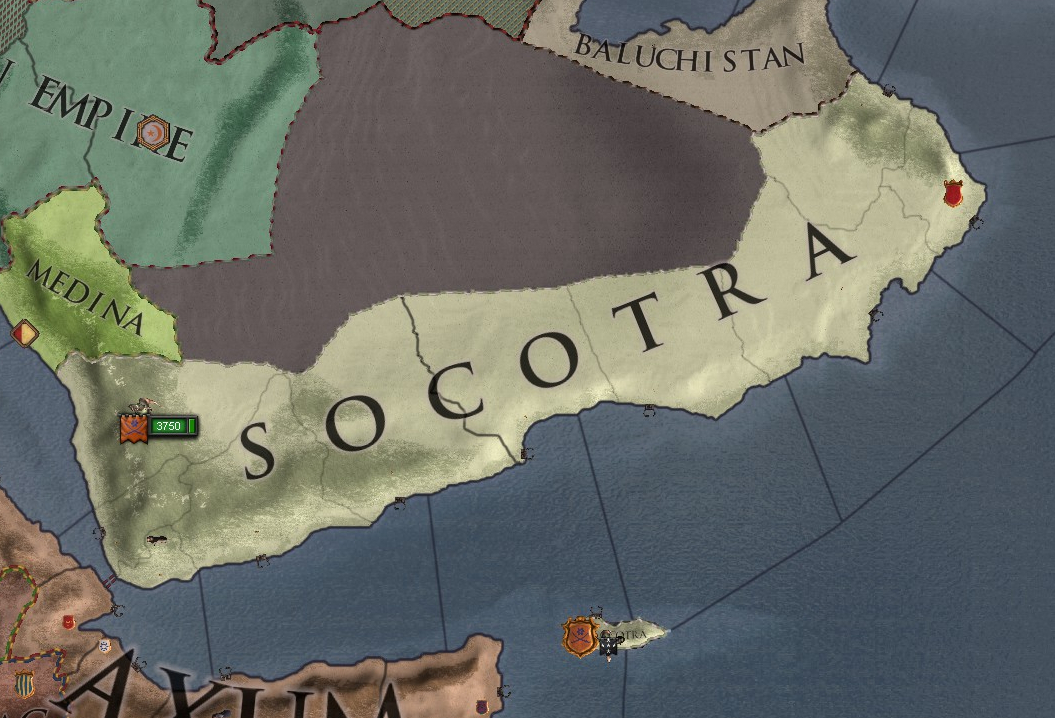  : The Grand Republic of Socotra grew. : The Grand Republic of Socotra grew.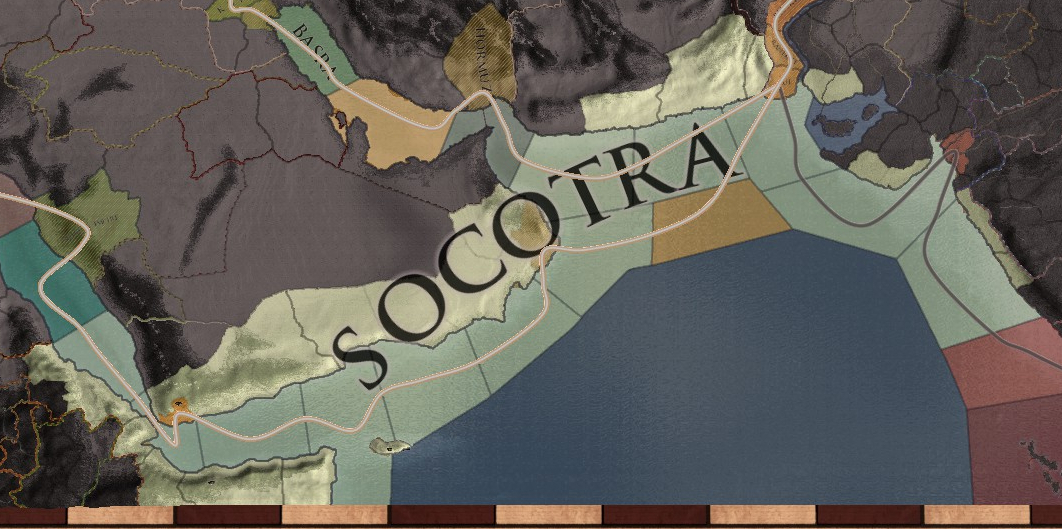  : As did their trade. Idrisid nests reached as far as Goa. : As did their trade. Idrisid nests reached as far as Goa.  : The Eastern trade flowing freely into Socotra. : The Eastern trade flowing freely into Socotra.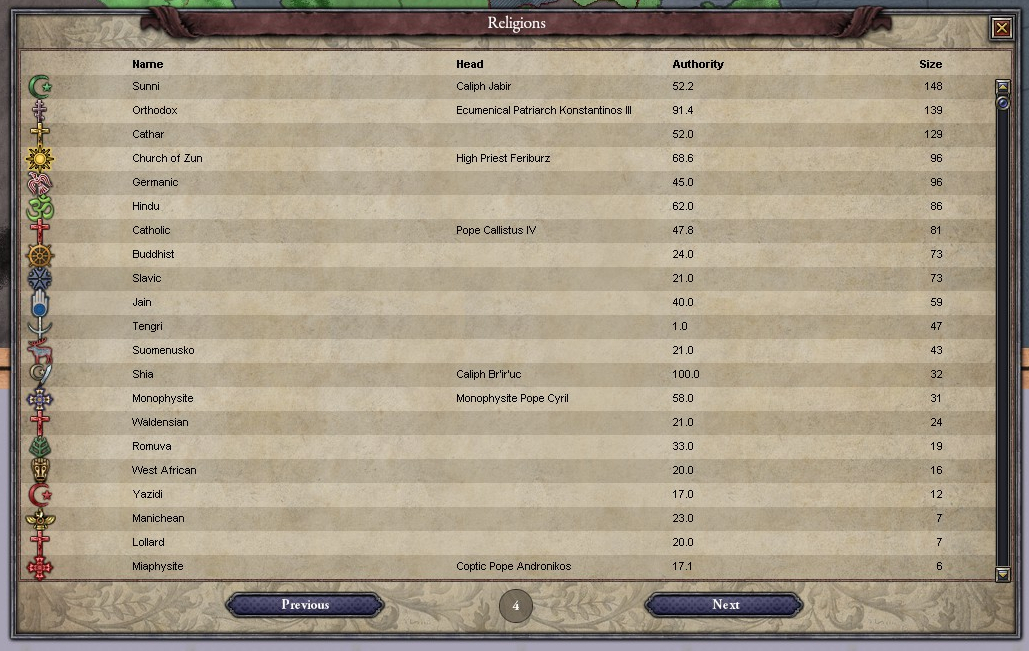  : And yet, they remained the last Nesters in the world. Even as the Church of Zun, Shia and the Katharoi grew. : And yet, they remained the last Nesters in the world. Even as the Church of Zun, Shia and the Katharoi grew.The boat finally reaches the galley, and the Caravan slowly comes aboard. Ulfr stands at the helm, as Amir plotted a course.  : Where to? : Where to? : We'll figure it out. Take us out to sea. : We'll figure it out. Take us out to sea.
|
|
|
|
We created a Zunist monster. 
|
|
|
|
Well, we did, but then it lost egypt.
|
|
|
|
NewMars posted:Well, we did, but then it lost egypt. Which apparently only happened because the emperor was captured in battle, doesn't mean they can't take it back.
|
|
|
|
Caliph Br'ir'uc eh? What an interesting name.
|
|
|
|
So here's the deal. I found my old tablet, but the drivers are all hosed for Windows 10, so it's not working yet. Until I get it fixed, we'll get no more Amir sketches, because I just don't have the time to do them by hand anymore.
|
|
|
|
The real crimes of the Zunists are those borders 
|
|
|
|
Hurrah for the pirate king! (I could not get that song out of my head the entire update.)
|
|
|
|
RabidWeasel posted:The real crimes of the Zunists are those borders I know! They took neither Baluchistan nor Bagdad. Weirdos. Still spreading like a cancer, though. The Mongols can't come soon enough.
|
|
|
|
Kayten, are you planning on continuing this into EUIV? I think you really should, your writing is top notch and the world created is interesting. Modding the game to make the LP more interesting is also a really good sign.
|
|
|
|
Yeah it'd be cool to maintain the whole century switching routine, though maybe you'd have to move to a different storytelling bit.
|
|
|
|
Oh poo poo, yeah, I should probably update the LP from time to time. Uhhhh, y'all wanna learn about some pirates? History Update 14 - From Greece to India So, last time we took a look at Nestorianism (and general Christianity development until it became the established religion of the Roman Empire). Today, let's see what early pirates are like. Basically, pirates have been around since we had boats that were used to trade things. The earliest written mention of piracy I can find is in the Mediterranean, so we'll start with that. 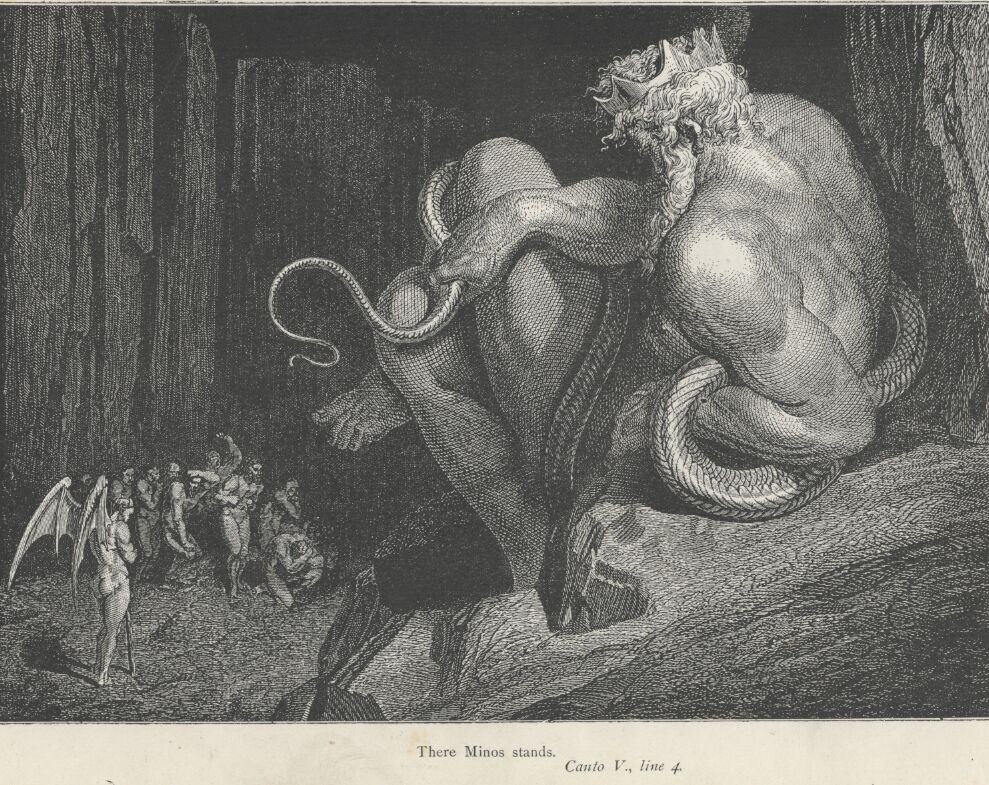 King Minos of Crete, all-around rear end in a top hat, seen here directing souls in hell A lot of stuff this early on is at least semi-legendary, but gently caress it, we'll take it at face value. In around 1900 BCE, the king of Crete was Minos, son of Zeus and Europa. The man did a lot of super lovely things: screwed Poseidon out of a deal, leading the god to curse his wife with some good old-fashioned bull-loving; hired Deadalus to build a labyrinth to hide the bull love child, named Asterius; kidnappeda diviner named Polyidus, and forced him to train his born-again son in divination; got his enemy's daughter named Scylla to fall in love with him and kill her daddy for him; executed Scylla for betraying her father by tying her to boat and sailing out, until she drowned. Anyway, that rear end in a top hat over there is credited by Thucydides, a Greek historian, as the first man to field a proper navy. Thucydides was a pretty cool dude, having written one of the first historical texts in Western canon: The History of the Peloponnesian War. I'm gonna quote him here: "For Minos was the most ancient of all that by report we know to have built a navy. And he made himself master of the now Grecian Sea, and both commanded the isles called Cyclades and also was the first that sent colonies into most of the same, expelling thence the Carians and constituting his own sons there for governors; and also freed the seas of pirates as much as he could, for the better coming in, as is likely, of his own revenue." - Thucydides, "The History of Pelopennesian War" 1.4 The Carians that Thucydides talks about, after being driven from their homes by Minos, became notorious pirates in Aegean Sea. The sea was fantastic for piracy: plenty of small, rocky islands with hidden coves to settle as lairs. Since the area was dotted with these islands, trade routes became more or less fixed. Large ships, burdened with goods had to navigate the reefs and cliffs carefully, making them easy prey for pirates. 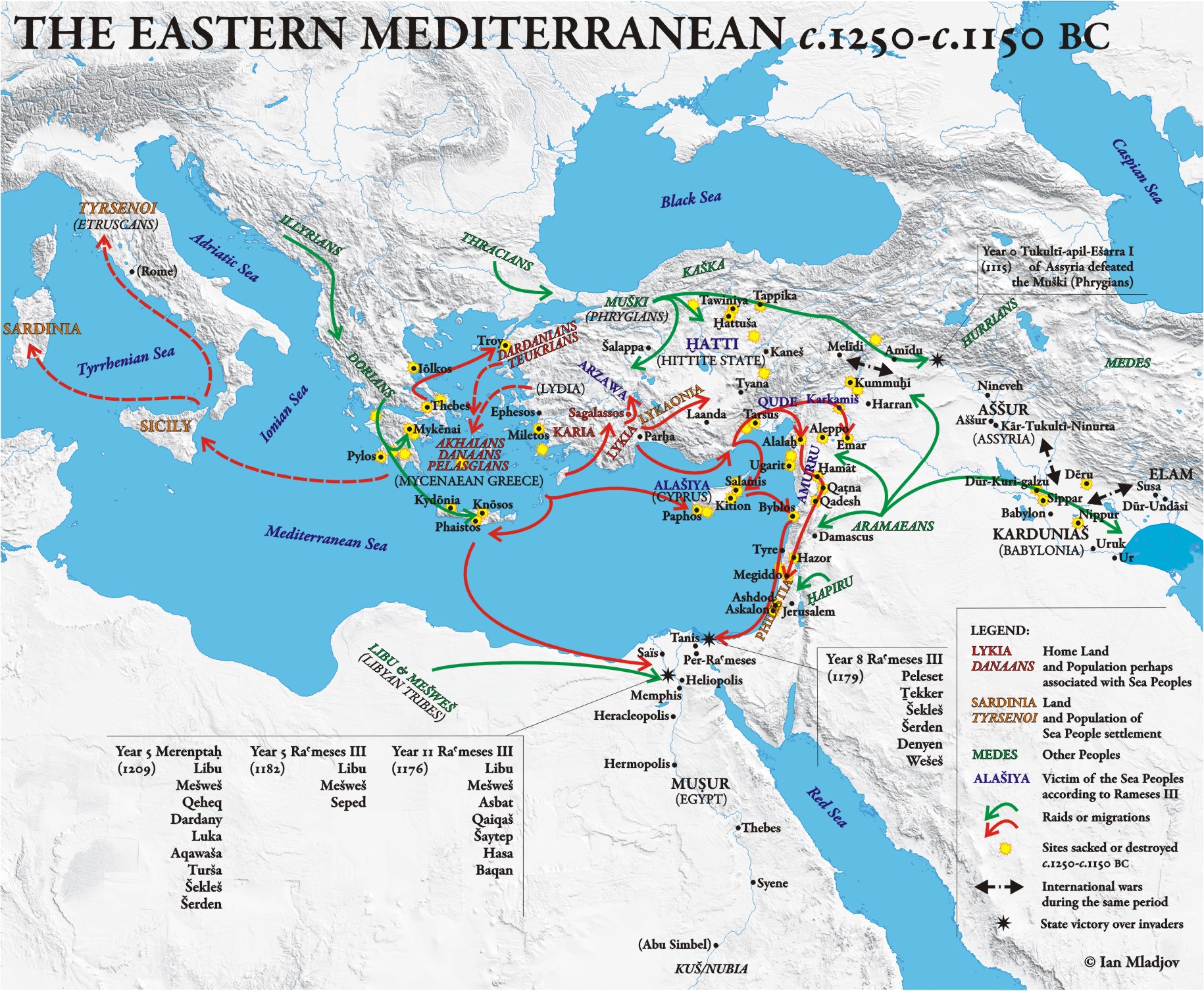 Map of Sea Peoples' raids over the Mediterranean Eventually, around 1200 BCE, rather than remaining independent ship raiders, the various migratory populations with a knack for seafaring have started to band together into a confederation. We call those Sea Peoples, since 19th century French archeologists have no imagination. As you can see from the above map, the Sea Peoples welcomed a lot of very varied tribes, from Siculi in Sicily, to Achaeans in Greece, to the Lukka in Anatolia, to Philistines in the Levant. These tribes banded together to raid the larger, more sedentary civilizations, such as the Hittites and New Kingdom Egyptians, and they got very good at it. For a while, the Sea Peoples were used as very valuable mercenaries, sometimes even likened to early privateers. The rest of Greece didn't remain far behind. Piracy became not only commonplace, but even somewhat prestigious. Famous Greek pirates from around this time even include Odysseus and his crew. For centuries, the Sea People attacked trade vessels. 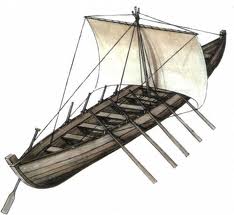 A lembos, an Illyrian pirate galley, used circa 250 BCE With very little effort by the various kingdoms around the Eastern Mediterranean to quash piracy, trade suffered immensely. Some states, such as Illyria and Cilician city states, became pirate havens. Piracy became so profitable, that Illyrians even designed galleys, specifically made for taking ships. Very mobile, it still had enough space for fifty men on top of the rowers, having dedicated boarding parties. Illyria, under queen Teuta, became so bold that they started harassing Roman grain shipments. Rome sent two envoys to demand that Teuta stop messing with Roman business. Teuta responded by killing one of the envoys, and Rome did what Rome did best: conquer more territory in a defensive war. At this point, Roman hegenemony over the Mediterranean started showing, and the City of Light started taking piracy seriously. After the First Illyrian War with Teuta, Rome declared pirates "enemies of all mankind", and instituted harsh punishments for those found to practice piracy. As a result, slave ports, a major buyer of raid captives began to dwindle down, and pirates began focusing on ransoming high-value prisoners. For example, in 78 BCE, Cilician pirates captured a Roman galley near Rhodes. On board they found a 25-year old Roman military man named Julius Caesar. When they demanded a ransom of 20 talents for his release, Caesar laughed, and insisted they ask for 50 talents instead. As the pirates waited for the ransom to be delivered, he joked around with his captors, promising them he would punish them on release. When the ransom arrived and Caesar was set free, he raised 500 legionaries, captured the pirate fleet, and reclaim his money. He then had every single one of them crucified. Showing a bit of mercy, he had their throats cut first. 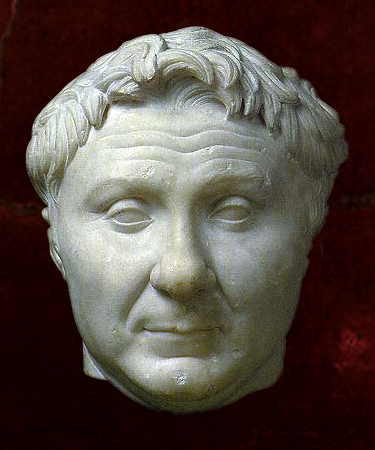 Gnaeus Pompeius Magnus, member of the First Triumvirate, the man that ended piracy in the Mediterranean In 67 BCE, the Roman port of Ostia was sacked and burned by Cilician pirates, with two Roman senator captured for ransom. The Republic has had enough of this pirate nonsense, and passed Lex Gabinia, a law that gave Pompey unlimited access to the Roman treasury, practically the entire Roman navy, and 125,000 men for the purpose of rooting out all pirates that threatened Rome. By 66 BCE, no pirate strongholds remained. Pompey captured 400 ships, and destroyed over a thousand. He returned to Rome, hailed as 'primus inter pares', first among equals. Then some stuff with Caesar and Crassus happened, but that's outside the scope of this post. Pompey was surprisingly merciful to his pirate captives: he had killed as many as ten thousand in battle, but all the pirates that surrendered were given land far removed from the seas, and a full pardon. He had tried to address the root cause of piracy at this point: desperation. Honestly, he pretty much completely succeeded. No major pirates threats showed up in the Mediterranean until the collapse of the Western Roman Empire. 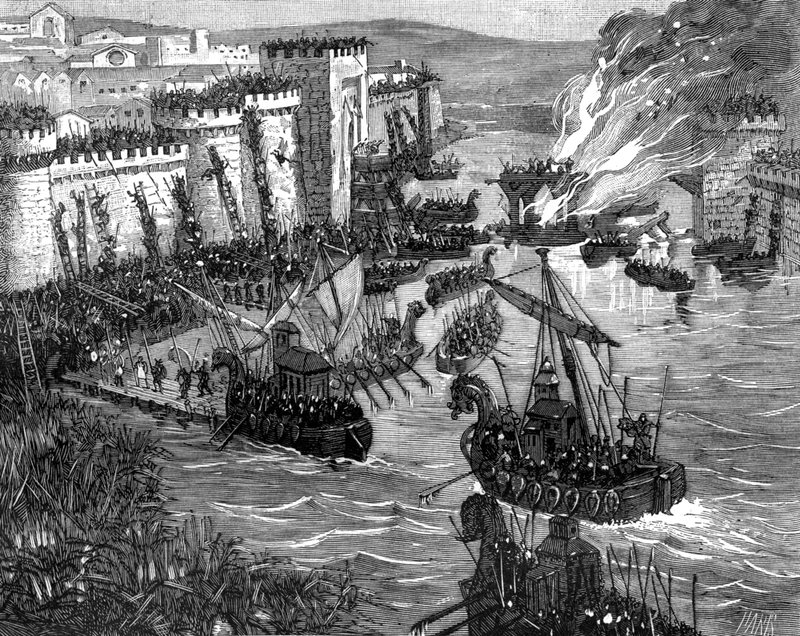 The siege of Paris by the Norsemen, 845 By the ninth century, Europe was facing a pirate problem from several fronts. In the north, the Viking Age has started, and longships flew from the Baltic to Seville, on the coasts and along the rivers. Notable viking raids: pretty much the entirety of England (793-1066), Paris (845, 885), Seville (844). Honestly, the Vikings are interesting enough to get their own history updates, which I will do if any of you guys actually vote for a Germanic nation. The Norsemen were not the only pirate threat in the north, however. Starting in the 11th century, the Baltic Slavs raided Danish ships, aiming at controlling Wendish trade. This continued until the Wendish Crusade in 1147, which eliminated the pirates' power base. However, Baltic piracy had a resurgence in 13th century, when the Hansa's trade routes got raided so frequently that the league nearly seized to exist. In 1394, a privateer company called the Victual Brothers even occupied Gotland, turning the island into a major pirate haven. 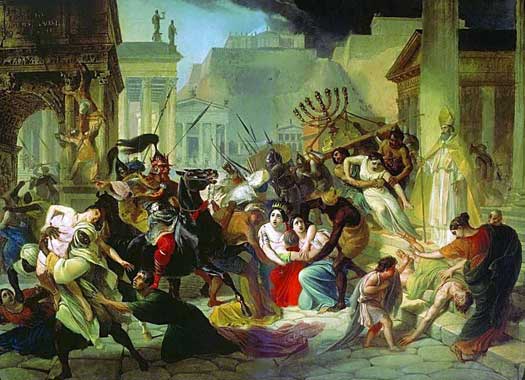 The Arab sack of Rome, 846 CE In the south, Moor pirate havens popped up in southern France and Northern Italy. The Arabs captured Sicily, and raided Italy, going as far as sacking Rome in 846. Arab pirate bases included the Baleares, and Crete. From there, the entire Mediterranean was a target. In Dalmatia, a Slavic tribe called Narentines pillaged the Adriatic, making life incredibly difficult for Venice. From 846, with an alliance with the Arabs, Venice was regularly tag-teamed by the pirates, eventually forcing action from the Byzantines, which did nothing. Venice was raided until the 11th century. 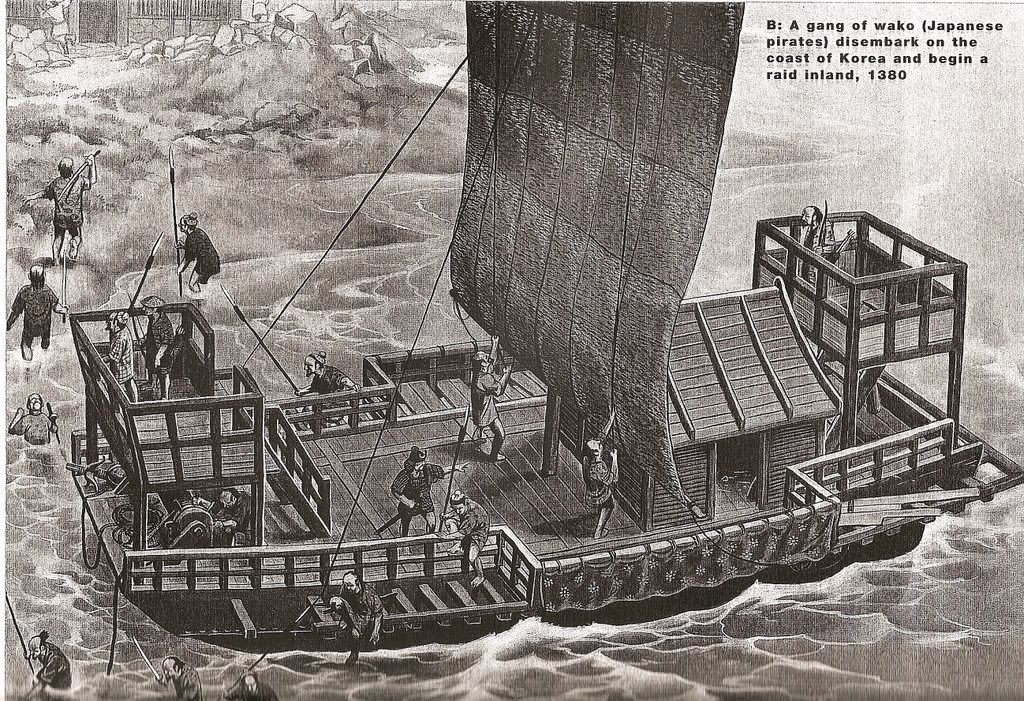 A wako pirate ship raiding Korea, 1380 gently caress the Mediterranean, though. Asia has had its major share of piracy. From the 13th century until about the 16th century, Wokou pirates terrorized the Yellow Sea. Originally settled on the southern Japanese islands, they raided Japan, China and Korea. China in particular took a very unpleasant view of the pirates, sentencing the captured men to be boiled alive. The Koreans had even sent enoys to southern Japan to launch a joint operation on the pirate strongholds in 1377. The pirates resurged in the 16th century, this time no longer mostly Japanese. The Ming court didn't particularly care about this detail, continuing to refer to them as Wokou (literally "dwarf/Japanese bandits"). The Ming, thoroughly corrupt at this point, was not particularly good at stopping the raids, however. 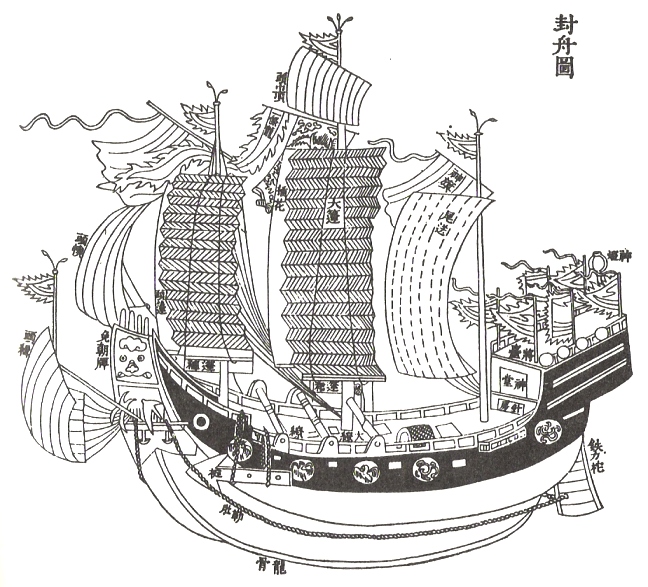 The junk, a ship used by the former Yuan navy, turned pirate in the 14th century In 1293, Kublai Khan, first emperor of the Yuan dynasty, and grandson to Genghis Khan, attempted to invade Java. The expedition ended in failure, stranding a large fleet in South-East Asia, with no partiuclar desire to go home. Former Mongol captains had settled near river estuaries in what is now Indonesia, originally for defense, and later to raid the spice trade. 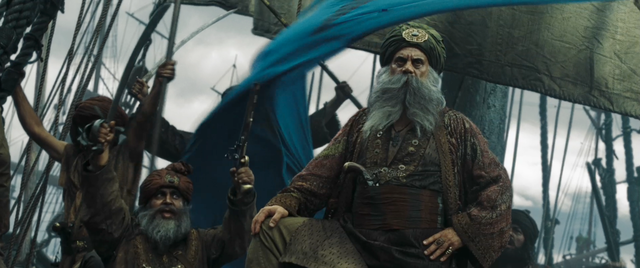 Timoji, a 16th century Hindu privateer In southern India, piracy thrived in 15th and 16th century. Southern India was split between the Bahmani Sultanate to the west and the Vijayanagara Empire to the east. Their non-stop wars required constant supply of horses, which were brought by ship from Persia and Africa. The western coasts became a haven for pirates that preyed on these routes. Later, in 17th century, Portugese pirates frequently captured Mughal ships heading west on the Hajj to Mecca, leading to several Mughal-Portuguese wars. We will end the update here, since it's run a bit long as is. Next time, we'll take a look at the Caribbean, Barbary corsairs, and more modern outbursts of piracy. TL;DR: Where there are boats, there are pirates, from Portugal to Japan. Kayten fucked around with this message at 09:18 on Oct 13, 2015 |
|
|
|
mcclay posted:Kayten, are you planning on continuing this into EUIV? I think you really should, your writing is top notch and the world created is interesting. Modding the game to make the LP more interesting is also a really good sign. That's the plan! The biggest obstacle is actually being busy lately, sorry about that. That, and the fact that I'm new at modding (shoutout to Hitler's Gay Secret for helping out). And really bad at EUIV. Observe: 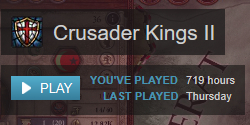 vs. 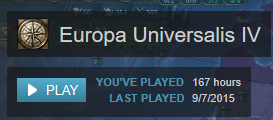 I'm hoping to get to Victoria, because Victoria is awesome, I'm less awful at it compared to EU4, and I really want to see Communist Zunbils. But that's pretty far down the line. Game update Thursday night for sure, though. ed.: Oh! And the game really doesn't like me switching countries. It's already pretty slow, and we're only 250 years in. Can't wait for ten minutes/year! Kayten fucked around with this message at 09:20 on Oct 13, 2015 |
|
|
|
I think the best thing about the Caesar and the pirates story is that he started reading speeches and poetry to them. He also called anyone that didn't appreciate his talents illiterate savages.
|
|
|
|
Film Update 14 - A Bad Intro to Soviet Film Today, we're going to take a look at the most watched Soviet film of all time. Let's dive into a pretty average 70s action flick. 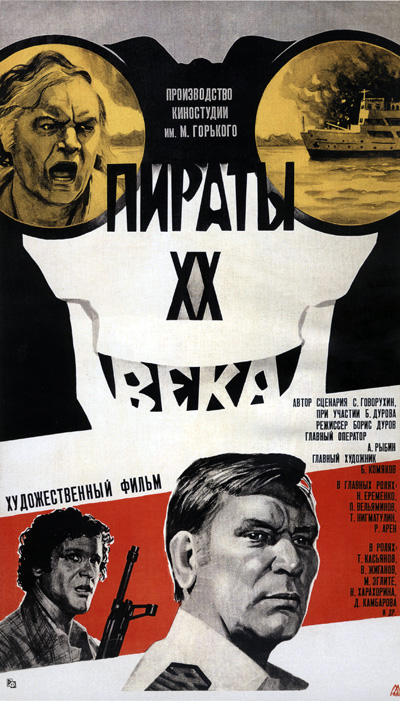 Before 1979, there were no modern action films in the USSR. I mean, Elusive Avengers came out in 1967, but that was more of an adventure film than anything. In 1980, the first proper action film, with martial arts, foreign criminals and evil drug dealers was shot by Boris Durov. Pirates of the Twentieth Century ("Пираты XX-ого века") was the first matrial arts film that an average Soviet citizen saw. We follow a crew of a Soviet merchant marine ship transporting opium. They ships gets boarded and raided, but they escape in a lifeboat, and veentually find a small island the pirates use as a base. Realizing that their only option is to steal the pirates' ship from them, they conscript the natives to help them beat back the evil men. 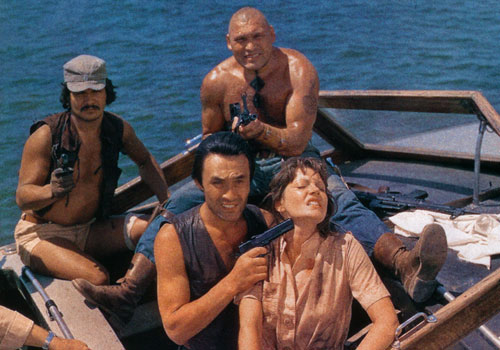 Honestly, this isn't that bad a movie. It's decidedly average. It's got martial arts, explosions, and a very chaste romance going for it, because, you know, USSR. The thing is, this film was massively successful. Like, 'one in three USSR citizens saw it' successful. 120 million people bought movie tickets. People just coming back to the theatre, and this thing ran for a decade. People still love it. It's like if, say, Bloodsport (1988) was seen by half the American population. I just find it bizzare is all. Uh, if you like staged fights, Pacific island natives that speak perfect Russian, and a ship with Lenin's portrait on the bridge, check it out, I guess. There are far better Soviet films, though. SovFilm edit: You can now watch the whole movie with English subtitles here. Kayten fucked around with this message at 07:11 on Sep 4, 2016 |
|
|
|
Kayten posted:People still love it. It's like if, say, Bloodsport (1988) was seen by half the American population. You make it sound like half the American population hasn't seen Bloodsport. If only this would be released on Netflix... 
|
|
|
|
Update 15 - The Eastern Nests The pigrims wake in their cots below deck to loud voices. They make their way to the deck itself. It would appear that Amir and Ulfr are having a heated argument.  : A ship's name is important, Ulfr! : A ship's name is important, Ulfr! : It is. Has to be good. : It is. Has to be good. : What about "The Fruits of Bravery" do you hate so much? : What about "The Fruits of Bravery" do you hate so much?Ulfr's eye twitches ever so slightly.  : Many things. Most. : Many things. Most. : Well, what's your suggestion, then? : Well, what's your suggestion, then? : Aegir. Seas are his. We give him honour. He gives us bounty. : Aegir. Seas are his. We give him honour. He gives us bounty. : Fine! Whichever backwards god you want to name this great vessel after is alright with me. But these people! These brave people, our comrades, what will they think about sailing under a pagan flag? : Fine! Whichever backwards god you want to name this great vessel after is alright with me. But these people! These brave people, our comrades, what will they think about sailing under a pagan flag?The caravan mulls about, unwilling to join such a petty argument. Finally, Amir throws his hands into the air.  : So be it! We are sailors on The Aegis. : So be it! We are sailors on The Aegis. : Aegir. No 'the'. : Aegir. No 'the'.Amir's face grows red.  : Amir. Let's not argue. Tell more of your travels. : Amir. Let's not argue. Tell more of your travels.At the thought of a captive audience, Amir's anger dissipates in an instant.  : So I shall! : So I shall!As Amir spins his tale, Ulfr has the time to adjust the sails, and set course for new lands in the south. 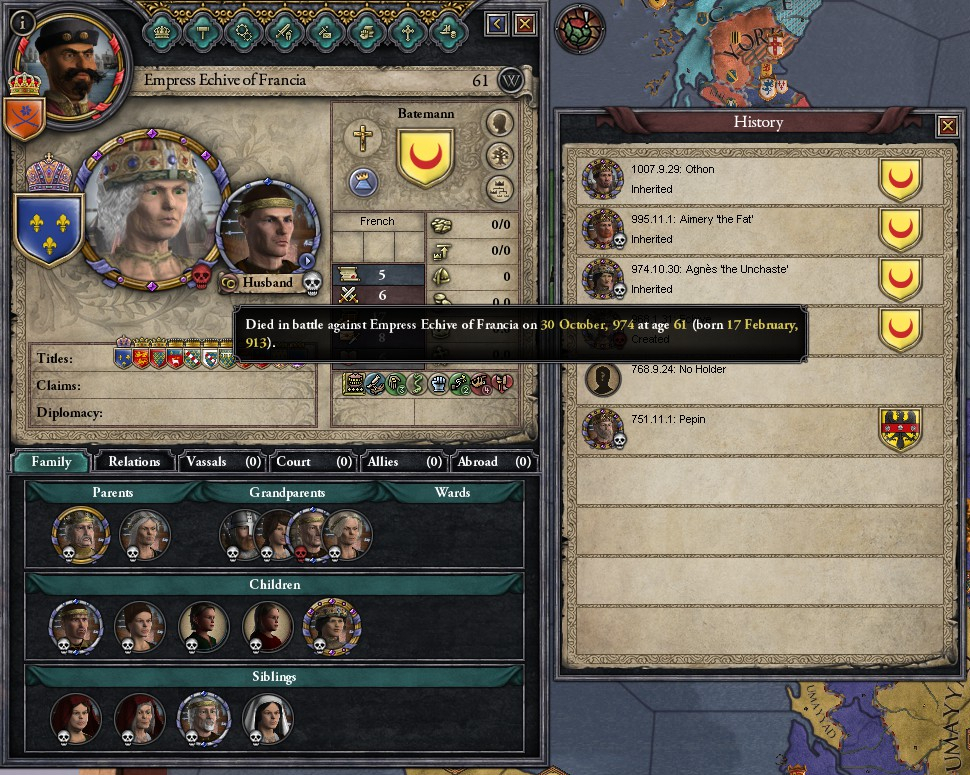  : But first, let me tell you something I have been trying to not speak of for so long. : But first, let me tell you something I have been trying to not speak of for so long. : The Empress Echive, the one the old Madame talked about. A most peculiar woman. : The Empress Echive, the one the old Madame talked about. A most peculiar woman. : You see, the Frunseeyans have an old legend about her. As most Batemanns, she was quite full of herself. She wished to put a great feast for her people, something about the legacy of the Romans. A strange notion for a country at war with the Romans every thirty years. : You see, the Frunseeyans have an old legend about her. As most Batemanns, she was quite full of herself. She wished to put a great feast for her people, something about the legacy of the Romans. A strange notion for a country at war with the Romans every thirty years. : She held mock battles towards the end of her reign. The greatest one of all was a play on the greatest loss in Christendom: the loss of Antioch. : She held mock battles towards the end of her reign. The greatest one of all was a play on the greatest loss in Christendom: the loss of Antioch. : And so, in October, she had her soldiers dress as Muslims and Christians, and fight the Battle of the Iron Bridge as it was fought. : And so, in October, she had her soldiers dress as Muslims and Christians, and fight the Battle of the Iron Bridge as it was fought. : She herself took the role of Heraclius, a Roman Basileus. She charged the 'Muslims' on top her great camel. : She herself took the role of Heraclius, a Roman Basileus. She charged the 'Muslims' on top her great camel. : Didn't quite make it. Her camel threw her, and she fell face-first onto a wooden sword. : Didn't quite make it. Her camel threw her, and she fell face-first onto a wooden sword. : Made quite a mess, I've heard. : Made quite a mess, I've heard.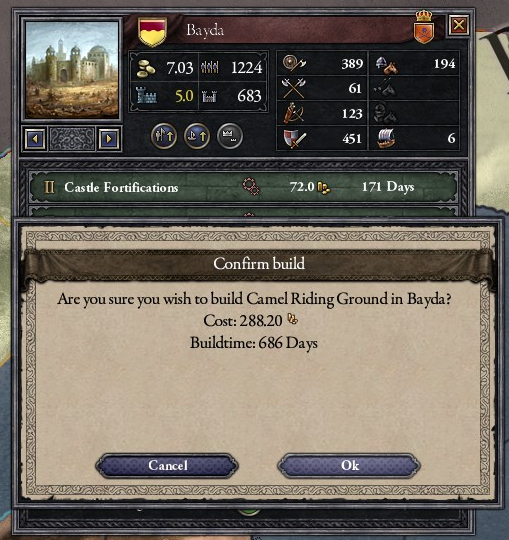  : But enough of dead old women! Again I speak of the great Idris Prince, Uways. : But enough of dead old women! Again I speak of the great Idris Prince, Uways. : After his wars with the Muslims were over, he spoke to me of his troops. "Alim, he said, The camels' humps support the throne. I wish to have the highest throne of all! And for that, I will need more camels" : After his wars with the Muslims were over, he spoke to me of his troops. "Alim, he said, The camels' humps support the throne. I wish to have the highest throne of all! And for that, I will need more camels" : So he sent for more camels. : So he sent for more camels. : He did! It is as if you know this story, Ulfr. : He did! It is as if you know this story, Ulfr.  : But camels were not the only things supporting his throne. He had created new pirate kings, you see, and named them "Lord Mayors". They ruled his lands outside the Bird Isle in his stead. : But camels were not the only things supporting his throne. He had created new pirate kings, you see, and named them "Lord Mayors". They ruled his lands outside the Bird Isle in his stead. : They collected taxes, and sent able men to fight his wars. : They collected taxes, and sent able men to fight his wars. : It seems that vassalage was not as gone from the Isle as his father thought. : It seems that vassalage was not as gone from the Isle as his father thought.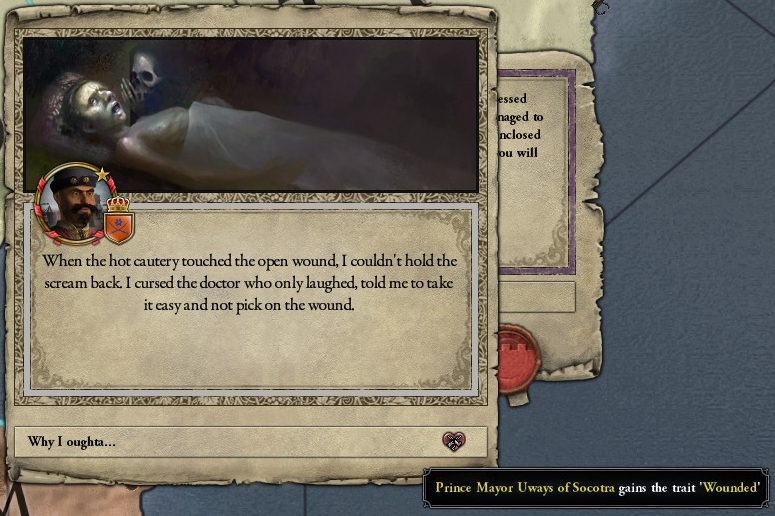  : The war gave him trouble, however. He was grazed in his side by an arrow, and the wound had festered quite a bit. A trained Muslim doctor, with great pleasure, no doubt, had burnt the pus out. : The war gave him trouble, however. He was grazed in his side by an arrow, and the wound had festered quite a bit. A trained Muslim doctor, with great pleasure, no doubt, had burnt the pus out. : He was never seen again. : He was never seen again.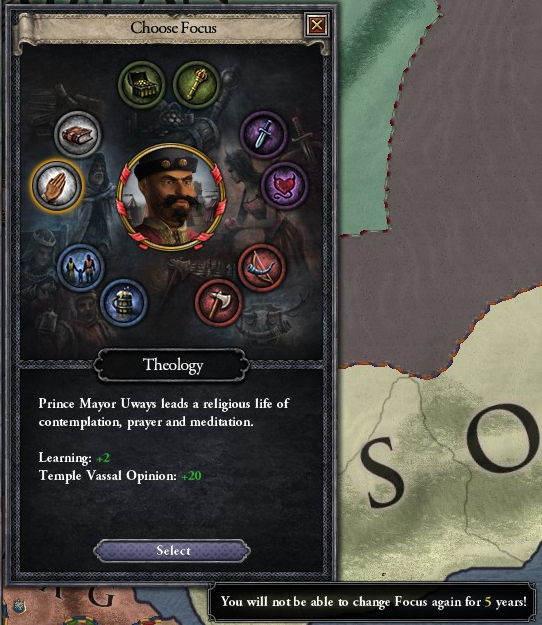  : The strange thing is, Uways considered the whole thing to be a punishment from the Nester Gods. : The strange thing is, Uways considered the whole thing to be a punishment from the Nester Gods.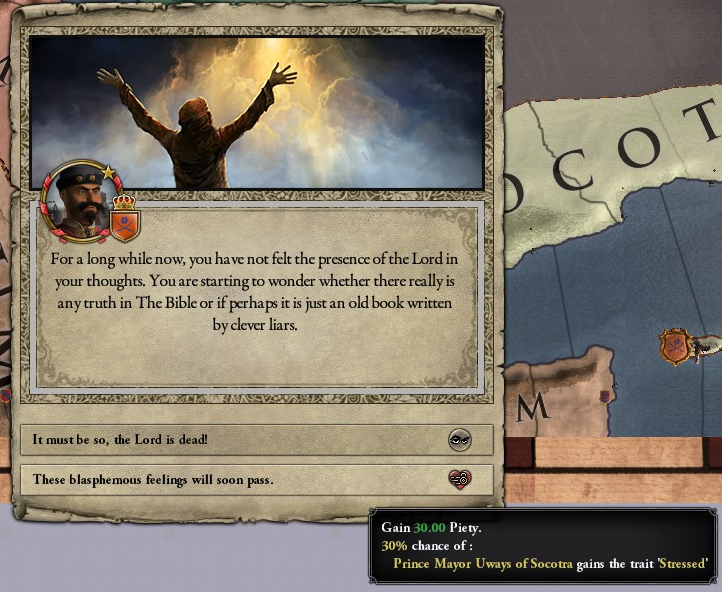  : He had locked himself in his study, poring over tome after tome on the Gods' will. It brought him nothing but pain. : He had locked himself in his study, poring over tome after tome on the Gods' will. It brought him nothing but pain.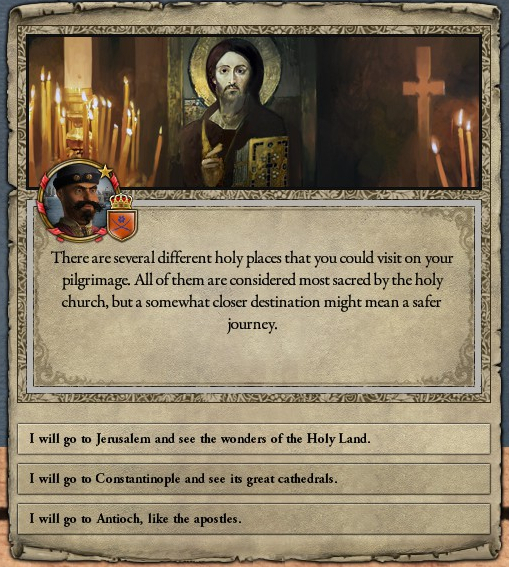  : So, like his father before him, he had declared that he would make a great journey to the Nester holy sites. : So, like his father before him, he had declared that he would make a great journey to the Nester holy sites. : As he left for his trip, I remained with his brother, Alim. : As he left for his trip, I remained with his brother, Alim. 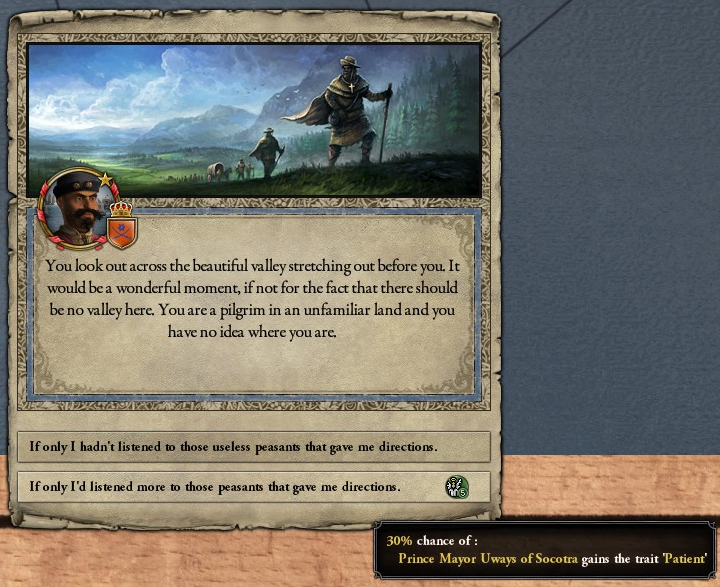  : By the time I was no longer considered a curiosity at the Pirate Court, a rift grew between the brothers. : By the time I was no longer considered a curiosity at the Pirate Court, a rift grew between the brothers. : Alim spoke to me in secret of his brothers' many faults. His temper, his sheer rage in battle would harm their own camel riders. : Alim spoke to me in secret of his brothers' many faults. His temper, his sheer rage in battle would harm their own camel riders.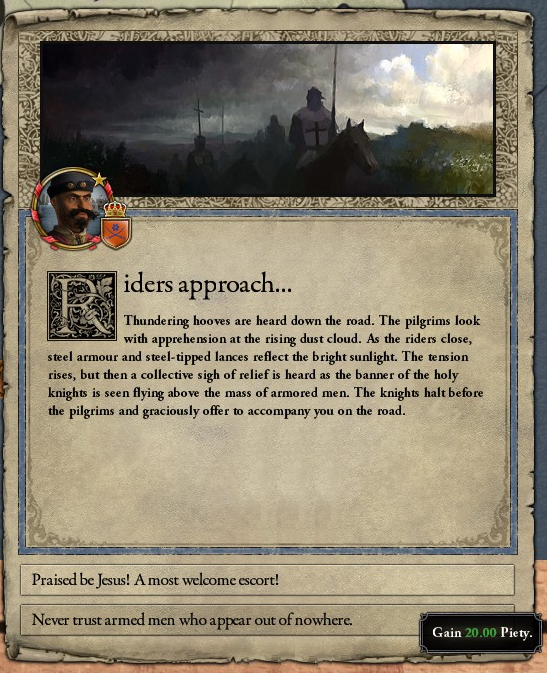  : He spoke about the many disgusting foreigners that his brother entertained. : He spoke about the many disgusting foreigners that his brother entertained. : I was too polite to remind him of myself, of course. I am nothing if not humble. : I was too polite to remind him of myself, of course. I am nothing if not humble.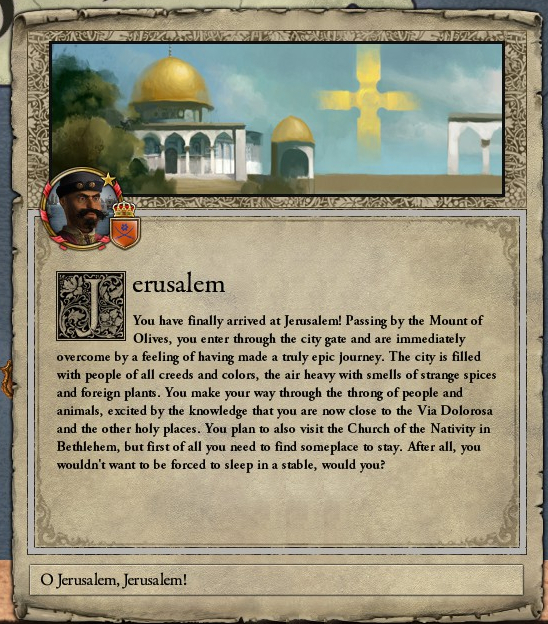  : The foreigners, he said, accompanied him even now, on his journey. : The foreigners, he said, accompanied him even now, on his journey. : Could he had gone to Jerusalem to trade the Bird Isle secrets away to distant enemies? : Could he had gone to Jerusalem to trade the Bird Isle secrets away to distant enemies?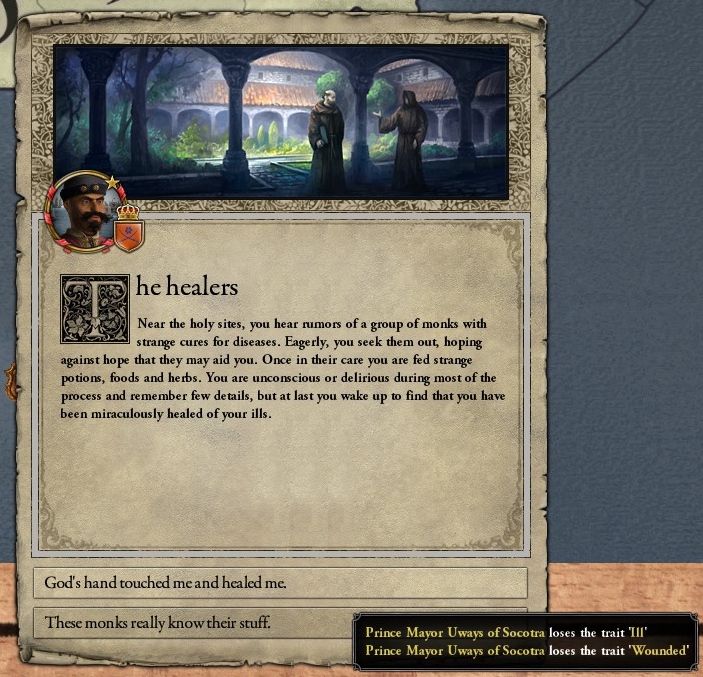  : Could he betray his Gods, and learn the foreigners' evil magics? : Could he betray his Gods, and learn the foreigners' evil magics? : All this and more. Every night, Alim and I would drink, and he would tell me of his brother. For my part, I told him stories about the horrors of living in the Solar Empire. : All this and more. Every night, Alim and I would drink, and he would tell me of his brother. For my part, I told him stories about the horrors of living in the Solar Empire.  : When Uways returned, Alim greeted him with a smile, and warmth. But in his eyes, you could see his turmoil. The fight within him, between loyalty to his brother, and loyalty to his country. : When Uways returned, Alim greeted him with a smile, and warmth. But in his eyes, you could see his turmoil. The fight within him, between loyalty to his brother, and loyalty to his country.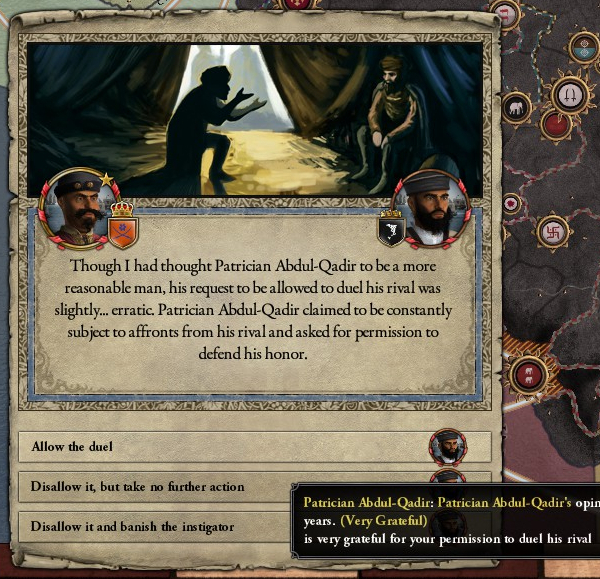  : Alim had been careful. He had spoken to some of the other Pirate Lords. Always in secret. He looked for men that were not great friends of his brother. : Alim had been careful. He had spoken to some of the other Pirate Lords. Always in secret. He looked for men that were not great friends of his brother.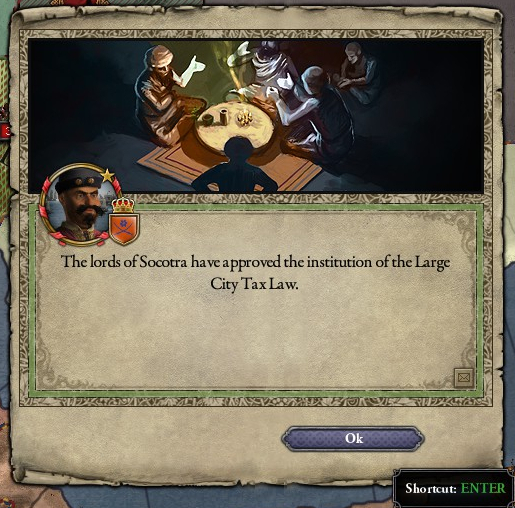  : He looked to the new Lord Mayors, who saw their gold pour through their fingers and flow to the Isle. : He looked to the new Lord Mayors, who saw their gold pour through their fingers and flow to the Isle.  : He had even spoken to foreigners. The Aksum dukes to the west had banded under a confederate flag, and called themselves Abyssinians. They had no desire to see Uways' long arm spread to the Horn of Africa. : He had even spoken to foreigners. The Aksum dukes to the west had banded under a confederate flag, and called themselves Abyssinians. They had no desire to see Uways' long arm spread to the Horn of Africa.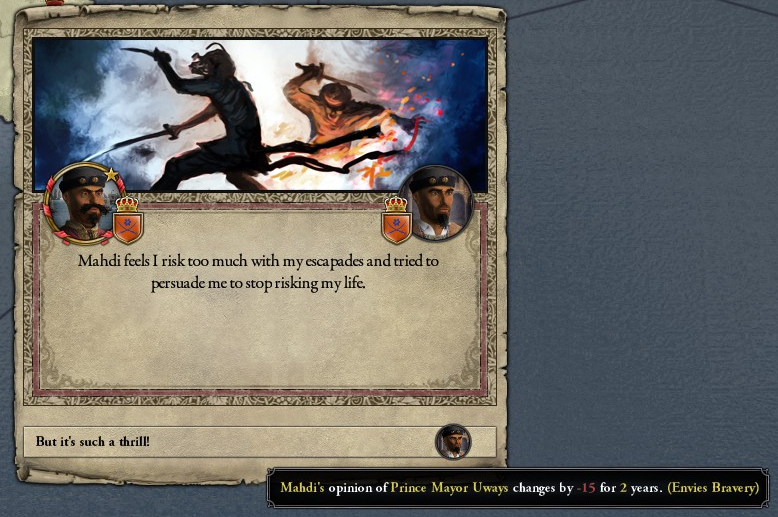  : Even his court had those that saw Uways as a poor Prince. : Even his court had those that saw Uways as a poor Prince.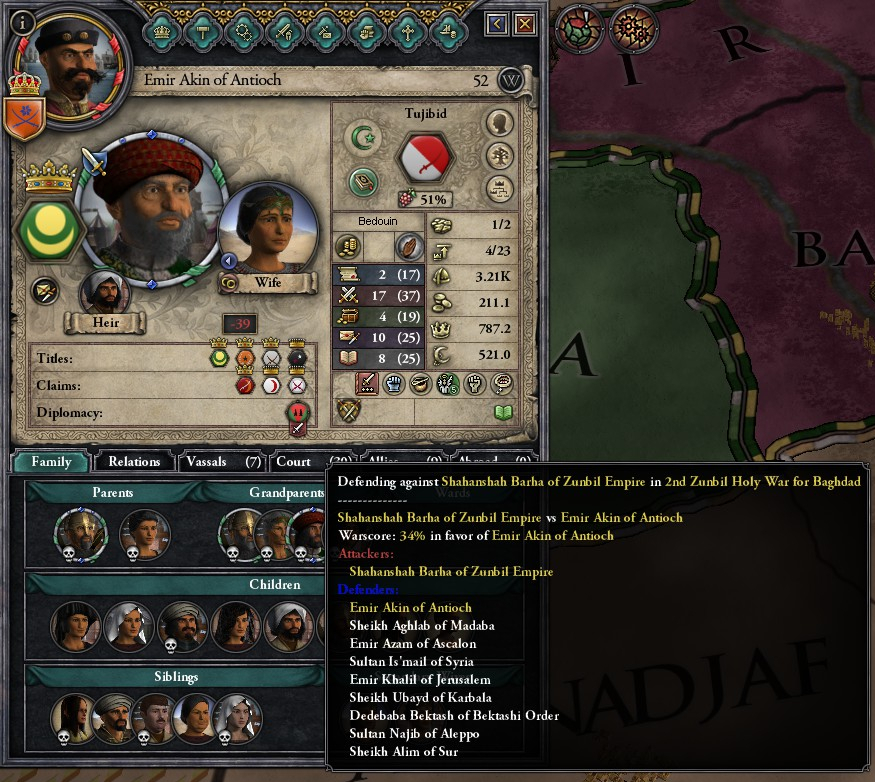  : I was no longer a young man, then. I had had my fill of palace intrigue. : I was no longer a young man, then. I had had my fill of palace intrigue. : I asked the many ship captains for news of my homeland. They spoke of a war for another Great Temple of Light. : I asked the many ship captains for news of my homeland. They spoke of a war for another Great Temple of Light. : It was such a shame. So many died for so little. : It was such a shame. So many died for so little.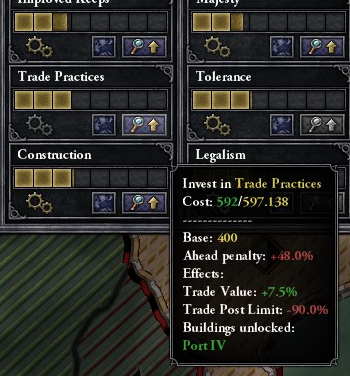  : But trade went well for Socotra. The captains were always many, but now they were a swarm. : But trade went well for Socotra. The captains were always many, but now they were a swarm.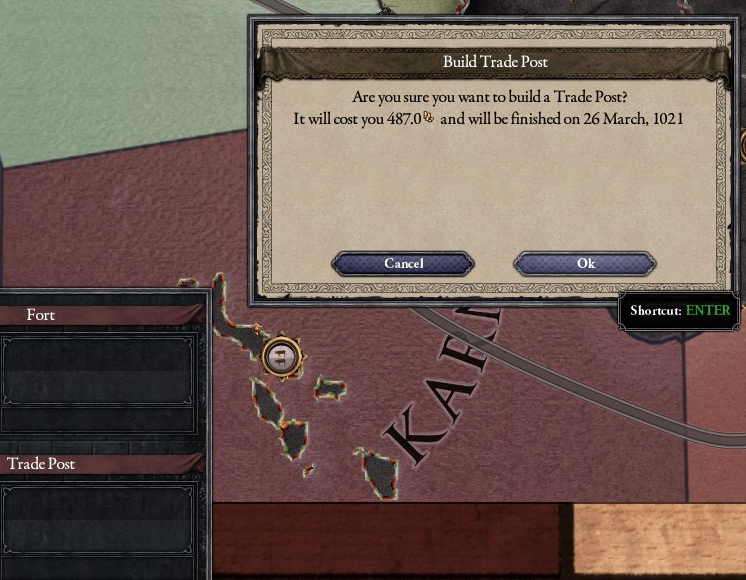  : With the Nests spread as far east as the Maldives, more and more men had joined the merchant navy to sail under the Orange Flag. : With the Nests spread as far east as the Maldives, more and more men had joined the merchant navy to sail under the Orange Flag.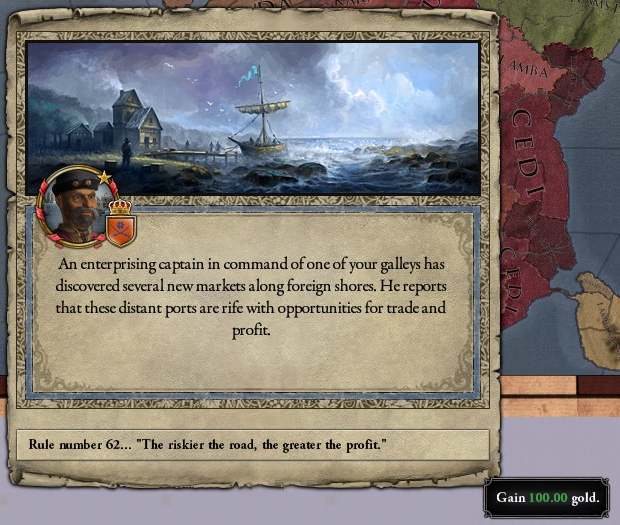  : The eastern ports were many and prosperous. A man could serve five years on those ships, and make enough gold to captain his own. So they sailed. : The eastern ports were many and prosperous. A man could serve five years on those ships, and make enough gold to captain his own. So they sailed.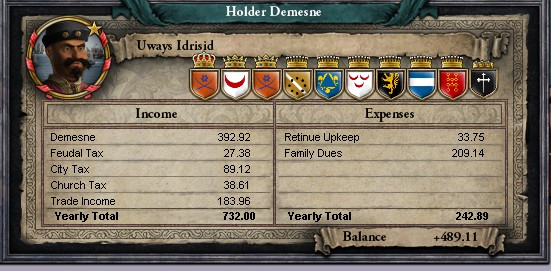  : And they brought riches with them. Arab coffee for Indian cinnamon. Zunbil saffron for Cathayan silks. : And they brought riches with them. Arab coffee for Indian cinnamon. Zunbil saffron for Cathayan silks.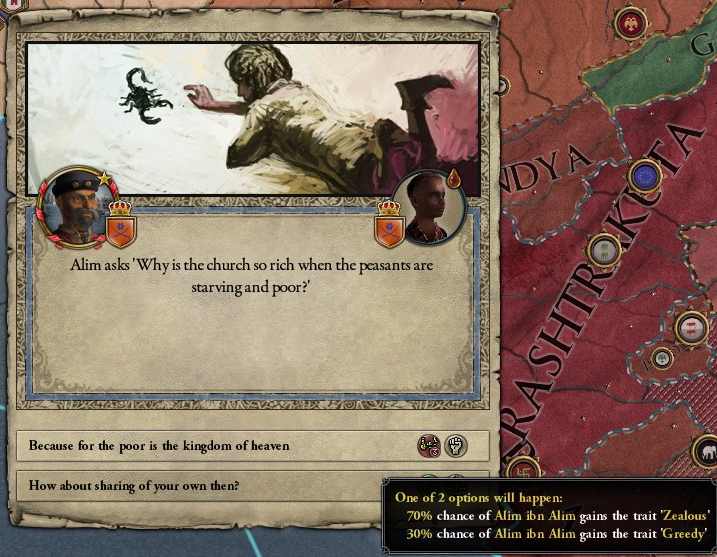  : And with all these riches, Uways had grown to hate those with less than him. His son was taught that the poor deserve nothing but an oar of a trade galley. : And with all these riches, Uways had grown to hate those with less than him. His son was taught that the poor deserve nothing but an oar of a trade galley. : Those who deserved gold were granted it by the Nester Gods. Who were we to doubt their will. : Those who deserved gold were granted it by the Nester Gods. Who were we to doubt their will.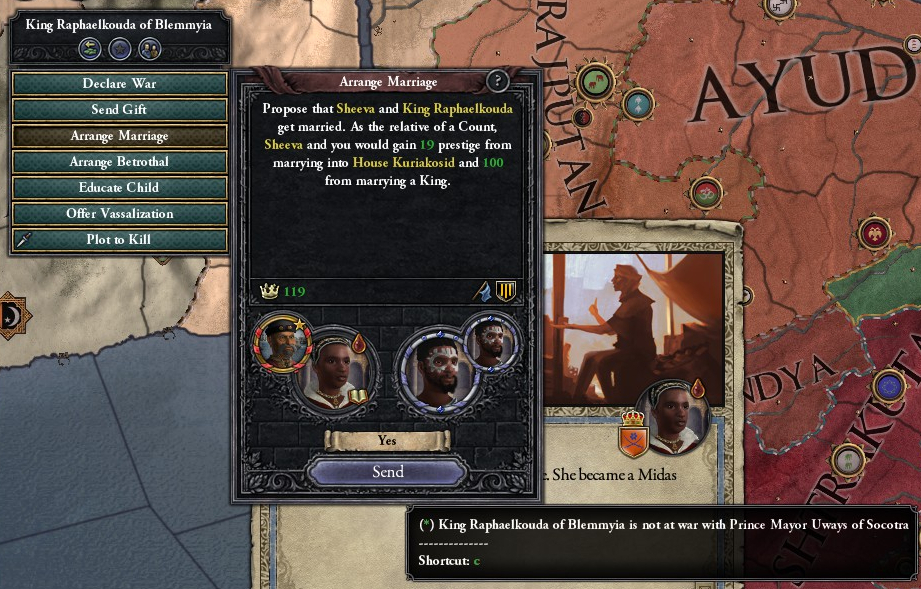  : I confess, I had taken much of what Alim had said to heart. : I confess, I had taken much of what Alim had said to heart. : Uways did love his foreigners. He even married his daughter to one! : Uways did love his foreigners. He even married his daughter to one!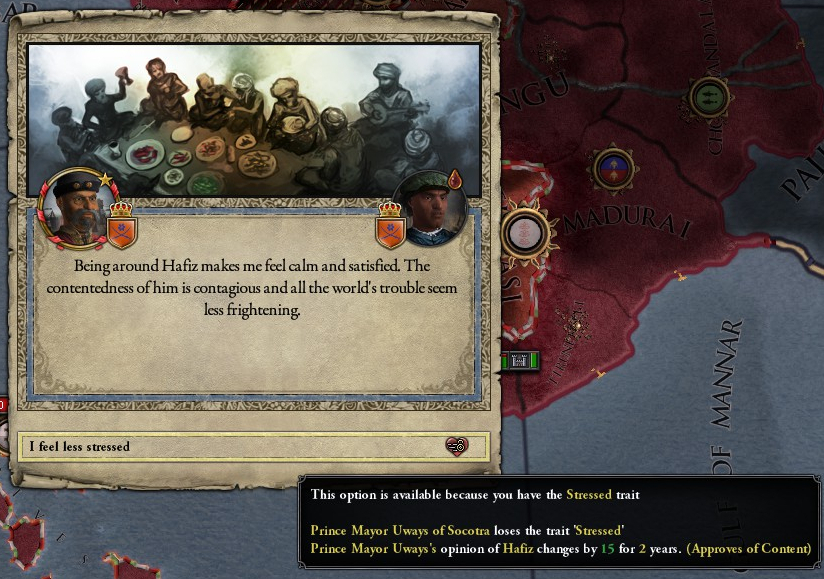  : He had drifted further and further from Alim. His nephew was his new confidante. : He had drifted further and further from Alim. His nephew was his new confidante.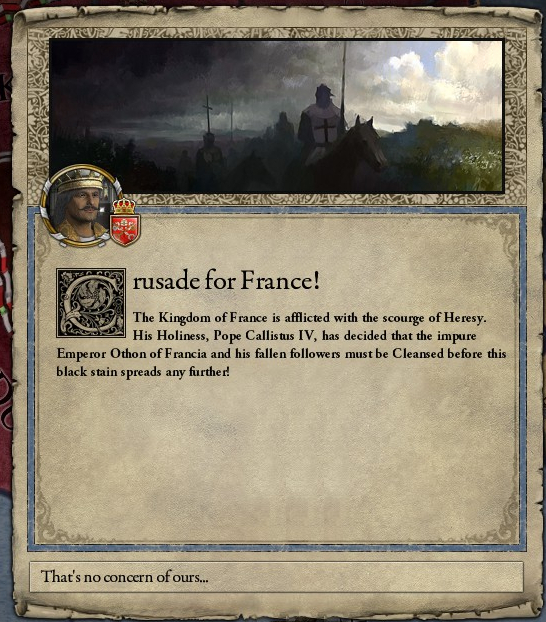  : He had just returned of a voyage to the west himself. He spoke about another Great Holy War the Roman king had called for Frunseeya. : He had just returned of a voyage to the west himself. He spoke about another Great Holy War the Roman king had called for Frunseeya.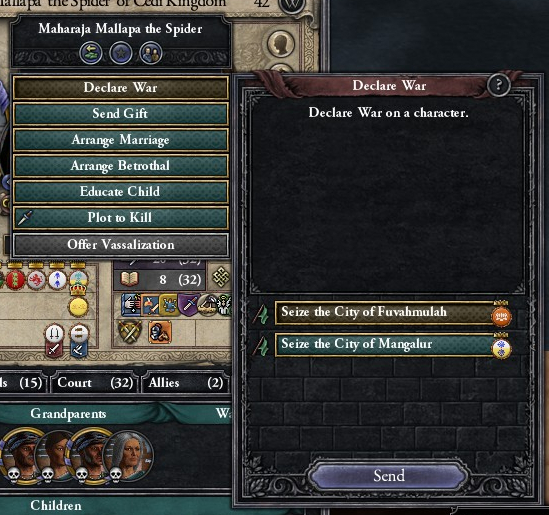  : Uways had decided to follow the Roman king's ambition, and expand his eastern Nests. : Uways had decided to follow the Roman king's ambition, and expand his eastern Nests. : You see, the Maldives Nest had been especially prosperous. But much of that prosperity stayed in the city itself. : You see, the Maldives Nest had been especially prosperous. But much of that prosperity stayed in the city itself. : Uways had decided that that would just not do. : Uways had decided that that would just not do.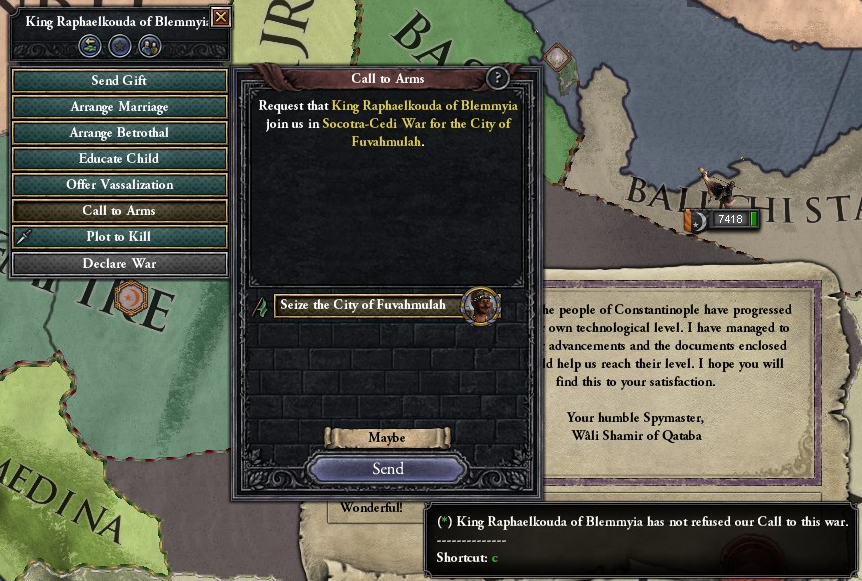  : He had even called on his new son-in-law to provide arms for him. : He had even called on his new son-in-law to provide arms for him.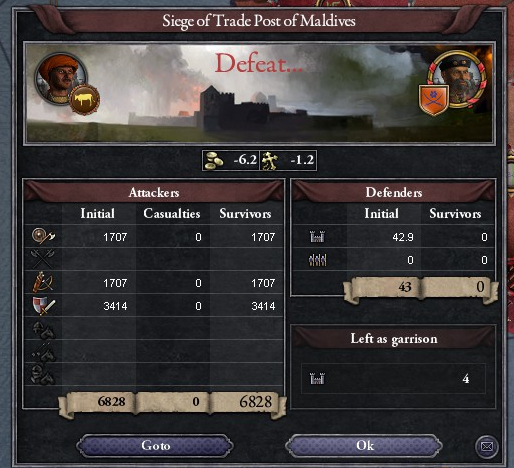  : The war half-way across the world was difficult to wage. Captains from the eastern Nests flew with news of the Nest itself falling into Cedi hands. : The war half-way across the world was difficult to wage. Captains from the eastern Nests flew with news of the Nest itself falling into Cedi hands.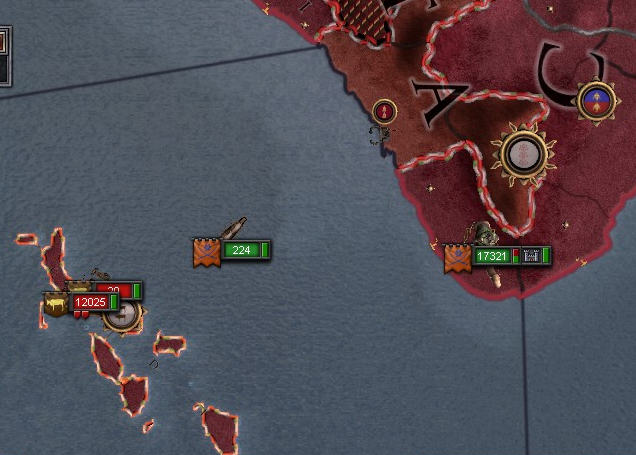  : They were many. Too many for the camel marines to destroy. : They were many. Too many for the camel marines to destroy. : And so, Uways had ordered his men to seige the Cedi Maharaja's coastal lands. : And so, Uways had ordered his men to seige the Cedi Maharaja's coastal lands.  : The Maharaja could not see his people suffer so, and he had ordered his troops to lift the seige. : The Maharaja could not see his people suffer so, and he had ordered his troops to lift the seige.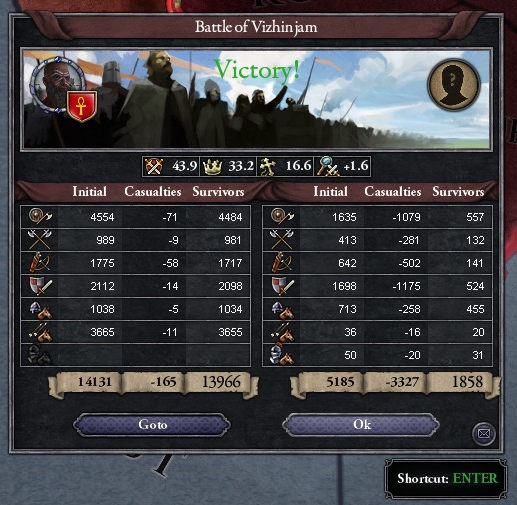  : It is very difficult to attack men from water. The Socotrans, both man and beast, train for years to storm a beach. The Cedi do not. : It is very difficult to attack men from water. The Socotrans, both man and beast, train for years to storm a beach. The Cedi do not.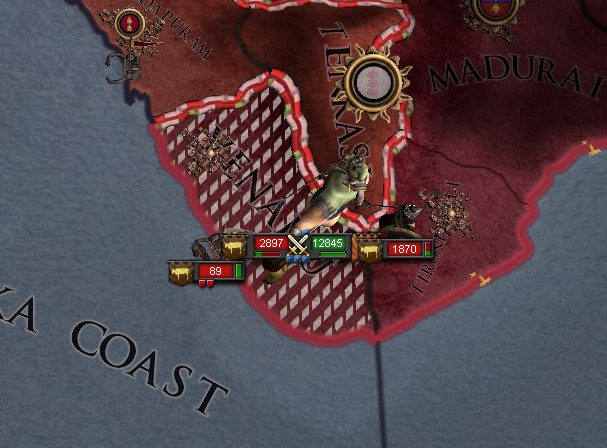  : More and more men waddled through the sea water, some drowning, some dropping their swords and running back into the surf. : More and more men waddled through the sea water, some drowning, some dropping their swords and running back into the surf. : The camels made short work of them all. : The camels made short work of them all.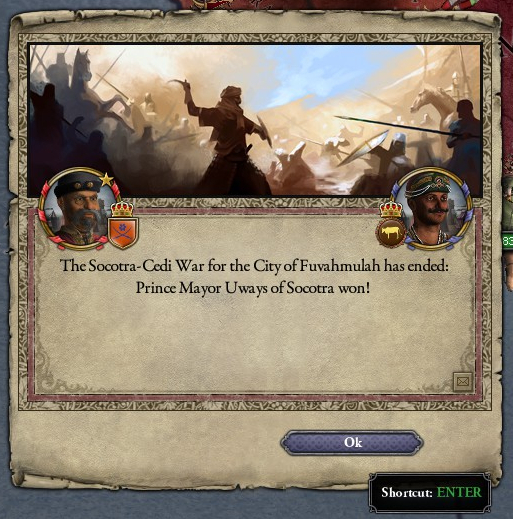  : The Maharaja then sent an envoy to the Prince. The city was his, provided no more Cedi blood would be spilt. : The Maharaja then sent an envoy to the Prince. The city was his, provided no more Cedi blood would be spilt.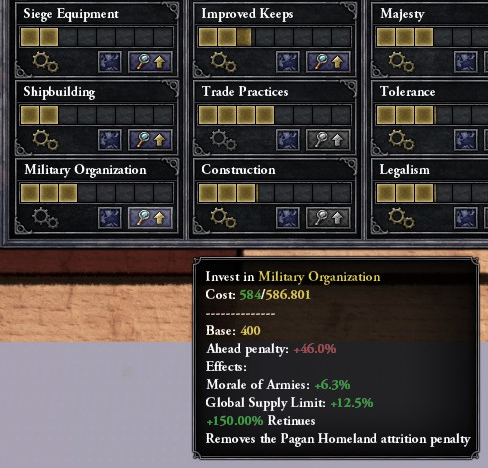  : The Prince agreed, and had sailed back home. There were more camel marines to train. : The Prince agreed, and had sailed back home. There were more camel marines to train.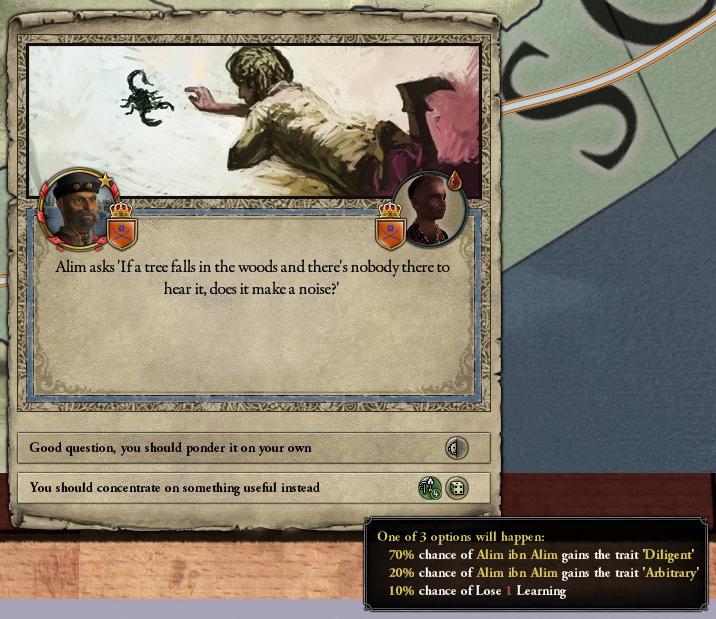  : And many children, too. His son was a great lover of philosophy books the captains brought from the Silk Road. Uways was not. : And many children, too. His son was a great lover of philosophy books the captains brought from the Silk Road. Uways was not.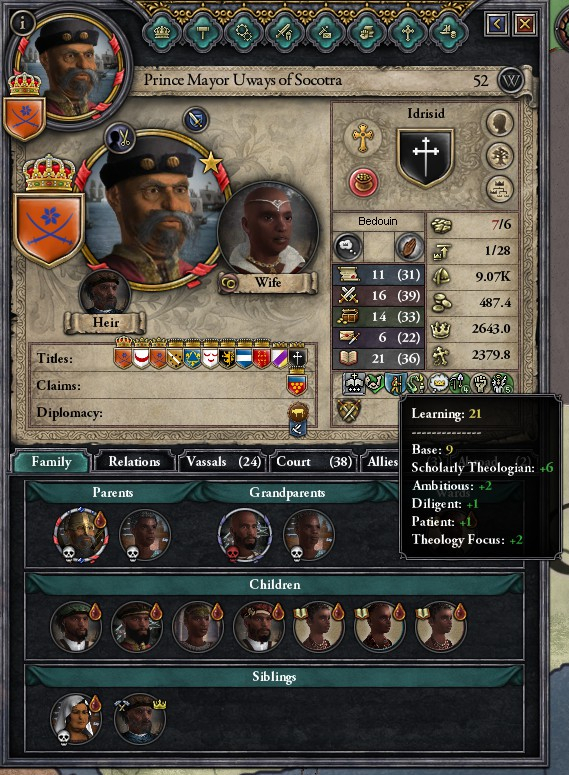  : He claimed there was no need for these Eastern learnings. After all, he had learned from the Nester Holy Books, and he was a learned man. : He claimed there was no need for these Eastern learnings. After all, he had learned from the Nester Holy Books, and he was a learned man. : His son would follow suit. : His son would follow suit.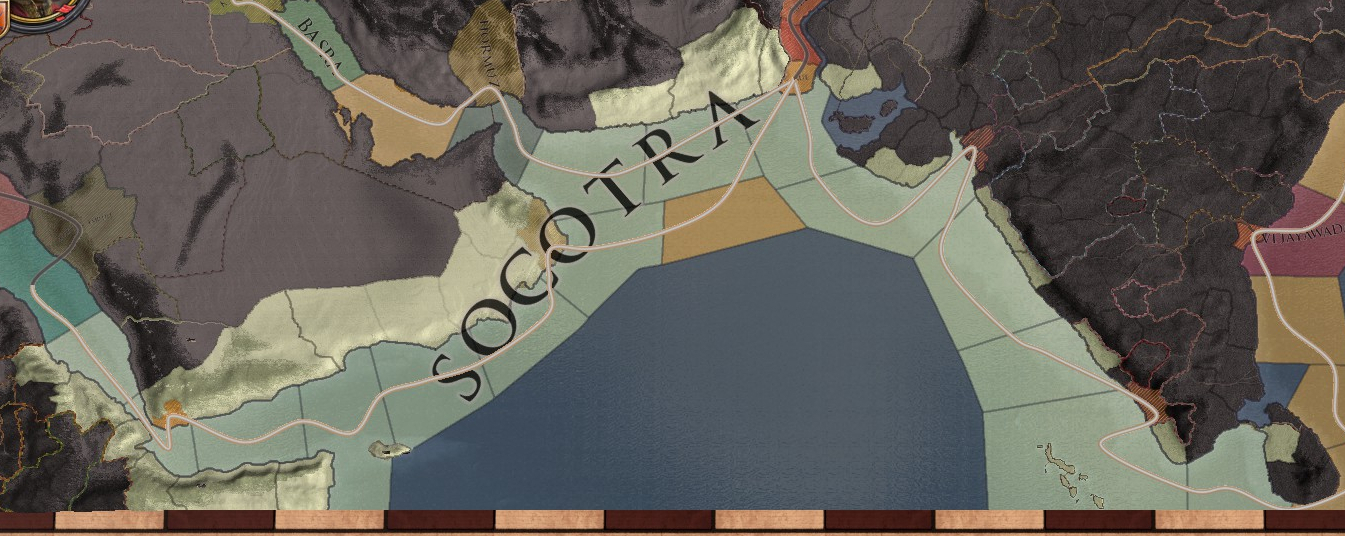  : I had once seen a map of the extent of Socotran trade. The entire Indian Sea was their domain. : I had once seen a map of the extent of Socotran trade. The entire Indian Sea was their domain.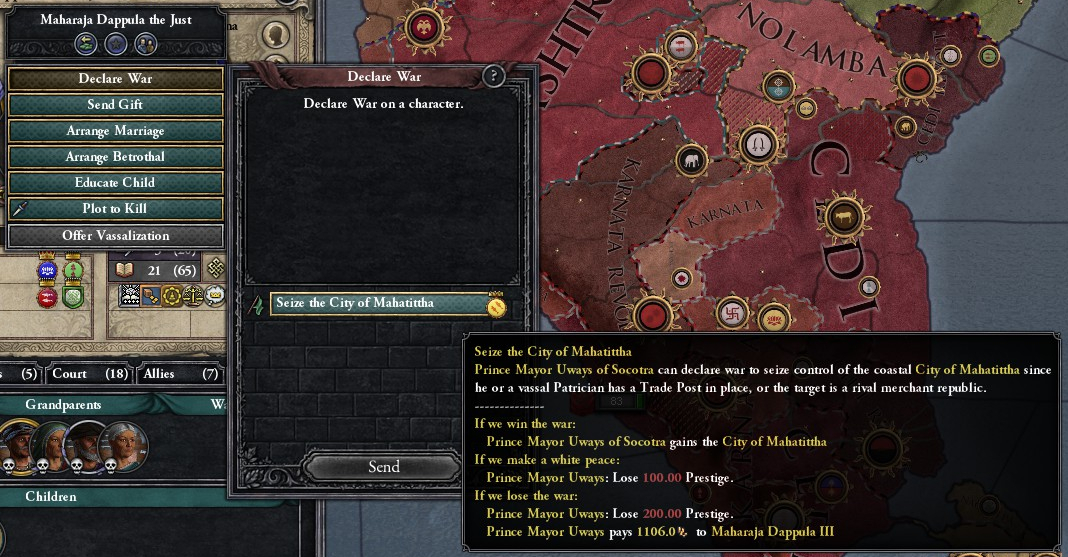  : And yet it was not enough. Having secured the city on Maldives, Uways wanted to repeat the process on Ceylon. : And yet it was not enough. Having secured the city on Maldives, Uways wanted to repeat the process on Ceylon.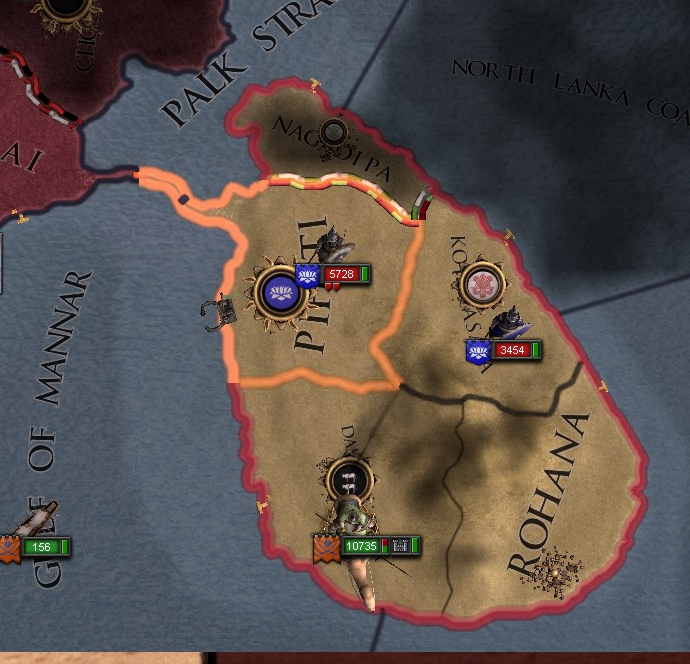  : And just like the Cedi, he had his marines seige a city, so that the Maharaja would charge his camels. : And just like the Cedi, he had his marines seige a city, so that the Maharaja would charge his camels. : There was no sea to protect Uways this time. The Lankans had almost as many men as the Prince did. : There was no sea to protect Uways this time. The Lankans had almost as many men as the Prince did.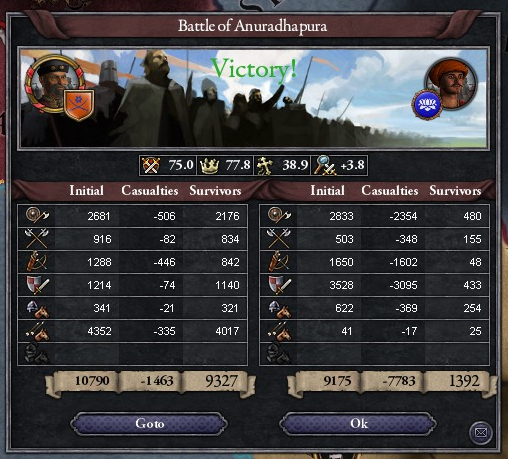  : But they had no camels. And that was their downfall. : But they had no camels. And that was their downfall. : I was not in Lanka at the time. I had remained with Alim, and watched over the Pirate Court. : I was not in Lanka at the time. I had remained with Alim, and watched over the Pirate Court. : But I had heard stories of what a man with a bow on a camel can do to an army. : But I had heard stories of what a man with a bow on a camel can do to an army.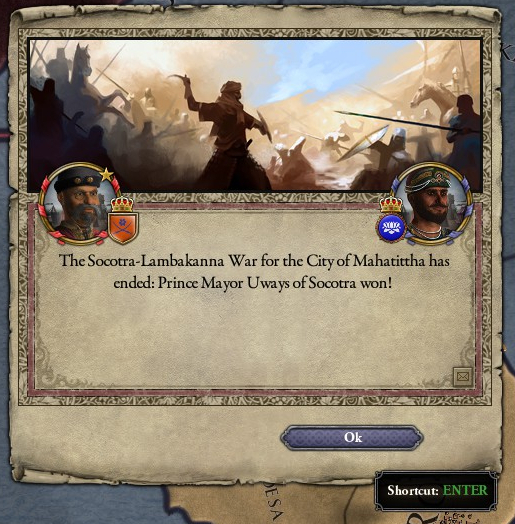  : They were not for the faint of heart. And the Maharaja wished for no more blood. The city belonged to Socotra. : They were not for the faint of heart. And the Maharaja wished for no more blood. The city belonged to Socotra.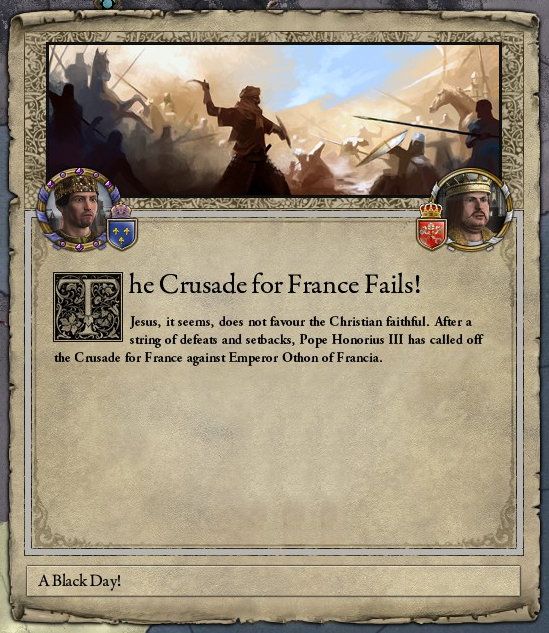  : As Uways was conquering more room for his Nests, we had heard from the west. It would seem the Roman king, as he is wont to do, could not triumph over the Frunseeyans. : As Uways was conquering more room for his Nests, we had heard from the west. It would seem the Roman king, as he is wont to do, could not triumph over the Frunseeyans.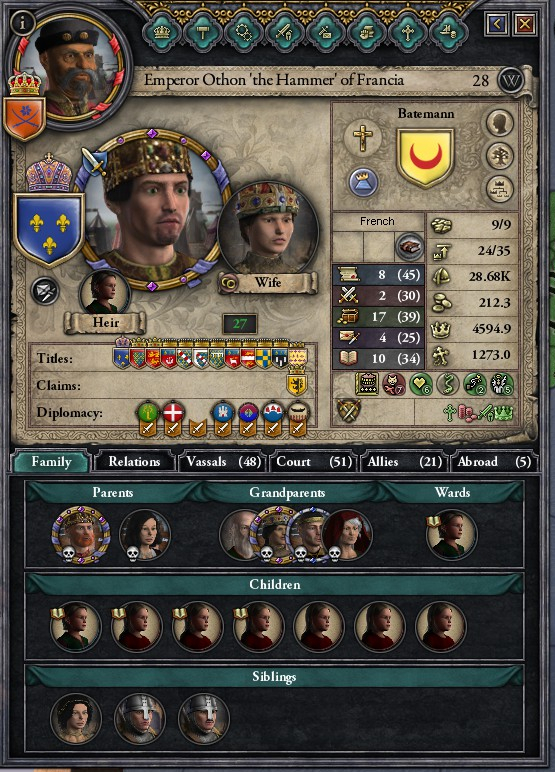  : They called the Frunseeyan king 'the Anvil', for he had taken many hits from the Romans. A warrior of great renown, and an example to all Katharoi. : They called the Frunseeyan king 'the Anvil', for he had taken many hits from the Romans. A warrior of great renown, and an example to all Katharoi.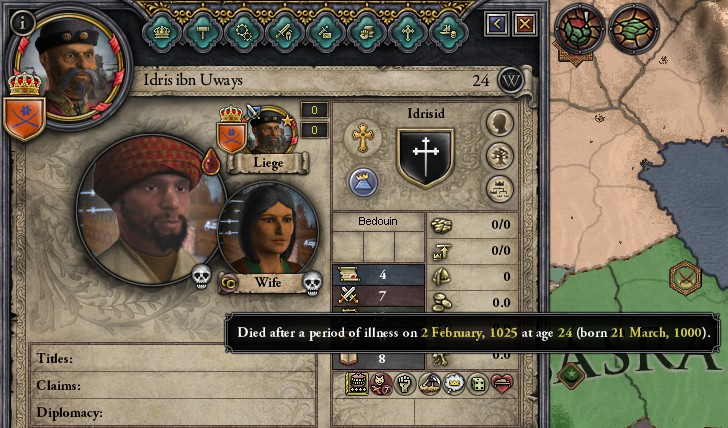  : As Uways returned, black news had hit the Isle. His firstborn, Idris, had fallen to the measles. : As Uways returned, black news had hit the Isle. His firstborn, Idris, had fallen to the measles. : It is an unnatural thing, for fathers to bury their sons. : It is an unnatural thing, for fathers to bury their sons. : At the funeral, Alim had called this the wrath of the Nester Gods, for all of Uways' sins. : At the funeral, Alim had called this the wrath of the Nester Gods, for all of Uways' sins.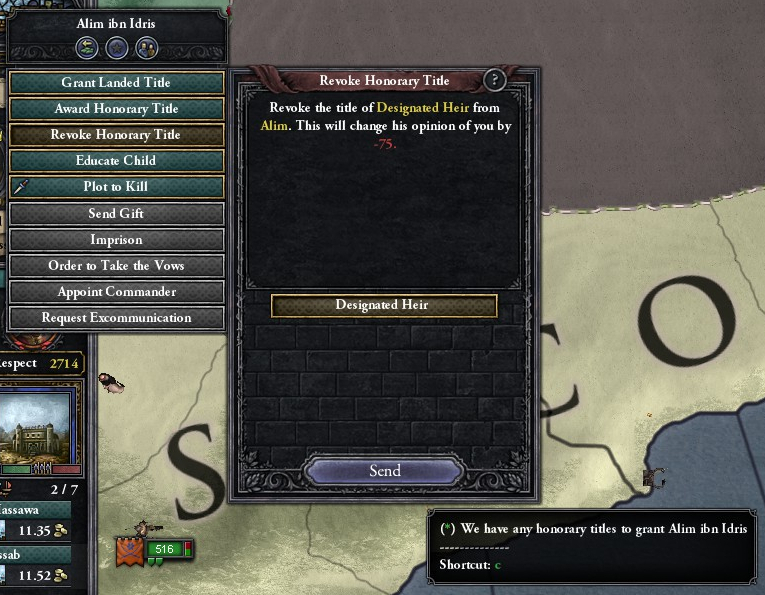  : A grieving father would not take words like this in stride. He had ordered Alim to be gone from the Isle itself. : A grieving father would not take words like this in stride. He had ordered Alim to be gone from the Isle itself. : He was to charter a ship, and trade in the eastern Nests. He would never return to the Bird Isle alive. : He was to charter a ship, and trade in the eastern Nests. He would never return to the Bird Isle alive. : As Alim was my greatest friend at court, I had elected to travel with him. I had missed the sea, and her many faces. : As Alim was my greatest friend at court, I had elected to travel with him. I had missed the sea, and her many faces.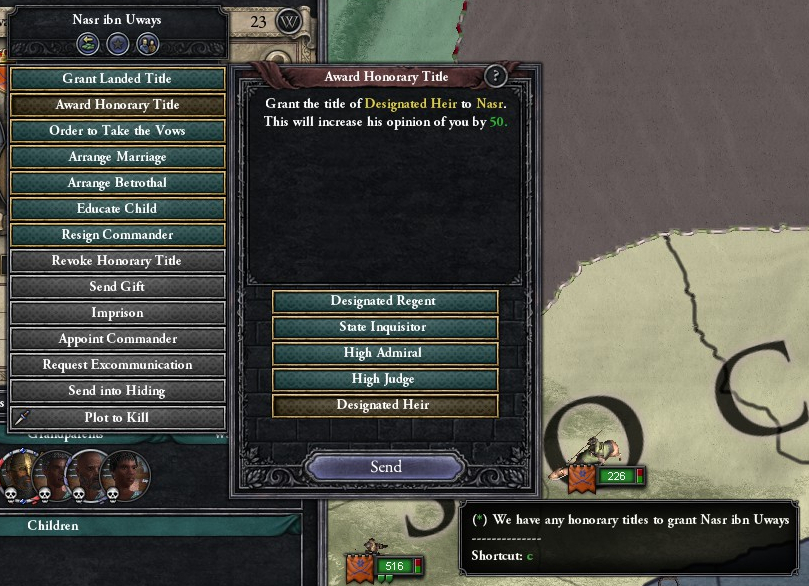  : Uways had named his son his successor. Nasr was not his favourite son, but he would take the Pirate Throne over Alim. : Uways had named his son his successor. Nasr was not his favourite son, but he would take the Pirate Throne over Alim.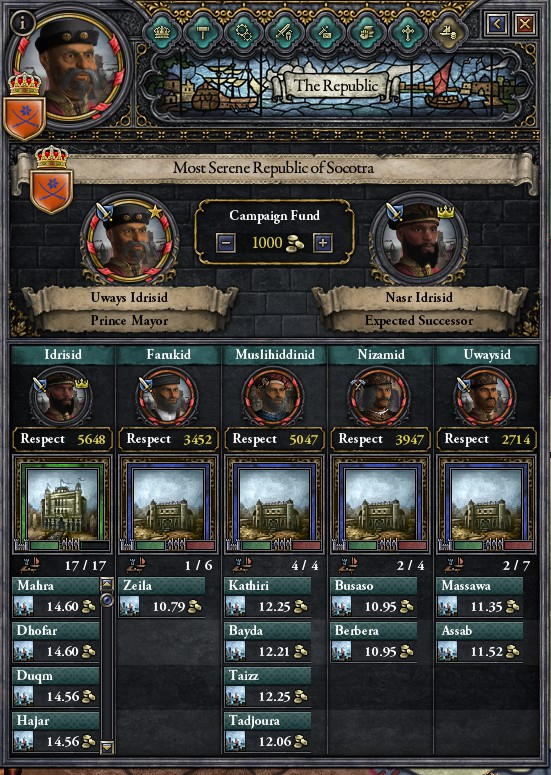  : Convincing the other Pirate Lords was less of an issue. By now, few had opposed Uways' rule as a king of the isle. Small bribes to each house secured his succession. : Convincing the other Pirate Lords was less of an issue. By now, few had opposed Uways' rule as a king of the isle. Small bribes to each house secured his succession.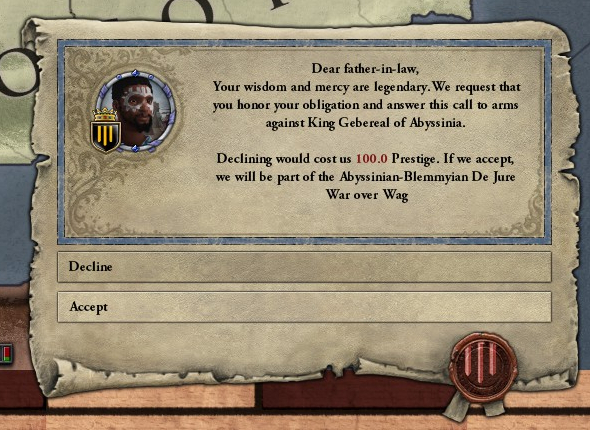  : We sailed to Goa. Unlike the Idrisids, I have always preferred continetal India to the isles. : We sailed to Goa. Unlike the Idrisids, I have always preferred continetal India to the isles. : While in Goa, we heard from other traders that Uways' son-in-law was fighting back against the Abyssinians, and had demanded he help. : While in Goa, we heard from other traders that Uways' son-in-law was fighting back against the Abyssinians, and had demanded he help.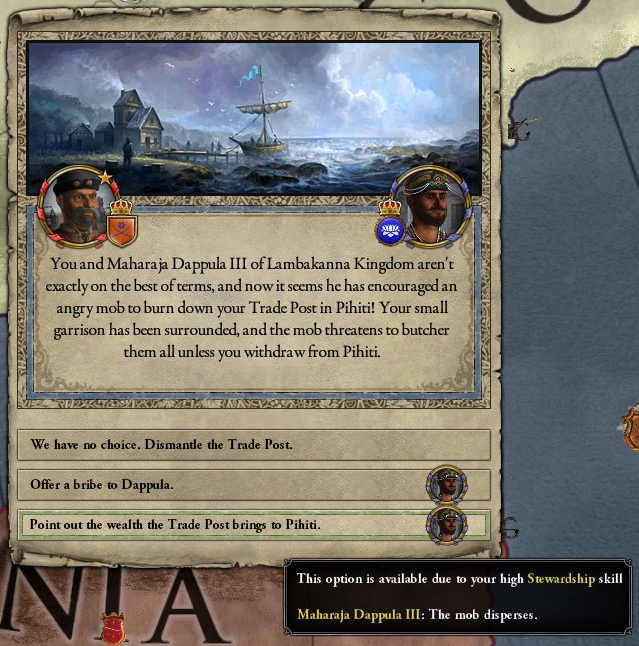  : And from further east, we had heard that the Lankans had second thoughts about giving any trade to the Nests. : And from further east, we had heard that the Lankans had second thoughts about giving any trade to the Nests. : Uways sent a letter explaining the vast riches from the west that the Nest brought to Lanka. : Uways sent a letter explaining the vast riches from the west that the Nest brought to Lanka. : He had attached a pouch with enough gold to buy a castle. Whether the letter or the pouch work, I could not say. : He had attached a pouch with enough gold to buy a castle. Whether the letter or the pouch work, I could not say. : But the Nest remained. : But the Nest remained.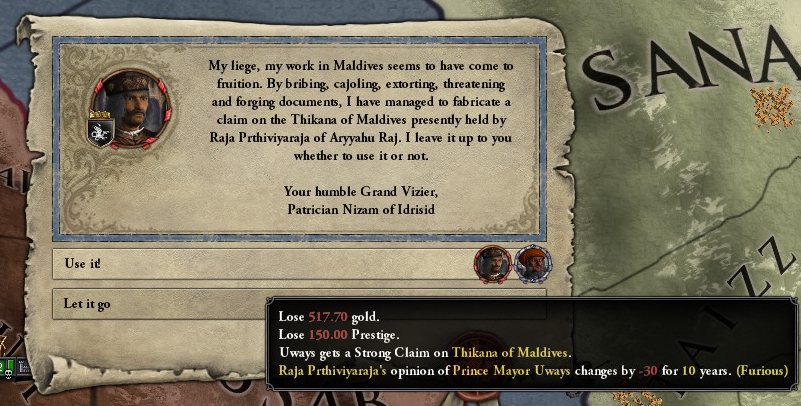  : I ran into one of the Pirate Lords while we were bringing saffron to the Maldives. He claimed he had discovered a passage in the treaty signed by the late Cedi Maharaja that gave all of the Maldives to Socotra, not just the city. : I ran into one of the Pirate Lords while we were bringing saffron to the Maldives. He claimed he had discovered a passage in the treaty signed by the late Cedi Maharaja that gave all of the Maldives to Socotra, not just the city. : He brought this up to the new Cedi ruler. : He brought this up to the new Cedi ruler.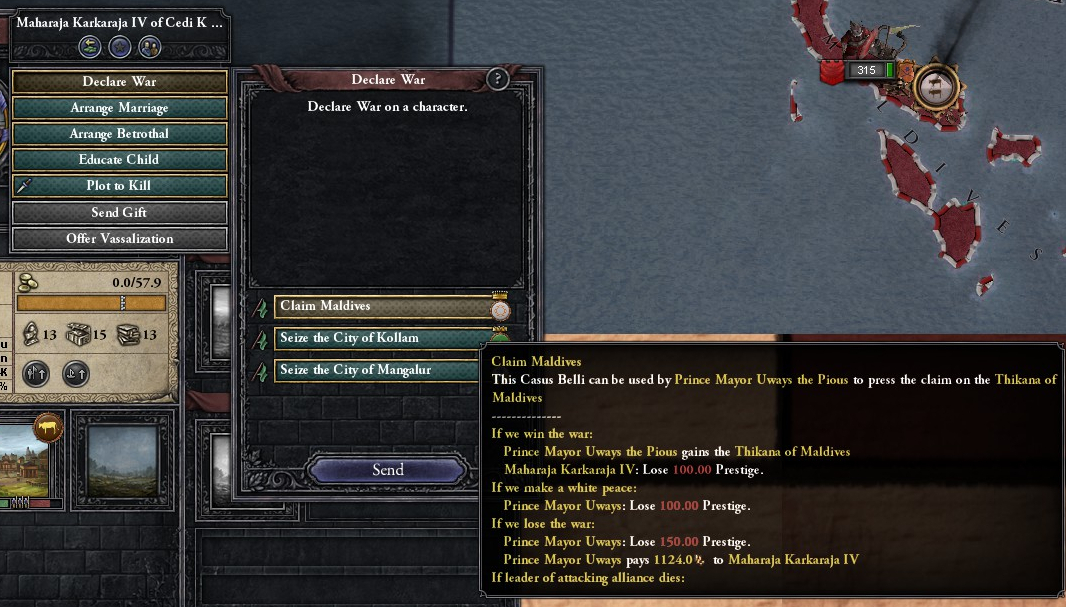  : He was laughed out of court, and threatened with death should he set foot on Cedi soil again. : He was laughed out of court, and threatened with death should he set foot on Cedi soil again. : The Pirate Lord had bid his farewell, and offered room on his ship to any of the many Cedi malcontents. : The Pirate Lord had bid his farewell, and offered room on his ship to any of the many Cedi malcontents.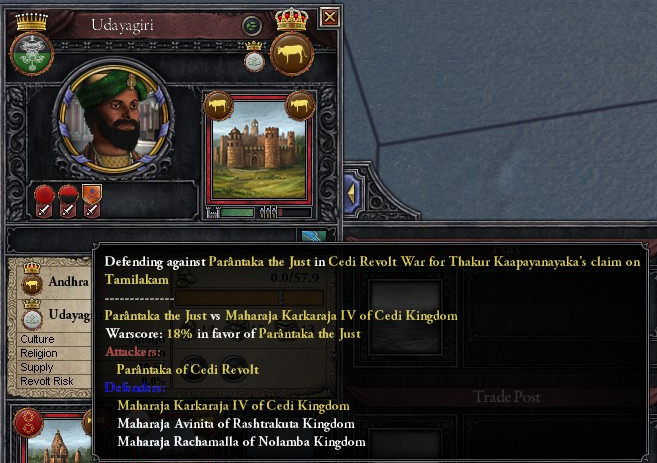  : Two men came aboard at night. Both had claims on the Cedi throne. Both argued their cause. Both received lavish gifts of gold from the Pirate Lord. : Two men came aboard at night. Both had claims on the Cedi throne. Both argued their cause. Both received lavish gifts of gold from the Pirate Lord.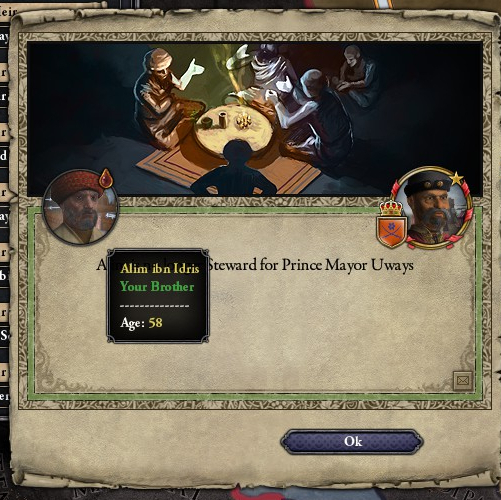  : We sailed back to Goa when Alim caught the Roman Fever. He rattled in his chambers for days, before dyinig at dawn. : We sailed back to Goa when Alim caught the Roman Fever. He rattled in his chambers for days, before dyinig at dawn. : I arranged for a ship to bring the body back to Socotra. As Alim's first mate, the crew voted for me to continue the trade. I accepted, eager to captain my own ship. : I arranged for a ship to bring the body back to Socotra. As Alim's first mate, the crew voted for me to continue the trade. I accepted, eager to captain my own ship. : We renamed her Akhona - 'Our Brother' in his honour. : We renamed her Akhona - 'Our Brother' in his honour.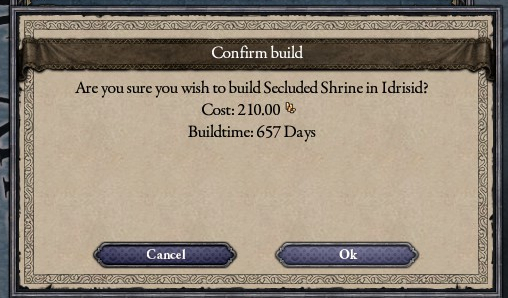  : Rumours travelled east with the marines' ships. Uways had a great tomb built in the Idris manor for Alim. Even in the face of betrayal, he had loved his brother. : Rumours travelled east with the marines' ships. Uways had a great tomb built in the Idris manor for Alim. Even in the face of betrayal, he had loved his brother.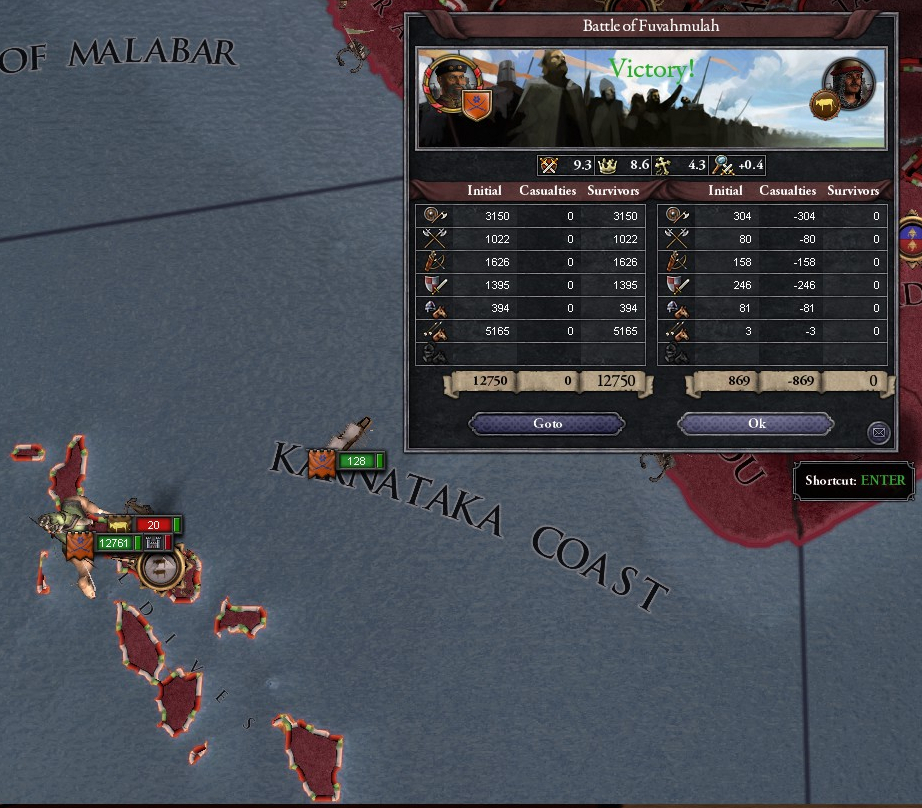  : The marines had done their job as only marines can. : The marines had done their job as only marines can.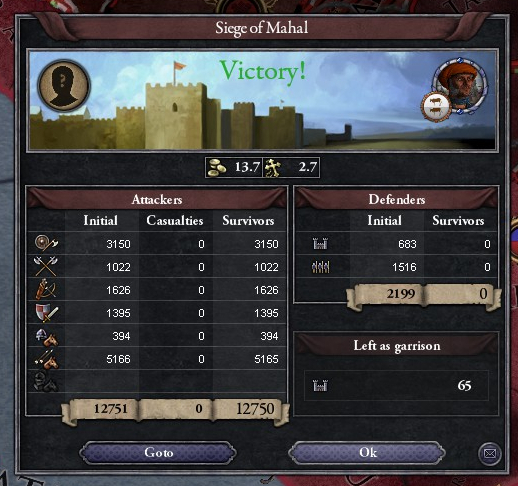  : The Maldives stood no chance. : The Maldives stood no chance.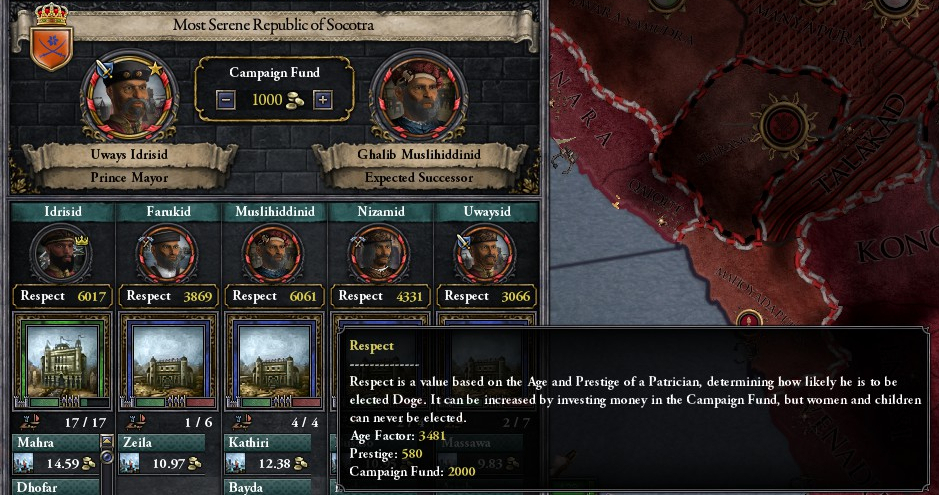  : Without Alim, we were no longer banned from the Isle, and so we brought rubies back to Socotra. : Without Alim, we were no longer banned from the Isle, and so we brought rubies back to Socotra. : While in the city, I had seen great parades hosted by the Camel-Fucker's children in their honour. "While Uways kills your sons in India, we feed them at home!" they chanted. : While in the city, I had seen great parades hosted by the Camel-Fucker's children in their honour. "While Uways kills your sons in India, we feed them at home!" they chanted. : The Camel-Fuckers were spending a great deal of money to secure another Prince Mayor from their ranks. : The Camel-Fuckers were spending a great deal of money to secure another Prince Mayor from their ranks.  : I also ran into another Solar citizen. He had fled the Empire draft, for they had another holy war coming. I welcomed him on my ship. : I also ran into another Solar citizen. He had fled the Empire draft, for they had another holy war coming. I welcomed him on my ship.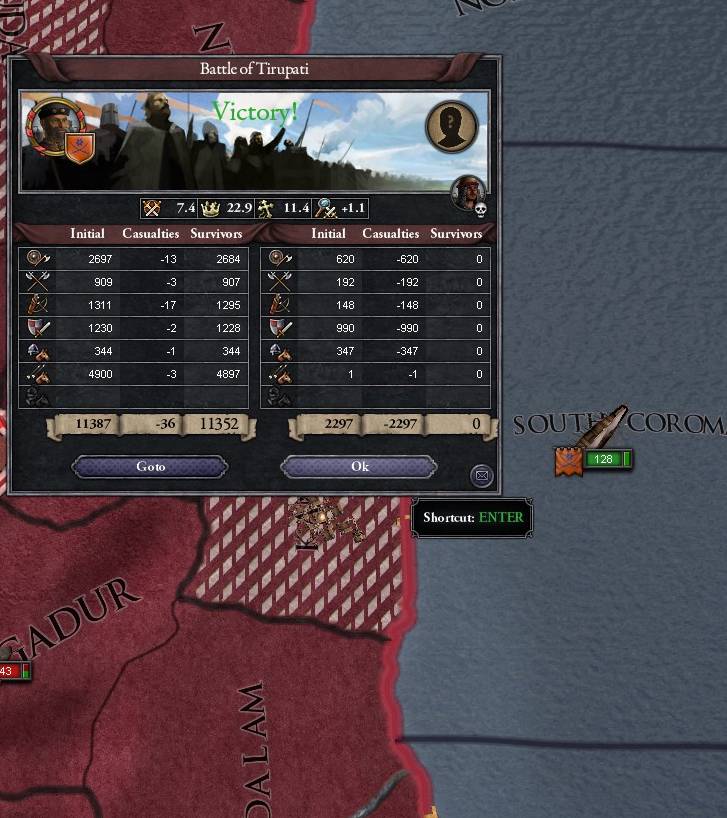  : We bought much coffee, and sailed back to Goa. It would fetch a fair price in the Indian Nests. : We bought much coffee, and sailed back to Goa. It would fetch a fair price in the Indian Nests. : We were careful not to go to close to the war, though. Men do not drink coffee when they need to buy swords instead. : We were careful not to go to close to the war, though. Men do not drink coffee when they need to buy swords instead.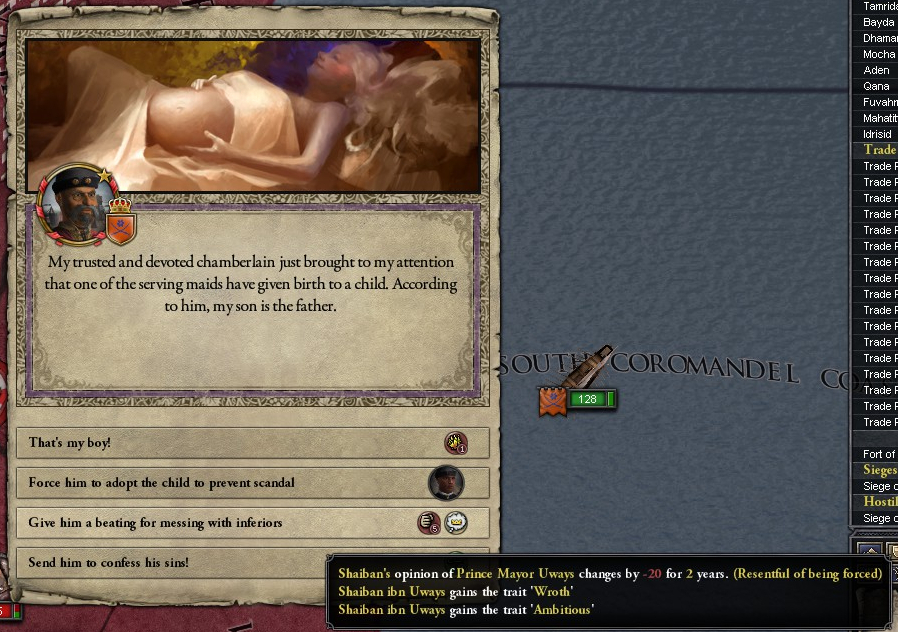  : In Goa, we had met Shaiban, Uways' third son. He had been sent to oversee Goa as punishment for some indiscrediton back home. He would not say what it was, only that his father would come to regret it. : In Goa, we had met Shaiban, Uways' third son. He had been sent to oversee Goa as punishment for some indiscrediton back home. He would not say what it was, only that his father would come to regret it.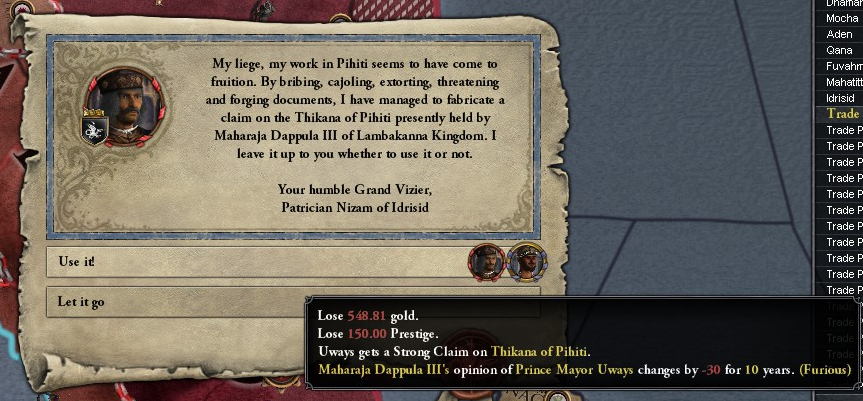  : We also met Nizam again, the Nizamid Pirate Lord. He had returned to the east with another diplomatic mission. : We also met Nizam again, the Nizamid Pirate Lord. He had returned to the east with another diplomatic mission. : It seems the Lankan king had made a similar mistake as the Cedi: he did not grant enough land to Socotra. : It seems the Lankan king had made a similar mistake as the Cedi: he did not grant enough land to Socotra.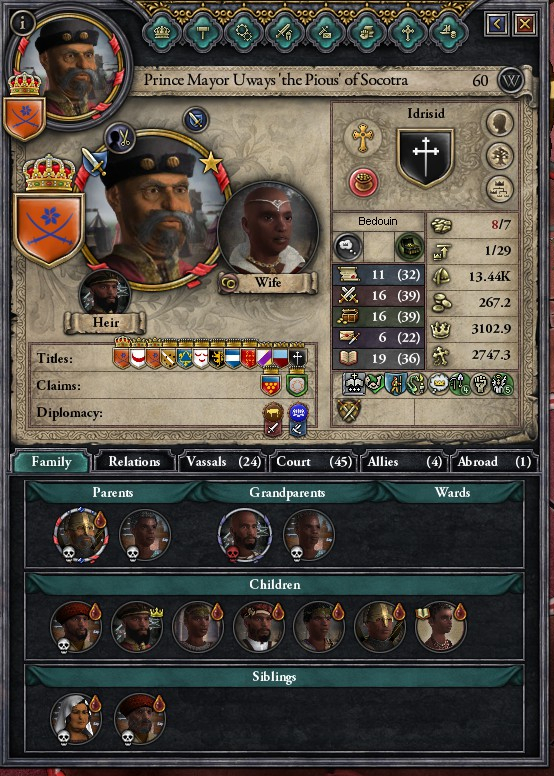  : All this treachery and wrath had clearly shown Uways to be the chosen of the Nester Gods. He was named their champion in this world. : All this treachery and wrath had clearly shown Uways to be the chosen of the Nester Gods. He was named their champion in this world.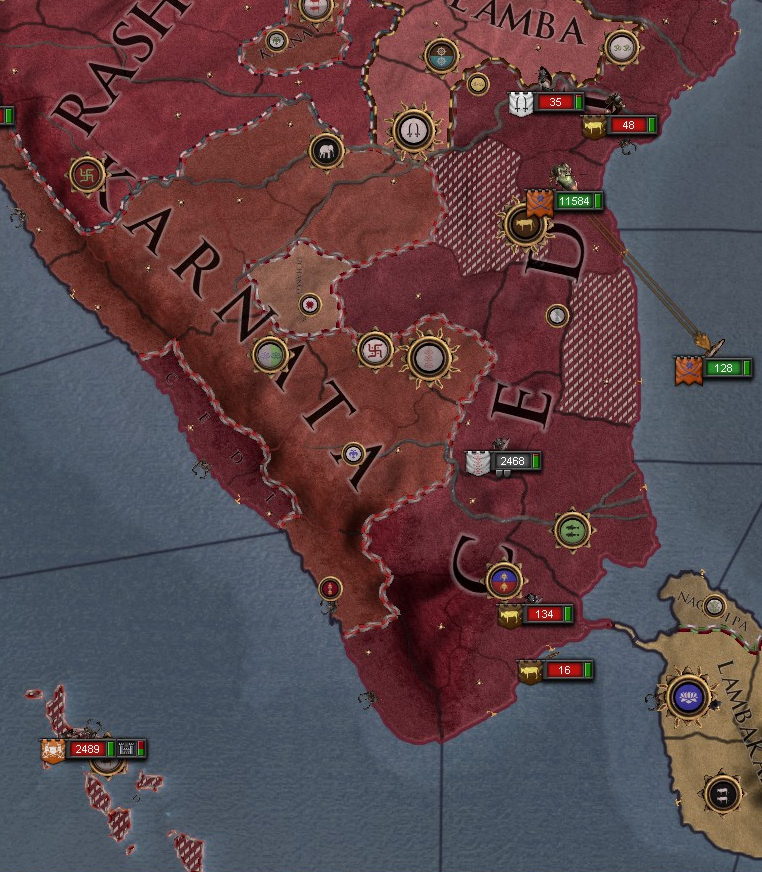  : But even as the marines seiged the Cedi capital, their forces had weathered storms and the summer heat to strike at Maldives again. They had hoped to free the city and open a second front against the Socotrans. : But even as the marines seiged the Cedi capital, their forces had weathered storms and the summer heat to strike at Maldives again. They had hoped to free the city and open a second front against the Socotrans.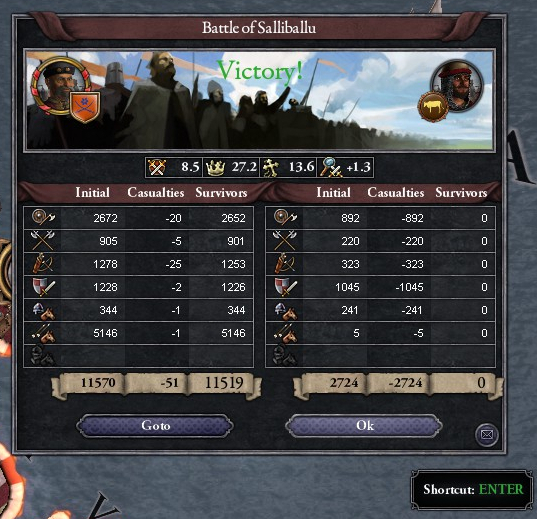  : It did not work. It seems a Nest captain had broken through the Cedi blockade with the news for the Prince. The Nester response was swift and brutal. : It did not work. It seems a Nest captain had broken through the Cedi blockade with the news for the Prince. The Nester response was swift and brutal.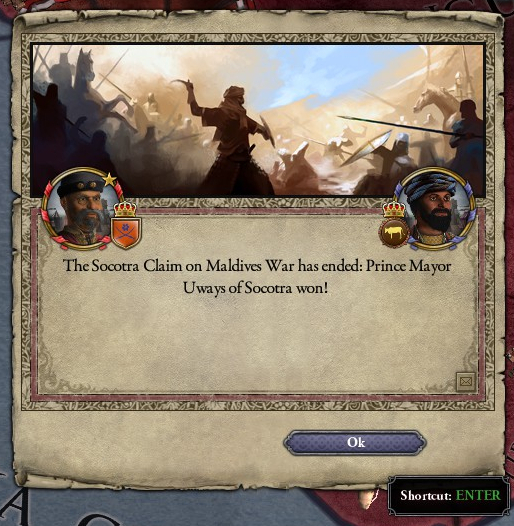  : The Cedi had surrendered. Uways was free to bring his gaze to the Lankans. : The Cedi had surrendered. Uways was free to bring his gaze to the Lankans. : Land! : Land!The Caravaneers stop listening to Amir's story, and look to the bow. On the horizon, the beaches stretch as far as the eyes can see. Amir stops speaking, excited to see land.  : And so, at long last, we come to our destination! Welcome, my good friends, welcome to Hispania! : And so, at long last, we come to our destination! Welcome, my good friends, welcome to Hispania!
|
|
|
|
History Update 15 - To the Shores of Tripoli Last time we took a look at pirates in the Mediterranean from antiquity to the Middle Ages. We also took a look at Asian piracy throughout the ages in very quick bursts because that's as much info as my surface research showed. Today, we're finally gonna have to talk about the British Colonies as we talk about the Barbary Corsairs. 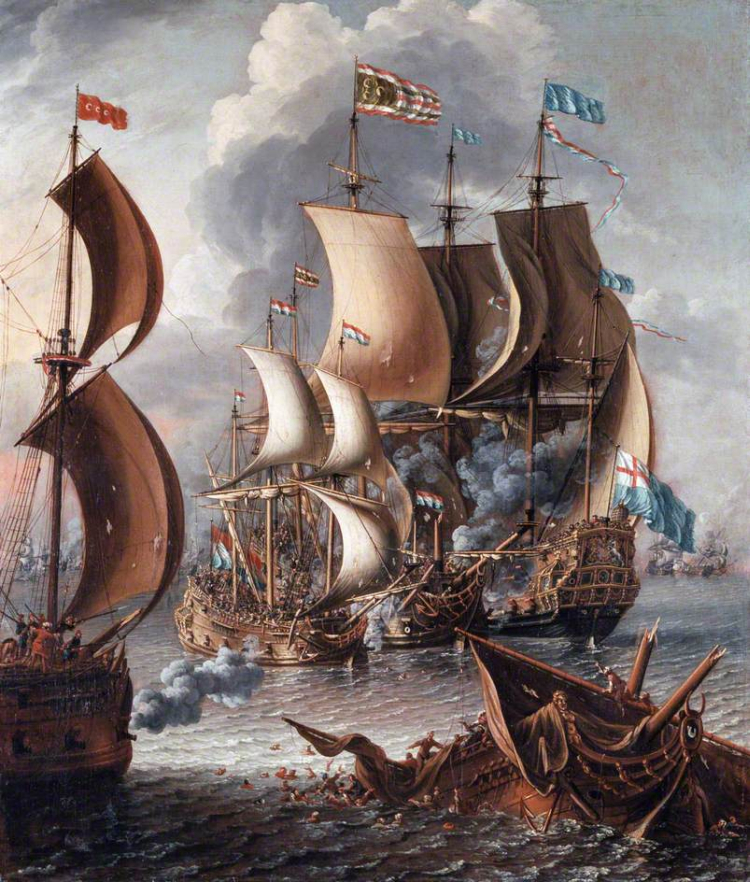 "A Sea Fight with Barbary Corsairs", Laureys a Castro, 1681 So, let's establish some sort of background for the Barbary corsairs, or pirates. The number one aim of the massive amount of coastal raiding the pirates sailing out of Tunis, ALgiers and Tripoli have done was slavery. Like, yeah, the usual "shitloads of local goods" thing was in effect, but the chief cause was loving slaves. Over the three centuries that the pirates have operated, they have captured anywhere from 800,000 to 1.25 million slaves from the coasts of Spain, France and Italy, as well as from the ships that sailed the Mediterranean. That's not such a huge number compared to the amount of African slaves sold in that period (holy poo poo, 12.5 million). Hell, more African slaves died en route to the New World (anywhere from 1.5 to 2 million) than were captured by the Barbary corsairs, but these people were white, so yeah. Anyway, as we've seen in the last update, Muslim raiders in the Mediterranean have been around since at least the 9th century, with peaks in the 13th and 14th century (sack of Rome and all that). However, by the time the Ottoman empire has expanded west, Istanbul (or Konstaniyye or Nea Rome, or... it was complicated, ok) had sent its admirals west to ensure dominion over the Mediterranean. Two of the more famous ones were the Barbarossa brothers, Aruj and Hayreddin. 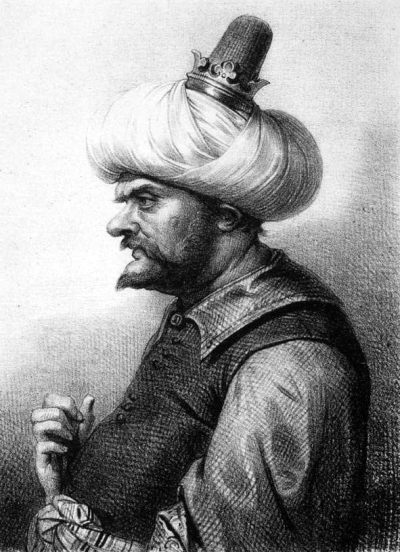 Oruc Barbarossa ("Redbeard") Reis, Ottoman admiral and privateer (1474-1518) Oruc Reis was a Turkish sailor, originally operating in the Eastern Mediterranean around Syria and Egypt. In his career as a sailor, he and his brother Ilyas have traded well, and learned to speak Italian, French, Spanish, Greek and Arabic. They had signed up for the Ottoman navy as privateers to raid Hospitallers in the late 15th century. This did not end well, and Ilyas was killed in a fight against the knights, while Oruc himself was captured outside Tripoli. Upon hearing the news, his brother, Khizr Reis (later named Hayreddin), who had been privateering as well, had broken him out of Bodrum, a fortress in western Turkey. After this little endeavour, Oruc was granted 18 galleys to wreck the Knights' poo poo, which he did very well. After a while, due to betting on the wrong horse in the Osman succession, he went south to Egypt, and was granted more ships by the Mamluk sultan. He moved his gaze a bit further west, towards Italy and other Christian powers. With his success, he was able to move his base of operations to Djerba, off the coast of Tunis in 1503. Khizr joined him then, and sailed a ship under his command. 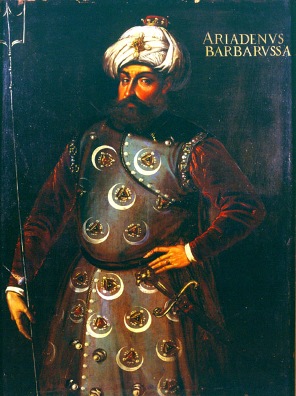 Hayreddin ("Best of Religion") Barbarossa ("Redbeard") Pasha, Ottoman admiral and privateer (1478-1546). His actual name was Khizr The brothers terrorized the western Mediterranean for about a decade. In the process, Oruc lost his left arm, got a bitchin' silver prosthetic, and earned the name Gumus Kol, meaning "Silver Arm". At this point, the brothers' targets included the Italian principalities, Hospitallers, western Arab dynasties and the Spanish. The Spanish took the brunt of it when they rescued the Muslims that remained in Spain after the Reconquista. By 1516 the brothers got so bold as to kick the Spanish out of Algiers, bringing it into the Ottoman Empire. The Spanish tried taking it back, but the brothers repelled the Spanish fleet.  The flag of Hayreddin Barbarossa Unfortunately, as with most pirates, Oruc fell in battle against the Spanish in 1518. Unlike his brother, Khizr repelled the Spanish with the Ottomans' help, and was named the province's Pasha and later, the Baylerbey of all of North Africa. He fought back against further Spanish incursions, acted as a diplomat to France, and was eventually named the Grand Admiral of the Ottoman Navy. He remained a loyal vassal to Suleiman the Magnificent until his death in 1546.  John (or Jack) Ward commanding his ship Jack Ward is a strange figure among the Barbary corsairs. Jack started his career as a privateer, raiding Spanish ships for the British in 1588. In 1603, the newly-crowned James I of England had ended the letters of marquee against the Spanish, and Jack found himself out of work. He worked as a fisherman for a few months before getting pressed into the Royal Navy. He and about twenty others, similarly pressed, deserted, and captured a small barque. His mates elected him captain, and they went on to take a few prizes, culminating in The Gift, a French warship with 32 guns on it. With this ship, he went on to raid merchant vessels. In 1606, he made an agreement with a Tunisian Janissary captain to use Tunis as a port of call in return for giving the captain first dibs on the loot. After plying his trade for a few years, he asked for a royal pardon from king James and promptly was told to go gently caress himself. In return, he converted to Islam, took the name Yusuf Reis, and raided all non-Ottoman ships until his death in 1622. Of the plague. At the age of 70. Crime does pay, kids! 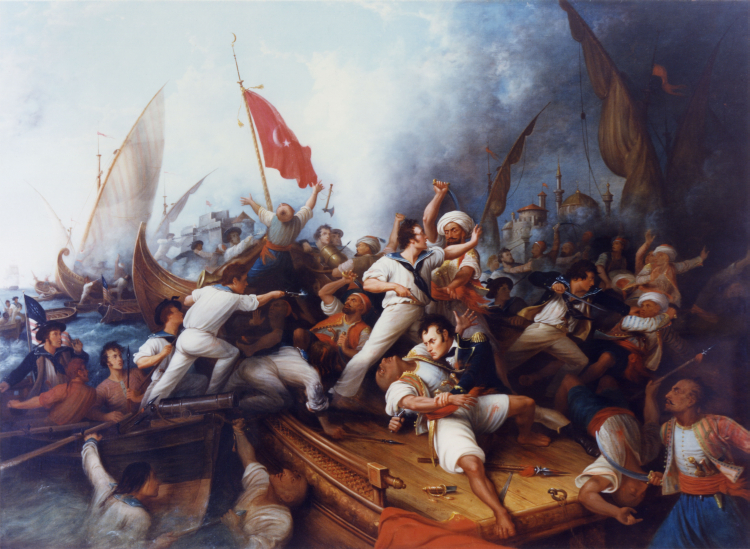 Stephen Decatur, a US Lieutenant, boarding a Tripolitanian gunboat, 1804 Anyway, men like these had plagued the Berber coasts for centuries, forcing Britain, France and Spain to occasionally declare war on them. Of course, each individual western power had secretely sponsored the corsairs against the others, which led to a perfectly stable situation where everyone profited. Eventually, the British got sick of this nonsense, bombarded the poo poo out Tunis, and the Barbary threat was ended forever. Well, for about a century. By the late 18th century, Morocco and Algiers joined in on the fun, and captured tons of ships, including those from a nascent nation: the United States of America. Ironically, Morocco was the first nation to recognize the US as an independent state, and promise peace, before capturing their ships all of six years later. In return, the Americans started a proper navy, failed at securing it against the pirates, and ended up paying 20% of its annual budget in protection money. 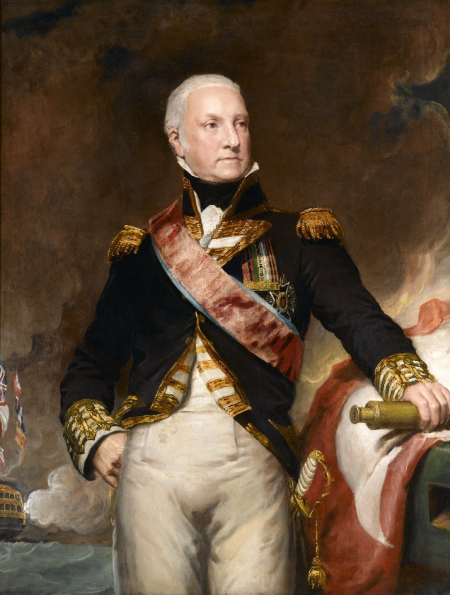 Edward Pellew, 1st Viscount Exmouth, the man that negotiated an end to Barbary piracy Eventually, after the Cogress of Vienna, and the end of the Napoleonic Wars, West Europe finally got its poo poo together, and decided on a concentrated campaign against the Babary states. By 1816, Tripoli, Algiers and Tunis were so heavily bombarded by the British that they had signed a treaty, forcing them to treat any captured CHristians as prisoners of war instead of as slaves. When that did not end piracy, France just straight up conquered the territory. The Barbary states were no longer pirate havens, and piracy dwindled. We'll today's update here. Next time, we'll talk about modern piracy.
|
|
|
|
Iberia? What in the world are the Nester Gods' followers doing in Iberia? I mean sure, wealth and riches, but it is rather far off I'd say.
|
|
|
|
Luhood posted:Iberia? What in the world are the Nester Gods' followers doing in Iberia? I mean sure, wealth and riches, but it is rather far off I'd say. Well, The Caravan has all sorts of followers. Besides, Amir was never a Nestorian. Or a Zunist, really.
|
|
|
|
I just caught this LP, watching this maddened world unfurl is excellent fun. Keep it up!
|
|
|
|
Great LP!
|
|
|
|
Awesome LP!
|
|
|
|
Film Update 15 - Adaptation Honestly, I was going to recommend another pirate movie this time, but I wasn't a fan of recommending such a mediocre movie as the first Soviet film I talked about. So we're going to talk about a film that not at all representative of Soviet cinema throughout... well, ever, really, was pushed against by Goskino, and made no money. It is one of my very favourite films.  Jacket for the original 1977 English run We start with a pretty good book by the Strugatsky brothers: Roadside Picnic. In the book, aliens have briefly landed on Earth, had a party, left their poo poo all over the place and left. The areas where they've landed ended up having strange poo poo happen all over the place: gravity varies by orders of magnitude, animals mutate, and things like infinite batteries lie around. The world's governments lock down these "Zones" pretty quickly, establishing a perimeter around them, and only letting scientist study them. However, since a very lucrative black market forms around buying alien artifacts, many locals trespass into the Zones, and steal poo poo. Or rather, try to, and die in pretty elaborate fashion. We follow one of these assholes, Redrick Schuhart. Red starts out as an escort for a scientist looking for a particular artifact in a Zone in an unnamed Commonwealth country. As usual, poo poo hits the fan, and any avenues for legal work for Red quickly disappear. Nonetheless, Red makes some money, marries his girlfriend, and has a beautiful baby daughter, with short fur all over her body, named Monkey. We then watch Red take on more and more dangerous gigs to try to provide for his family, as the Zone spreads further, destroying any semblance of humanity in people associated with it.  Arkady and Boris Strugatsky, probably the biggest names in Soviet sci-fi It's a good book, one of the Strugatskys' best. I don't know which translations actually work well in English (this one's been getting good reviews, so maybe try that?), so I leave that as an exercise for the reader. But we're not here to talk about books, we're here to talk about film.  Andrei Tarkovsky, phenomenal Soviet director, allegedly a massive pain in the rear end to work with A few years after the book was released, Andrei Tarkovsky got together with the brothers to adapt the book to film. After a prolonged series of arguments about what would and would not work on the screen, the brothers relented and finished a screenplay for him: "'We're lucky enough to work with a genius', we told each other back then, 'This means we should do everything we can to write a screenplay that could possibly satisfy such a genius'" - Boris Strugatsky on Tarkovsky The script was changed several times during the shoot itself, as Tarkovsky, a notorius perfectionist, continued to force tiny details. For example, for a wide shot of a field of grass, he had crew remove all the grass that was the wrong shade of green. By hand. One blade at a time. Took a few days. The shoot in Estonia was so close to a chemical plant that crew members got chemical burns, and Tarkovsky, his 1st AD, and one of his actors all died of cancer, supposedly from the exposure to river. The film was shot onto Kodak film, which ended up getting ruined at the labs back in Moscow, forcing the whole thing to be reshot from scratch. Two of his DOPs quit on him. It was a poo poo show, basically.  Theatrical release poster for Stalker (1979) The film was worth it, though. Admittedly, it came out very different from the book. In Stalker, an unnamed stalker takes a job to show two men a room that grants wishes, deep in the heart of the Zone. Like the book, he has a wife and a daughter named Monkey. They venture through the Zone, avoiding anomalies that may or may not exist, and wax philosophical.  Still from theatrical release of Stalker (1979) It's a slowly-paced film. It's got really long takes: an average shot is held for over a minute. Compare Truffaut's 400 Blows, with 15 seconds a shot, or Spielberg's Jurassic Park at 6 seconds. Those shots are gorgeous, though. You follow those three, as they argue faith, reason and meaning in their search for the wish granting machine. It's a fascinating discussion. Overall, I really like this film. Both as an adaptation, and on it's own. While very little of the literal remains from the the page, the film explores a similar theme: holding on to humanity in a world that rejects it. I'd recommend this film to anyone and everyone. Go watch it. SovFilm edit: You can now watch this movie with English subtitles here. Kayten fucked around with this message at 07:12 on Sep 4, 2016 |
|
|
|

|
| # ? Apr 24, 2024 23:17 |
|
And would you believe that movie was part of the basis for the Stalker series of video games? Probably, considering they're both called Stalker. 
|
|
|















